79+ Medical Research Topics for High School Students In 2024
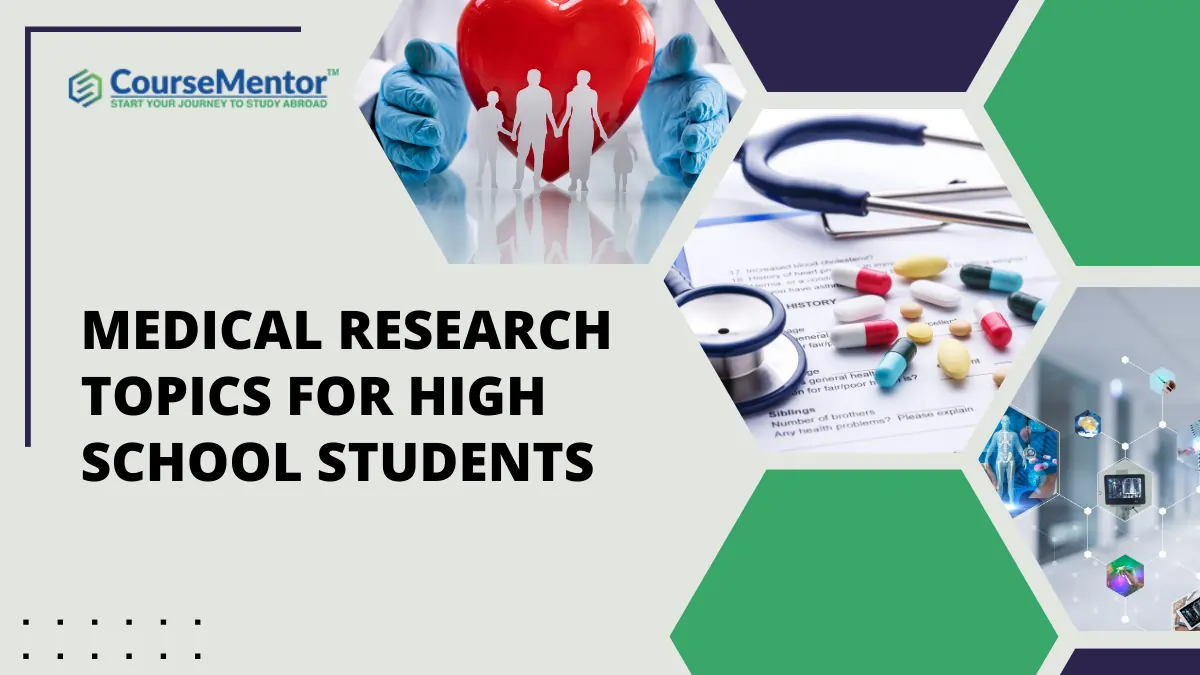
- Post author By Ankit
- February 8, 2024
Medical research is vital for improving healthcare. As diseases change and new health issues arise, the research develops innovative prevention and cures. High school students play a vital role in contributing to study and gaining skills.
Research projects give first-hand experience with the scientific method and spark interest in healthcare careers. The medical discoveries of the future rely on the interest of young scientists. Thus, engaging high schoolers enables valuable contributions and critical thinking.
This blog discusses potential medical research topics for high school students. The options cover health topics needing different time and resources. Thus, research participation benefits students through advancing knowledge, problem-solving, and passion for science.
Table of Contents

Benefits of Medical Research for High School Students
Read the benefits of medical research topics for high school students.
1. Develops Critical Thinking Skills
As we all know, doing medical research helps improve students’ critical thinking. They learn to make ideas, design experiments, survey data, think logically, solve problems, and draw conclusions from evidence.
2. Provides Real-World Experience
Medical research gives hands-on experience outside the classroom. Students work alongside professionals in different medical fields. This exposes them to possible careers.
3. Sparks Interest in STEM
Seeing how science leads to medical treatments gets students excited about STEM. Research can make them want to study STEM majors and pursue STEM careers.
4. Offers Mentorship
Through research, students get mentored by doctors, nurses, and researchers. This advice can impact their academic and career paths.
5. Boosts College and Career Prospects
Research experience impresses colleges and employers. Having their name on published studies further improves prospects for college and jobs.
Now, let’s move on to the great medical research topics for high school students in 2024.
Also Read: 51 Kinesiology Research Topics for College Students [2024]
Medical Research Topics for High School Students
Here are some of the latest medical research topics for high school students.
Infectious diseases
- How does handwashing stop germs from spreading?
- Look at different face mask types to see which ones work best against viruses.
- Studying how the typical cold spreads in schools.
- Seeing how vaccines help prevent infectious diseases.
- Learning about how viruses infect cells.
- Looking at why it’s important to handle food safely to avoid getting sick.
- Examining how different cleaning products kill germs.
Mental health
- Understanding how stress affects school performance.
- Seeing if meditation helps reduce anxiety.
- Studying how social media affects teenagers’ mental health.
- Exploring how exercise can improve mood.
- Looking at how many teenagers have depression and ways to cope.
- Seeing how not getting enough sleep affects mental health.
- Looking at how having friends can help with loneliness.
Chronic illnesses
- Looking at how diet and exercise help manage diabetes.
- Seeing how technology can help manage asthma symptoms.
- Studying how smoking causes lung cancer.
- Learning about the genes that can cause heart disease.
- Seeing how physical therapy helps people with arthritis.
- Exploring how being overweight increases the risk of diabetes.
- Exploring various methods to handle long-lasting pain.
Public health initiatives
- Seeing why it’s vital for communities to get vaccinated.
- Studying how having clean water helps people stay healthy in poor countries.
- Learning how school nutrition programs affect public health.
- Seeing how campaigns to promote exercise can lower obesity rates.
- Exploring how banning smoking can reduce tobacco-related illnesses.
- Looking at how bike lanes and walkways help public health.
- Studying how well public health campaigns raise awareness about HIV/AIDS.
Genetics and hereditary conditions
- Looking at how genetic diseases like cystic fibrosis are passed down.
- Seeing how genetic testing can find inherited diseases.
- Studying how genes affect allergies.
- Knowing about the genes that define eye color.
- Seeing how genes cause sickle cell anemia and how it can be treated.
- Looking at how blood types are inherited.
- Studying how genes affect what foods people like or dislike.
Nutrition and dietetics
- Looking at the health benefits of different fruits and vegetables.
- Seeing how eating fast food affects overall health.
- Studying how portion sizes affect weight gain.
- Learning why balanced meals are essential for energy.
- Seeing how drinking enough water helps with sports.
- Looking at how probiotics help with digestion.
- Studying how food additives affect health and behavior.
Environmental Health
- Studying how air pollution affects breathing.
- Seeing how plastic pollution hurts oceans and people.
- Learning about the health risks of pesticides in farming.
- Seeing how climate change spreads diseases.
- Exploring how parks and green spaces help both physical and mental health.
- Studying how indoor air pollution affects health.
- Looking at how noise pollution affects sleep and health.
Drug abuse and addiction
- Looking at how drugs affect the brain.
- Studying how peer pressure leads to trying drugs.
- Seeing how healthy programs in schools prevent drug use.
- Learning about the genes that make people more likely to get addicted.
- Studying how using drugs for a long time hurts both body and mind.
- Looking at how support groups help people quit drugs.
- Researching other ways to treat opioid addiction, like acupuncture or mindfulness.
Pediatric Health
- Looking at how breastfeeding helps babies stay healthy.
- Studying how much time on screens affects kids’ weight.
- Seeing how preschool programs affect how kids think.
- Learning about how many kids have ADHD and how to help them.
- Studying how vaccines protect kids from diseases.
- Looking at how sleep affects how well kids do in school.
- Seeing how playing outside helps kids stay healthy.
Biomedical engineering
- Learning about making better artificial limbs.
- Seeing how 3D printing helps make medical implants.
- Studying how wearable devices help monitor health.
- Learning about making artificial organs for transplants.
- Seeing how virtual reality helps with medical training and treatment.
- Looking at how tiny technology helps deliver medicine.
- Studying how biosensors help find diseases early.
Epidemiology
- Looking at how diseases spread in schools.
- Studying how tracking contacts helps stop diseases.
- Seeing what affects how many people get vaccinated.
- Learning about how where people live affects how healthy they are.
- Studying how often different groups get chronic diseases.
- Looking at how well quarantine works during big disease outbreaks.
- Seeing how tracking diseases helps prevent them.
Aging and gerontology
- Studying how exercise and food help people stay healthy as they get older.
- Learning about how many older people have trouble thinking and how to help them.
- Seeing how having friends helps older people stay happy.
- Learning about programs that help people take care of older family members.
- Studying how changes in vision and hearing affect older people’s lives.
- Seeing how programs to prevent falls help older people stay safe.
- Learning about how talking about the past helps people with dementia
Why Ethics Matter in Medical Research?
Medical research helps advance knowledge but can sometimes be unethical and harm people. Ethics in medical research protect participants and uphold scientific integrity.
1. Preserving Participant Dignity
Participants should always be treated with respect, not just as data sources. Their privacy and confidentiality should also be saved.
2. Obtaining Informed Consent
Researchers must explain the goal, methods, risks, and benefits to potential participants. People can then pick if they want to participate. It is a good idea not to use coercion.
3. Ensuring Scientific Validity
Studies must be scientifically valid and helpful. Wasting resources and putting people at risk for useless research is unethical.
4. Minimizing Risks
Participants should not face unnecessary harm. Risks should be reasonable compared to benefits. Oversight committees help ensure this standard.
5. Promoting Inclusive Research
Historically, minorities and vulnerable groups were exploited or excluded. Diversity should be ensured and burdens/benefits equitably distributed.
6. Avoiding Conflicts of Interest
Financial motives or personal agendas can distort science. Researchers must disclose and manage any real or perceived conflicts.
Ethics uphold participant dignity, scientific integrity, and public trust. They are crucial for medical progress.
Resources and Support for High School Students On Medical Research
Here are the ways how students can get help with medical research topics.
- School Libraries
Most high schools have libraries that contain books, magazines, newspapers, and online databases. This can help you to get references for your research projects. Seek assistance from librarians in searching out good resources. Your school provides this free resource.
- Public Libraries
There are also many study materials available at community public libraries. Some enable entry into academic journals and databases via partnerships with local institutions of higher learning.
Pick a library card and learn how to browse through catalogs and databases; nevertheless, librarians can assist you.
- Online Databases
Sometimes, your school will provide you access to some of these online databases for research work. These contain millions of articles, journals, newspapers, magazines, and primary sources, which you must learn to search well.
- Academic Journals
When writing research papers or projects, scholarly journals are very resourceful in providing information about the topics. Look for reviewed professional magazines in your area of interest or read summaries online or at the library.
- Talk to Teachers
Teachers will assist you during the research process. They may give suggestions such as topic ideas, where to find resources, and how to conduct research. Fix appointments with them over project discussions.
- Find a Mentor
Professors, graduate students, or professionals can serve as mentors for your study program. As a result, they might shed light on concepts, give recommendations on sources, and offer critique on your paper’s development, among others.
Final Words
Healthcare’s transformation and life-saving ability can be attributed to medical research. Inspiring them to take up research opportunities with open minds is a great idea for young learners starting their education journey.
This will help them find projects in science that may cause major discoveries in the future. If they work hard now, these young scholars might be able to save lives tomorrow through their research efforts.
Despite how difficult it seems, have faith in the students who could be tomorrow’s doctors, working devotedly and rationally on research.
Can high school students work with professionals on medical research projects?
Some high schoolers can partner with doctors or scientists through mentorship or internship programs.
What resources do high school students interested in medical research have?
High schools have online databases, academic journals, and libraries. Additionally, some schools have study clubs and workshops to encourage students’ interests.
What do high school students need to do to make sure their sources for medical research are credible enough?
They should prioritize peer-reviewed articles, reliable websites, and information from educational institutions or federal agencies. They can also approach their teachers or librarians for assistance.
- Tags Medical Research Topics for High School Students
- australia (2)
- duolingo (13)
- Education (280)
- General (75)
- How To (16)
- IELTS (127)
- Latest Updates (162)
- Malta Visa (6)
- Permanent residency (1)
- Programming (31)
- Scholarship (1)
- Sponsored (4)
- Study Abroad (187)
- Technology (12)
- work permit (8)
Recent Posts
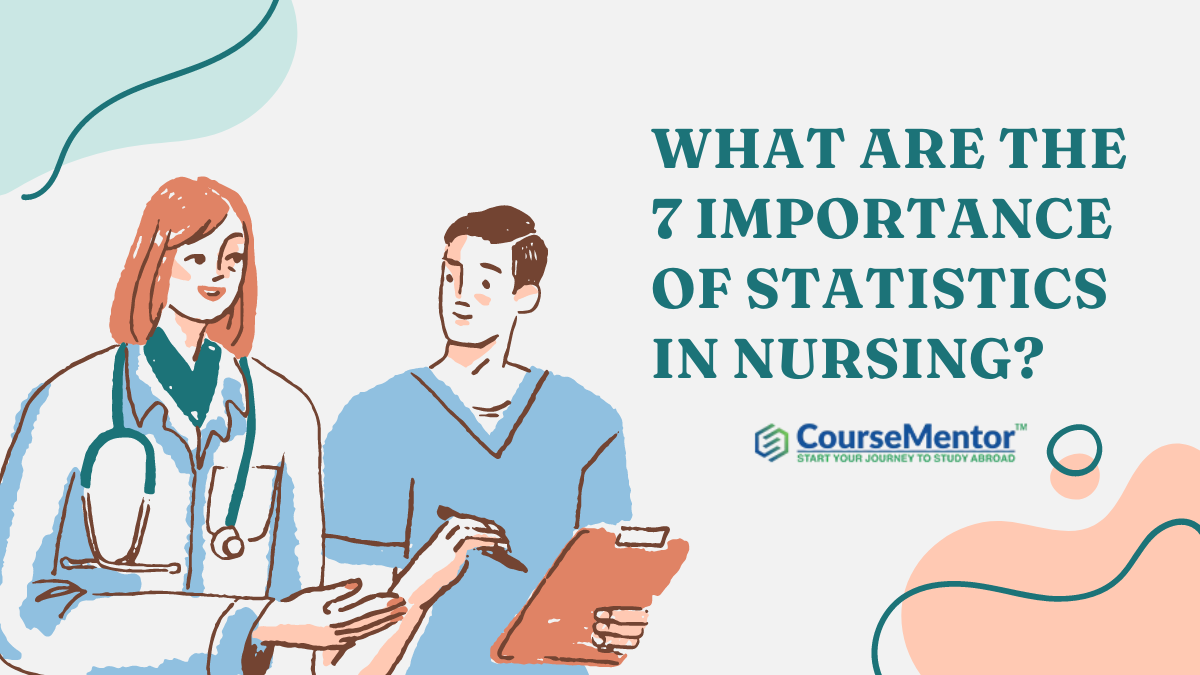
77 interesting medical research topics for 2024
Last updated
25 November 2023
Reviewed by
Brittany Ferri, PhD, OTR/L
Medical research is the gateway to improved patient care and expanding our available treatment options. However, finding a relevant and compelling research topic can be challenging.
Use this article as a jumping-off point to select an interesting medical research topic for your next paper or clinical study.
- How to choose a medical research topic
When choosing a research topic , it’s essential to consider a couple of things. What topics interest you? What unanswered questions do you want to address?
During the decision-making and brainstorming process, here are a few helpful tips to help you pick the right medical research topic:
Focus on a particular field of study
The best medical research is specific to a particular area. Generalized studies are often too broad to produce meaningful results, so we advise picking a specific niche early in the process.
Maybe a certain topic interests you, or your industry knowledge reveals areas of need.
Look into commonly researched topics
Once you’ve chosen your research field, do some preliminary research. What have other academics done in their papers and projects?
From this list, you can focus on specific topics that interest you without accidentally creating a copycat project. This groundwork will also help you uncover any literature gaps—those may be beneficial areas for research.
Get curious and ask questions
Now you can get curious. Ask questions that start with why, how, or what. These questions are the starting point of your project design and will act as your guiding light throughout the process.
For example:
What impact does pollution have on children’s lung function in inner-city neighborhoods?
Why is pollution-based asthma on the rise?
How can we address pollution-induced asthma in young children?
- 77 medical research topics worth exploring in 2023
Need some research inspiration for your upcoming paper or clinical study? We’ve compiled a list of 77 topical and in-demand medical research ideas. Let’s take a look.
- Exciting new medical research topics
If you want to study cutting-edge topics, here are some exciting options:
COVID-19 and long COVID symptoms
Since 2020, COVID-19 has been a hot-button topic in medicine, along with the long-term symptoms in those with a history of COVID-19.
Examples of COVID-19-related research topics worth exploring include:
The long-term impact of COVID-19 on cardiac and respiratory health
COVID-19 vaccination rates
The evolution of COVID-19 symptoms over time
New variants and strains of the COVID-19 virus
Changes in social behavior and public health regulations amid COVID-19
Vaccinations
Finding ways to cure or reduce the disease burden of chronic infectious diseases is a crucial research area. Vaccination is a powerful option and a great topic to research.
Examples of vaccination-related research topics include:
mRNA vaccines for viral infections
Biomaterial vaccination capabilities
Vaccination rates based on location, ethnicity, or age
Public opinion about vaccination safety
Artificial tissues fabrication
With the need for donor organs increasing, finding ways to fabricate artificial bioactive tissues (and possibly organs) is a popular research area.
Examples of artificial tissue-related research topics you can study include:
The viability of artificially printed tissues
Tissue substrate and building block material studies
The ethics and efficacy of artificial tissue creation
- Medical research topics for medical students
For many medical students, research is a big driver for entering healthcare. If you’re a medical student looking for a research topic, here are some great ideas to work from:
Sleep disorders
Poor sleep quality is a growing problem, and it can significantly impact a person’s overall health.
Examples of sleep disorder-related research topics include:
How stress affects sleep quality
The prevalence and impact of insomnia on patients with mental health conditions
Possible triggers for sleep disorder development
The impact of poor sleep quality on psychological and physical health
How melatonin supplements impact sleep quality
Alzheimer’s and dementia
Cognitive conditions like dementia and Alzheimer’s disease are on the rise worldwide. They currently have no cure. As a result, research about these topics is in high demand.
Examples of dementia-related research topics you could explore include:
The prevalence of Alzheimer’s disease in a chosen population
Early onset symptoms of dementia
Possible triggers or causes of cognitive decline with age
Treatment options for dementia-like conditions
The mental and physical burden of caregiving for patients with dementia
- Lifestyle habits and public health
Modern lifestyles have profoundly impacted the average person’s daily habits, and plenty of interesting topics explore its effects.
Examples of lifestyle and public health-related research topics include:
The nutritional intake of college students
The impact of chronic work stress on overall health
The rise of upper back and neck pain from laptop use
Prevalence and cause of repetitive strain injuries (RSI)
- Controversial medical research paper topics
Medical research is a hotbed of controversial topics, content, and areas of study.
If you want to explore a more niche (and attention-grabbing) concept, here are some controversial medical research topics worth looking into:
The benefits and risks of medical cannabis
Depending on where you live, the legalization and use of cannabis for medical conditions is controversial for the general public and healthcare providers.
Examples of medical cannabis-related research topics that might grab your attention include:
The legalization process of medical cannabis
The impact of cannabis use on developmental milestones in youth users
Cannabis and mental health diagnoses
CBD’s impact on chronic pain
Prevalence of cannabis use in young people
The impact of maternal cannabis use on fetal development
Understanding how THC impacts cognitive function
Human genetics
The Human Genome Project identified, mapped, and sequenced all human DNA genes. Its completion in 2003 opened up a world of exciting and controversial studies in human genetics.
Examples of human genetics-related research topics worth delving into include:
Medical genetics and the incidence of genetic-based health disorders
Behavioral genetics differences between identical twins
Genetic risk factors for neurodegenerative disorders
Machine learning technologies for genetic research
Sexual health studies
Human sexuality and sexual health are important (yet often stigmatized) medical topics that need new research and analysis.
As a diverse field ranging from sexual orientation studies to sexual pathophysiology, examples of sexual health-related research topics include:
The incidence of sexually transmitted infections within a chosen population
Mental health conditions within the LGBTQIA+ community
The impact of untreated sexually transmitted infections
Access to safe sex resources (condoms, dental dams, etc.) in rural areas
- Health and wellness research topics
Human wellness and health are trendy topics in modern medicine as more people are interested in finding natural ways to live healthier lifestyles.
If this field of study interests you, here are some big topics in the wellness space:
Gluten sensitivity
Gluten allergies and intolerances have risen over the past few decades. If you’re interested in exploring this topic, your options range in severity from mild gastrointestinal symptoms to full-blown anaphylaxis.
Some examples of gluten sensitivity-related research topics include:
The pathophysiology and incidence of Celiac disease
Early onset symptoms of gluten intolerance
The prevalence of gluten allergies within a set population
Gluten allergies and the incidence of other gastrointestinal health conditions
Pollution and lung health
Living in large urban cities means regular exposure to high levels of pollutants.
As more people become interested in protecting their lung health, examples of impactful lung health and pollution-related research topics include:
The extent of pollution in densely packed urban areas
The prevalence of pollution-based asthma in a set population
Lung capacity and function in young people
The benefits and risks of steroid therapy for asthma
Pollution risks based on geographical location
Plant-based diets
Plant-based diets like vegan and paleo diets are emerging trends in healthcare due to their limited supporting research.
If you’re interested in learning more about the potential benefits or risks of holistic, diet-based medicine, examples of plant-based diet research topics to explore include:
Vegan and plant-based diets as part of disease management
Potential risks and benefits of specific plant-based diets
Plant-based diets and their impact on body mass index
The effect of diet and lifestyle on chronic disease management
Health supplements
Supplements are a multi-billion dollar industry. Many health-conscious people take supplements, including vitamins, minerals, herbal medicine, and more.
Examples of health supplement-related research topics worth investigating include:
Omega-3 fish oil safety and efficacy for cardiac patients
The benefits and risks of regular vitamin D supplementation
Health supplementation regulation and product quality
The impact of social influencer marketing on consumer supplement practices
Analyzing added ingredients in protein powders
- Healthcare research topics
Working within the healthcare industry means you have insider knowledge and opportunity. Maybe you’d like to research the overall system, administration, and inherent biases that disrupt access to quality care.
While these topics are essential to explore, it is important to note that these studies usually require approval and oversight from an Institutional Review Board (IRB). This ensures the study is ethical and does not harm any subjects.
For this reason, the IRB sets protocols that require additional planning, so consider this when mapping out your study’s timeline.
Here are some examples of trending healthcare research areas worth pursuing:
The pros and cons of electronic health records
The rise of electronic healthcare charting and records has forever changed how medical professionals and patients interact with their health data.
Examples of electronic health record-related research topics include:
The number of medication errors reported during a software switch
Nurse sentiment analysis of electronic charting practices
Ethical and legal studies into encrypting and storing personal health data
Inequities within healthcare access
Many barriers inhibit people from accessing the quality medical care they need. These issues result in health disparities and injustices.
Examples of research topics about health inequities include:
The impact of social determinants of health in a set population
Early and late-stage cancer stage diagnosis in urban vs. rural populations
Affordability of life-saving medications
Health insurance limitations and their impact on overall health
Diagnostic and treatment rates across ethnicities
People who belong to an ethnic minority are more likely to experience barriers and restrictions when trying to receive quality medical care. This is due to systemic healthcare racism and bias.
As a result, diagnostic and treatment rates in minority populations are a hot-button field of research. Examples of ethnicity-based research topics include:
Cancer biopsy rates in BIPOC women
The prevalence of diabetes in Indigenous communities
Access inequalities in women’s health preventative screenings
The prevalence of undiagnosed hypertension in Black populations
- Pharmaceutical research topics
Large pharmaceutical companies are incredibly interested in investing in research to learn more about potential cures and treatments for diseases.
If you’re interested in building a career in pharmaceutical research, here are a few examples of in-demand research topics:
Cancer treatment options
Clinical research is in high demand as pharmaceutical companies explore novel cancer treatment options outside of chemotherapy and radiation.
Examples of cancer treatment-related research topics include:
Stem cell therapy for cancer
Oncogenic gene dysregulation and its impact on disease
Cancer-causing viral agents and their risks
Treatment efficacy based on early vs. late-stage cancer diagnosis
Cancer vaccines and targeted therapies
Immunotherapy for cancer
Pain medication alternatives
Historically, opioid medications were the primary treatment for short- and long-term pain. But, with the opioid epidemic getting worse, the need for alternative pain medications has never been more urgent.
Examples of pain medication-related research topics include:
Opioid withdrawal symptoms and risks
Early signs of pain medication misuse
Anti-inflammatory medications for pain control
- Identify trends in your medical research with Dovetail
Are you interested in contributing life-changing research? Today’s medical research is part of the future of clinical patient care.
As your go-to resource for speedy and accurate data analysis , we are proud to partner with healthcare researchers to innovate and improve the future of healthcare.
Should you be using a customer insights hub?
Do you want to discover previous research faster?
Do you share your research findings with others?
Do you analyze research data?
Start for free today, add your research, and get to key insights faster
Editor’s picks
Last updated: 13 April 2023
Last updated: 14 February 2024
Last updated: 27 January 2024
Last updated: 18 April 2023
Last updated: 8 February 2023
Last updated: 23 January 2024
Last updated: 30 January 2024
Last updated: 7 February 2023
Last updated: 7 March 2023
Last updated: 18 May 2023
Last updated: 13 May 2024
Latest articles
Related topics, .css-je19u9{-webkit-align-items:flex-end;-webkit-box-align:flex-end;-ms-flex-align:flex-end;align-items:flex-end;display:-webkit-box;display:-webkit-flex;display:-ms-flexbox;display:flex;-webkit-flex-direction:row;-ms-flex-direction:row;flex-direction:row;-webkit-box-flex-wrap:wrap;-webkit-flex-wrap:wrap;-ms-flex-wrap:wrap;flex-wrap:wrap;-webkit-box-pack:center;-ms-flex-pack:center;-webkit-justify-content:center;justify-content:center;row-gap:0;text-align:center;max-width:671px;}@media (max-width: 1079px){.css-je19u9{max-width:400px;}.css-je19u9>span{white-space:pre;}}@media (max-width: 799px){.css-je19u9{max-width:400px;}.css-je19u9>span{white-space:pre;}} decide what to .css-1kiodld{max-height:56px;display:-webkit-box;display:-webkit-flex;display:-ms-flexbox;display:flex;-webkit-align-items:center;-webkit-box-align:center;-ms-flex-align:center;align-items:center;}@media (max-width: 1079px){.css-1kiodld{display:none;}} build next, decide what to build next.

Users report unexpectedly high data usage, especially during streaming sessions.

Users find it hard to navigate from the home page to relevant playlists in the app.

It would be great to have a sleep timer feature, especially for bedtime listening.

I need better filters to find the songs or artists I’m looking for.
Log in or sign up
Get started for free
- Research Paper Guides
- Research Paper Topics
- 300+ Medical Research Topics & Ideas for Students to Choose
- Speech Topics
- Basics of Essay Writing
- Essay Topics
- Other Essays
- Main Academic Essays
- Basics of Research Paper Writing
- Miscellaneous
- Chicago/ Turabian
- Data & Statistics
- Methodology
- Admission Writing Tips
- Admission Advice
- Other Guides
- Student Life
- Studying Tips
- Understanding Plagiarism
- Academic Writing Tips
- Basics of Dissertation & Thesis Writing
- Essay Guides
- Formatting Guides
- Basics of Research Process
- Admission Guides
- Dissertation & Thesis Guides
300+ Medical Research Topics & Ideas for Students to Choose

Table of contents
Use our free Readability checker
Every healthcare research begins with a single step. But in the world of academia, that step often involves hours of pondering over the perfect medical research topic idea. When it comes to medical research paper topics, there's a seemingly limitless array of options that stretches as far as the mind can wander. The potential of this field is exciting but can also be challenging to explore.
To help you narrow down your choices and research effectively, our research paper writer team compiled a list of interesting medical research topics. Whether you want to write about the latest developments in public health or explore the implications of emerging technologies, this blog won't disappoint you.
What Are Medical Research Paper Topics?
Medical research topics are the ideas or concepts related to health and medicine. They often explore new treatments, developments in diagnosis, prevention of illnesses, or even the effects of lifestyle choices. The scope of topics in medicine is vast and can include such aspects:
- Clinical medicine
- Biomedical research
- Public health
- Mental health research topics
- Medical technology
- Health services research.
Your choice should stem from your interests and existing gaps that need to be filled.
Characteristics of Good Medical Research Topics
Choosing the right medical topic for a research paper is like finding a golden ticket to a successful study. Here's what makes a medicine research idea a real showstopper:
- Engagement Research should be engaging and relevant to the audience.
- Precision Good ideas are always specific, so that you can focus your research on a particular area without being too vague.
- Authenticity A good topic needs to address an issue that hasn't been studied before.
- Feasibility Ensure your topic is realistic. Good research topics in healthcare should fit within your budget, timeframe, and available resources.
- Relevance Winning medical research project topics should address current and pressing issues in healthcare.
How to Choose a Medical Research Topic?
Selecting the best idea out of multiple medicine research topics can be a daunting task, especially when you have so many fields to explore. Here are a few steps that will help you settle on a theme:
- Brainstorm and come up with as many ideas as possible.
- Narrow down your list by considering factors such as your interest and resources.
- Look for current tendencies in healthcare research.
- Consult your supervisor or a librarian to verify the pertinence of the topic that you have chosen.
- Make sure your topic is specific enough to be addressed within the scope of your project.
Once you come up with a fitting medical research topic, consider half the battle won. But in case you have difficulties creating an original title, our online paper writers prepared a list of research ideas for medical students you might like.
List of Top Medical Research Topics
Below we collected various medical topics to research in your study. From groundbreaking technologies to emerging diseases, there are countless avenues to investigate. If you're on the hunt for a compelling topic, here are some of the top medical researches topics capturing attention in 2023:
- Effective strategies for medical talent acquisition and retention.
- The best methods for enhancing preventative care measures in contemporary medicine.
- The role and impact of telemedicine in reinventing healthcare management.
- Implications of artificial intelligence on diagnostics and treatment plans.
- The rising threat of antimicrobial resistance and its effects on global health.
- The link between environmental changes and public health outcomes.
- Complexities of vaccine development and human immune responses.
- Health inequities: Causes, consequences, and potential solutions.
- New treatment approaches for neurodegenerative disorders.
- A multidisciplinary approach to tackling obesity and metabolic disorders.
Good Medical Research Topics
Navigating countless medical topics for research papers can often feel like a journey through a labyrinth. Here are some intriguing ideas that could ignite your curiosity and fuel your research:
- How does climate change impact human health?
- Communication disorders: A closer look at deafness.
- The hidden dangers of household air pollution.
- The escalating threat of diabetes in the public sphere.
- Coronavirus and how it changed the landscape of public health.
- Assessing oral health: Beyond the basics.
- Tobacco and alcohol control: A public health perspective.
- Health implications of a sedentary lifestyle.
- Urban pollution and its impact on respiratory diseases
- The role of healthy diets in disease prevention.
- Exploring the mental health impact of social media.
- How do cultural factors influence public health initiatives?
- The role of nutrition in managing chronic diseases.
- Investigating the genetics of neurodegenerative disorders.
- What are some ethical considerations in gene editing?
Interesting Medical Research Topics
Exploring the depths of medicine can be an exciting experience. You'll discover that every issue has a plethora of complexities and avenues to investigate. Here are some interesting medical topics for research paper that could pique your curiosity:
- The influence of lifestyle changes on cardiovascular health.
- What are some psychological impacts of chronic illness?
- Connection between gut health and mental well-being.
- Evaluating the effectiveness of telehealth during the pandemic.
- How do genetic factors influence addiction susceptibility?
- Autoimmune diseases and their peculiarities.
- How does stress affect immune function?
- What are some health impacts of sleep disorders?
- The link between socioeconomic status and health outcomes.
- Exploring innovations in pain management.
- Analyzing implications of artificial intelligence in healthcare.
- Effect of climate change on infectious disease patterns.
- A look into advancements in cancer immunotherapy.
- Exploring the potential of stem cells in treating degenerative diseases.
- How does diet influence the progression of Alzheimer's disease?
Easy Medical Research Topics
You may be looking for simple research topics in medicine that won't take too much time and effort to complete. Explore these straightforward ideas that could make your paper stand out:
- Importance of proper sanitation in healthcare settings.
- Exploring the role of patient support groups in disease management.
- Analyzing the efficacy of physical therapy interventions.
- What are the cost-effective interventions for healthcare delivery?
- What are some effects of new pharmaceuticals?
- What are some health consequences of air pollution?
- How does meditation improve outcomes in mental health care?
- Evaluating the role of nutritionists in weight loss management.
- An analysis of trends and patterns in emerging diseases.
- Exploring alternative medicines in contemporary healthcare.
- Examining the impact of healthcare policies on public health outcomes.
- Can the use of herbs provide an effective remedy for certain illnesses?
- How does mental health stigma affect access to treatment?
- Drug abuse: Causes, consequences and prevention strategies.
- What are some psychological issues associated with chronic illnesses?
Best Medical Research Topics
When it comes to choosing medical research topics, you need something that's striking and meaningful. Hover over these ideas to spot the fitting idea for your medical research:
- Exploring new strategies for treating neurological disorders.
- What is the role of medical ethics in modern healthcare?
- What are some implications of genetics in personalized healthcare?
- Exploring innovations in non-invasive diagnosis techniques.
- Effect of temperature on patient outcomes in critical care.
- How does air pollution influence healthcare costs?
- How do changes in lifestyle lead to better health outcomes?
- Implications of electronic health records for patient privacy.
- Role of nutritionists in disease prevention.
- How technology is being used to revolutionize healthcare?
- What are the most effective treatments for rare diseases?
- How have medical imaging techniques advanced over the years?
- Investigating potential treatments for autism spectrum disorder.
- Exploring innovative approaches to mental healthcare delivery.
- What are some implications of artificial intelligence in medical diagnosis?
Controversial Medical Topics for a Research Paper
Navigate through the most contentious research topics in health and explore the debate that surrounds them. Consider these thought-provoking ideas and medical controversial topics:
- Ethical implications of genetic engineering.
- Euthanasia and physician-assisted suicide - where do we draw the line?
- Are mandatory vaccinations an infringement on personal freedom or a public health necessity?
- Evaluating medical and legal perspectives on the use of medical marijuana.
- Ethical concerns around animal testing in medical research.
- How do we navigate the morality and legality of abortion?
- Should the criminal justice system focus more on mental health treatment than punishment?
- Is stem cell research a moral dilemma or a medical breakthrough?
- Ethical considerations in organ trading and transplantation.
- Who should shoulder the burden of healthcare costs?
- Is access to healthcare a privilege or a human right?
- Ethics of using placebo in clinical trials – is it justified?
- Assessing the role of Big Pharma in healthcare - is it a necessary evil?
- Can genetic screening lead to discrimination, despite its benefits?
- Should modern medicine take precedence over traditional medicine, or is there room for both?
New Medical Research Topics
Discover the latest studies in healthcare and explore the newest topics for a medical research paper. Below we prepared some cutting-edge topics for you to consider:
- Can gene-editing technologies such as CRISPR transform the treatment of genetic disorders?
- How does microbiome therapy potentially influence the treatment of autoimmune diseases?
- Exploring the advent of personalized medicine through genomics and precision diagnostics.
- How is virtual reality altering the landscape of surgical training and rehabilitation therapies?
- How can telehealth improve healthcare access, particularly in remote and underserved areas?
- The role of nanotechnology in developing more efficient drug delivery systems.
- What are some implications of the rising antimicrobial resistance, and where does the future of antibiotics lie?
- How are advances in non-invasive treatments changing the face of chronic disease management?
- Is precision oncology the future of cancer treatment?
- What are some implications and potential of regenerative medicine and tissue engineering?
- Can advancements in wearable technology revolutionize personal health monitoring?
- How are gut microbiota affecting our understanding and treatment of metabolic disorders?
- What role do nanobots play in medical treatments?
- Can big data analytics be used to improve the accuracy of medical diagnosis?
Medical Research Topics Ideas for Students
There are multiple medical topics to write about. But as a student, you're probably looking for something more specific. For your convenience, we divided the titles by academic levels. So, roll up your sleeves and get ready to explore these health topics for research that your professor will surely appreciate.
Medical Research Topics for High School
For students who want to investigate different aspect of healthcare, we provided these examples of ideas. Browse through these medical research topics for high school students to spot the most relevant theme:
- How does the human immune system work?
- Vaccinations as an essential tool in preventing diseases.
- A basic overview of genetic disorders.
- What makes viruses unique?
- How does the body fight off bacterial infections?
- The impact of lifestyle factors on heart health.
- Diabetes: Types, causes, and prevention strategies.
- The importance of mental health in the medical field.
- Skin health: Understanding common skin conditions like acne and eczema.
- Structure and function of the human heart.
- Role of antibiotics and how do they fight bacteria?
- Journey of a pill: From ingestion to action.
- What happens in an allergic reaction?
- How does physical exercise impact the body and mind?
- Racial disparities in healthcare and access to treatment.
Medical Research Topics for College Students
At the college level, you may be asked to write a research paper on a complex issue. We prepared these health research topics for college students to help you get started on your assignment:
- Exploring the implications of health insurance reform.
- Genomic sequencing in the early detection of genetic disorders.
- Machine learning in diagnostic imaging: A new era in radiology?
- The role of diet in the prevention and management of type 2 diabetes.
- Exploring the link between circadian rhythms and health disorders.
- The role of personalized medicine in cancer treatment.
- Development and use of prosthetics in physical rehabilitation.
- Understanding autoimmune diseases: The body fighting itself.
- Addressing health disparities through community-based interventions.
- Inflammation in the development of chronic diseases.
- The rise of antibiotic-resistant bacteria: Causes and implications.
- Innovations in drug delivery systems: From nanoparticles to smart pills.
- How can we address the opioid crisis in America?
- Investigating the use of mobile technology for delivering healthcare services.
- Exploring medical implications of 3D printing technology.
Medical Research Topics by Subjects
We've also provided some research topics for medical students grouped by specific subjects. Check them out and pick the one you find most captivating.
Medical Research Topics in Pediatrics
Pediatrics involves the care and health of children. As such, it is a broad field ripe with interesting medical topics. Given the unique physiology needs of these younger populations, pediatric research is crucial for understanding illnesses. Below you can find captivating research topics in pediatrics:
- Exploring the impact of nutrition on childhood development.
- Assessing the effects of screen time on adolescent mental health.
- Investigating genetic factors in pediatric cancers.
- The role of vaccinations in preventing common childhood illnesses.
- Strategies for managing childhood obesity.
- The impact of prenatal exposure to drugs and alcohol on infant health.
- Development and evaluation of therapies for Autism Spectrum Disorders.
- Understanding the rise of food allergies in children.
- Advances in the treatment of congenital heart defects.
- Exploring the causes and treatment strategies for pediatric asthma.
- The impact of environmental toxins on child health.
- Evaluation of therapeutic approaches for Attention Deficit Hyperactivity Disorder (ADHD).
- Implications of early life stress on mental health in adolescence.
- The role of gut microbiota in pediatric diseases.
- Understanding the genetic basis of rare childhood disorders.
Medical Research Topics on Anatomy
Anatomy is the study of the organization and structure of the body. It encompasses many topics for medical research papers, from bones and organs to cell structures. Consider these ideas when writing your next anatomy paper:
- The role of genetics in bone fragility disorders.
- A comparative study of the skeletal systems across different species.
- The role and function of the lymphatic system in human health.
- Investigating complexities of the human brain's structure.
- Development and growth of human muscles.
- Impact of aging on bone health and structure.
- Exploring the intricate workings of the human cardiovascular system.
- Understanding structural changes in lungs in chronic respiratory diseases.
- The anatomical basis of speech and language development.
- Neuroanatomy of pain: Understanding pain pathways and mechanisms.
- Structural adaptations of the human body for athletic performance.
- Anatomy of the human eye and its role in vision.
- How does connective tissue support body structures?
- How does endocrine system impact hormone production?
- How does female anatomy change during pregnancy?
Medical Anthropology Research Topics
Medical anthropology looks at health and illness from a cultural perspective. It draws on expertise from across disciplines such as biology, psychology, and sociology to better understand how medical systems can work within different communities. If you’re interested in this field, use these ideas for med research topics:
- Investigating cultural beliefs and practices surrounding childbirth.
- Impact of socioeconomic status on health outcomes in different cultures.
- Understanding the role of traditional medicine in modern healthcare systems.
- An exploration of how cultural beliefs influence mental health perceptions.
- Effect of migration on health outcomes.
- The role of diet and nutrition in health from a cultural perspective.
- Cultural competence in healthcare delivery: Challenges and opportunities.
- Intersection of gender, culture, and health.
- Impact of societal norms and values on disease prevalence.
- Health disparities among indigenous populations.
- Role of social support networks in health and wellness across cultures.
- The impact of stigma on health outcomes in HIV/AIDS patients.
- The role of cultural anthropology in global health interventions.
- Ethnobotany and its implications for drug discovery.
- Understanding health practices in post-conflict societies.
Medicine Research Topics on Physiology
Physiology studies how living organisms function. This branch covers a range of medicine topics and ideas you might like. Here are some suggestions for your next med paper in physiology:
- How does nervous system contribute to the perception of pain?
- What physiological changes are triggered by acute and chronic stress?
- How does regular exercise influence cardiovascular health and overall well-being?
- How do hormones influence our metabolic rate and energy utilization?
- A detailed study on physiological transformations during pregnancy and lactation.
- How does the process of aging affect the function and resilience of various organs?
- Exploring the role of homeostasis in maintaining the body's internal balance.
- What are the key physiological processes involved in the sleep cycle?
- Unraveling complexities of the human digestive system from ingestion to excretion.
- How does the renal system contribute to maintaining blood pressure?
- Physiological adaptations humans undergo when living at high altitudes.
- How does dehydration disrupt normal bodily functions?
- Implications of obesity on respiratory function and efficiency.
- How does the endocrine system orchestrate growth and development?
- Investigating the neurophysiological underpinnings of memory formation and retrieval.
Medical Research Topics on Dermatology
From understanding skin conditions to exploring new procedures, dermatological research is a crucial part of improving skin health. Look through these medical research ideas centered around dermatology:
- Investigating the causes and treatments of acne in adolescents.
- Diet and the development of psoriasis.
- Understanding genetic factors involved in atopic dermatitis.
- Skin cancer: Risk factors, prevention, and treatment strategies.
- How do environmental factors cause skin aging?
- Exploring new treatments for hair loss.
- Understanding the correlation between stress and skin conditions.
- The role of the microbiome in skin health and disease.
- New approaches in the treatment of vitiligo.
- The impact of UV radiation on skin health.
- Exploring the pathophysiology of rosacea.
- The role of telemedicine in dermatology.
- Clinical advancements in the treatment of fungal skin infections.
- The correlation between skin health and mental health.
- Advances in cosmetic dermatology: Safety and effectiveness of new procedures.
Medical Research Paper Topics on Nursing
Nursing is a versatile profession that covers many areas of health care. It’s also an ever-changing field, with new research and advancements being released all the time. Here are some topics for medical research paper focusing on nursing:
- The impact of nurse-patient communication on patient outcomes.
- Exploring the effects of nurse fatigue on job performance.
- How does nurse practitioner autonomy influence patient care?
- Importance of bedside manner in nursing.
- The role of technology in nursing practice.
- Understanding challenges associated with ethical decision-making in nursing.
- How does nurse burnout affect patient safety?
- Analyzing factors contributing to nurse retention and turnover rates.
- The effects of staffing ratios on nurse and patient satisfaction.
- Exploring the role of leadership in nursing practice.
- What are implications of nurse workload on healthcare outcomes?
- The impact of health policy on nursing education and practice.
- Ethical dilemmas faced by nurses in end-of-life care.
- How does culture affect perceptions of healthcare and nursing.
- What are some effects of managed care on nurse autonomy?
>> Read more: Nursing Research Paper Topics
Medical Research Topics on Primary Care
Primary care is the first point of contact between patients and medical professionals. This branch is often overlooked, but it’s an important area of research that can improve health outcomes in communities around the world. Check out these interesting health topics to discuss in primary care:
- Exploring the impact of primary care physician shortages on health outcomes.
- How do socio-economic factors influence health outcomes in primary care?
- Strategies to improve patient adherence to treatment.
- What are some challenges and opportunities of providing mental health services?
- The role of primary care in managing chronic diseases.
- Evaluating the effectiveness of preventive measures in primary care.
- How does patient education influence health outcomes in primary care?
- The role of health technology in improving primary care delivery.
- What are some best practices for managing multimorbidity in primary care?
- Developing effective communication strategies for diverse patient populations in primary care.
- The impact of health policy changes on care delivery.
- How can primary care practices be adapted to meet the needs of an aging population?
- Assessing the effectiveness of integrated care models.
- The role of primary care in addressing health disparities.
- Strategies for improving patient satisfaction in primary care.
Medical Research Topics on Public Health
Public health is an important area of research - understanding how to improve health in communities and prevent illness and injury are crucial skills for medical professionals. Here are some medical related research topics that could kick-start your next project:
- What are the causes, implications and solutions to food insecurity?
- The role of public health in the management of infectious diseases.
- Assessing the effectiveness of smoking cessation programs.
- The role of public health initiatives in combating the obesity epidemic.
- What are some policy interventions that can improve public health?
- The impact of racism and discrimination on public health outcomes.
- Exploring new models for delivering mental health services in underserved communities.
- The impact of urbanization on public health outcomes.
- Evaluating the effectiveness of school-based health education programs.
- Strategies for managing public health crises during natural disasters.
- The implications of antibiotic resistance for public health.
- How can community engagement improve public health initiatives?
- The role of public health in the prevention and control of zoonotic diseases.
- What are the effects of environmental toxins on human health?
- How can mutual efforts reduce maternal and infant mortality rates?
>> View more: Public Health Research Topics
Medical Research Topics on Mental Health
Mental health is an important area of research, as it affects so many people around the world. Here are some medical research paper ideas to get you started on your next mental health project:
- The effectiveness of cognitive-behavioral therapy in treating anxiety disorders.
- How does social media influence adolescents' mental health?
- Exploring the link between gut health and wellbeing.
- The role of mindfulness in managing stress and enhancing mental well-being.
- Understanding the genetic factors in schizophrenia.
- How can stigma associated with mental illness be reduced in society?
- How do traumatic events influence mental health?
- Potential art therapy application in emotional health treatment.
- The role of mental health in managing chronic diseases.
- The impact of the COVID-19 pandemic on global mental health.
- Understanding the correlation between sleep deprivation and emotional wellbeing.
- Strategies for improving mental health services in rural areas.
- How can nutrition benefit mental health?
- Exploring the effectiveness of peer support in mental health recovery.
- The benefits and challenges of telepsychiatry.
>> View more: Mental Health Research Paper Topics
Medical Ethics Research Topics
Medical ethics is an important direction in healthcare research. Check these fascinating health topics to research for your next paper:
- Exploring moral implications of assisted suicide.
- How do ethical considerations come into play during organ transplantation?
- The ethical conundrum of maintaining patient confidentiality in the digital age.
- The integral role of informed consent in the physician-patient relationship.
- What ethical dilemmas arise from genetic testing and gene editing technologies?
- Ethical considerations of implementing artificial intelligence in healthcare.
- Is it ethical to use placebos in clinical trials?
- Balancing individual rights and public health in the context of a pandemic.
- Navigating ethical issues surrounding end-of-life care.
- Ethical challenges involved in the rationing of limited healthcare resources.
- What ethical considerations are necessary when conducting clinical research in low-resource settings?
- Ethical debate surrounding the use of animals for medical research.
- Ethical questions raised by advancements in reproductive technologies and rights.
- What are ethical implications of mandatory vaccination policies?
- Understanding ethical dilemmas associated with using health data for research.
Extra Medical Research Papers Topics
Medical research is an important topic for many people. Below you can find more medical research topic ideas that didn't fall in any of categories offered above.
Health Research Topics
Health research paper topics are crucial to understanding the effects of trends and developments in the medical field. Here are some ideas to get you inspired:
- How does virtual reality change physical rehabilitation?
- Investigating the effects of pollution on respiratory health.
- The effectiveness of mindfulness-based interventions in mental health.
- The role of nutrition in managing cardiovascular diseases.
- Assessing health impacts of climate change.
- Evaluating the effectiveness of health education programs in schools.
- Strategies for promoting mental health in the workplace.
- Investigating the links between diet and cognitive function.
- How does health literacy influence individual health outcomes?
- Implications of stress on immune function.
- Effectiveness of public health campaigns on smoking cessation.
- Exploring the effectiveness of herbal remedies in treating diseases.
- The role of sports in promoting a healthy lifestyle.
- Strategies to reduce the prevalence of substance abuse.
- Pros and cons of electronic record systems in healthcare.
Clinical Research Topics
Clinical ideas are essential for approaching healthcare from a scientific point of view. Find some medical research paper topics to cover in your project:
- Exploring the effectiveness of novel treatments in rare diseases.
- The role of biomarkers in disease diagnosis and treatment.
- How do medical interventions influence patient satisfaction?
- Exploring links between nutrition and cancer prevention.
- How do lifestyle modifications influence diabetes management?
- Understanding the implications of drug interactions.
- How does genetic testing influence medical decision-making?
- What are some challenges associated with disseminating medical evidence?
- Predicting disease progression through machine learning.
- Assessing the accuracy of various diagnostic tools.
- Implications of medical robotics and automation in healthcare.
- Evaluating the impact of patient-centered care on quality outcomes.
- Clinical trials: Challenges and opportunities.
- How can vulnerable populations access medical care?
- How can public-private partnerships benefit healthcare delivery?
Bottom Line on Medical Topics to Research
Choosing healthcare research paper topics can be quite overwhelming. We hope our suggestions will help you in developing an engaging medical research topic for your upcoming project or assignment. Remember to always check with your instructor before starting any project, so that you are aware of all specific requirements.
Why not pay for research paper crafted by professionals? With our team of skilled writers, you will get a quality, plagiarism-free research paper delivered on time. Invest in your academic success today!

Joe Eckel is an expert on Dissertations writing. He makes sure that each student gets precious insights on composing A-grade academic writing.
You may also like

Explore the Best Medical and Health Research Topics Ideas
Table of contents
- 1 How to Choose Medical Research Paper Topics
- 2 New Medical Research Paper Topics
- 3 Medical Research Topics for College Students
- 4 Controversial Medical Topics for Research Paper
- 5 Health Research Topics
- 6 Medicine Research Topics
- 7 Healthcare Research Topics
- 8 Public Health Research Topics
- 9 Mental Health Research Paper Topics
- 10 Anatomy Research Topics
- 11 Biomedical Research Topics
- 12 Bioethics Research Topics
- 13 Cancer Research Topics
- 14 Clinical Research Topics
- 15 Critical Care Research Topics
- 16 Pediatric Research Topics
- 17 Dental Research Topics Ideas
- 18 Dermatology Research Topics
- 19 Primary Care Research Topics
- 20 Pharmaceutical Research Topics
- 21 Medical Anthropology Research Topics
- 22 Paramedic Research Paper Topics
- 23 Surgery Research Topics
- 24 Radiology Research Paper Topics
- 25 Anatomy and Physiology Research Paper Topics
- 26 Healthcare Management Research Paper Topics
- 27 Medical Ethics Research Paper Topics
- 28 Conclusion
In such a complex and broad field as medicine, writing an original and compelling research paper is a daunting task. From investigating public care concerns to cancer treatment studies, each student decides where his interests lie. Our goal is to help students find new angles to study and focus on relevant topics. With our resources, you can write an engaging and rigorous paper.
How to Choose Medical Research Paper Topics
Choosing good research paper topics is often more challenging than the writing process itself. You need to select a captivating subject matter that will grab the reader’s attention, showcase your knowledge of a specific field, help you progress in your studies, and perhaps even inspire future research.
To accomplish that, you need to start with brainstorming, followed by thorough research. Here are some great tips to follow:
- Pick an interesting topic – The key is to pick something that you find interesting, and yet make sure it’s not too general or too narrow. It should allow you to delve deep into the subject matter and show that you’re a professional who is ready to take on a challenge when it comes to your chosen field of medicine.
- Narrow down your focus – Once you have a list of potential topics, sift through recent medical research papers to get up-to-date with the latest trends, developments, and issues in medicine and healthcare. Check out textbooks, news articles, and other relevant sources for more information related to your potential topics. If a particular condition or disease interests you (perhaps something that drew you to a career in medicine), there’s your cue for narrowing down your topic.
- Pinpoint the “why,” “how,” and “what” – Whether you are looking into nutrition research paper topics , controversial medical topics, nursing research topics, or anything in-between, ask yourself why each of them is important. How could they contribute to the available medical studies, if any? What new information could they bring to improve the future of medicine? Asking these questions will help you pick the right medical research paper topic that suits you and helps you move forward and reach your aspirations.
To help you on that quest, we’ve compiled a list of topics that you could use or that might inspire you to come up with something unique. Let’s dive in.
New Medical Research Paper Topics
Are you interested in the newest and most interesting developments in medicine? We put hours of effort into identifying the current trends in health research so we could provide you with these examples of topics. Whether you hire a research paper writing service for students or write a paper by yourself, you need an appealing topic to focus on.
- Epidemics versus pandemics
- Child health care
- Medical humanitarian missions in the developing world
- Homoeopathic medicines – the placebo effect
- Virus infections – causes and treatment
- Is medical research on animals ethical
- Vaccination – dangers versus benefits
- Artificial tissues and organs
- Rare genetic diseases
- Brain injuries
Medical Research Topics for College Students
You don’t know where to start with your medical research paper? There are so many things you could write about that the greatest challenge is to narrow them down. This is why we decided to help.
- Antibiotics treatments
- Chronic diseases
- Palliative treatment
- Battling Alzheimer’s disease
- How modern lifestyle affects public health
- Professional diseases
- Sleep disorders
- Changes in physical and mental health due to aging
- Eating disorders
- Terminal diseases
Controversial Medical Topics for Research Paper
In healthcare, new discoveries can change people’s lives in the blink of an eye. This is also the reason why there are so many controversial topics in medicine, which involve anything from religion to ethics or social responsibility. Read on to discover our top controversial research topics.
- Implementing food standards
- Gluten allergy
- Assisted suicide for terminal patients
- Testing vaccines on animals – ethical concerns
- Moral responsibilities regarding cloning
- Marijuana legalization for medical purposes
- Abortion – medical approaches
- Vegan diets – benefits and dangers
- Increased life expectancy: a burden on the healthcare system?
- Circumcision effects
Health Research Topics
Students conducting health research struggle with finding good ideas related to their medical interests. If you want to write interesting college papers, you can select a good topic for our list.
- How environmental changes affect human health
- Deafness: communication disorders
- Household air pollution
- Diabetes – a public danger
- Coronaviruses
- Oral health assessment
- Tobacco and alcohol control
- Diseases caused by lack of physical exercise
- How urban pollution affects respiratory diseases
- Healthy diets
Medicine Research Topics
Regardless of the requirements in your research assignment, you can write about something that is both engaging and useful in your future career. Choose a topic from below.
- Causes for the increasing cancer cases
- Insulin resistance
- How terrorism affects mental health
- AIDS/HIV – latest developments
- Treating pregnant women versus non-pregnant women
- Latest innovations in medical instruments
- Genetic engineering
- Successful treatment of mental diseases
- Is autism a disease
- Natural coma versus artificial coma
Healthcare Research Topics
Healthcare research includes political and social aspects, besides medical. For college students who want to explore how medicine is affected by society’s values or principles, we provide examples of topics for papers. Select yours from the list below.
- Government investment in healthcare services in the EU versus the USA
- Inequalities in healthcare assistance and services
- Electronic health records systems – pros and cons
- Can asylums treat mental issues
- Health care for prison inmates
- Equipment for improving treatment of AIDS
- Correlation between economic development and health care services across countries
- Impact of smoking on organs
- Heart attacks – causes and effects
- Breast cancer – recent developments
Public Health Research Topics
For current examples of public health topics, browse our list. We provide only original, researchable examples for which you can easily find supporting data and evidence.
- Public versus private hospitals
- Health care professionals – management principles
- Surgery failures – who is responsible
- What legal responsibilities has the hospital administration
- Patient service quality in public versus private hospitals
- What benefits national health care systems have
- Estimated costs of cancer treatments
- Public health in developing countries
- Banning tobacco ads – importance for public health
- Government solutions to the anti-vaccine’s movement
Mental Health Research Paper Topics
Mental health is one of the most complex areas of medicine, where things are never as clear as with other medical issues. This increases the research potential of the field with plenty of topics left for debate.
- Causes of anxiety disorders
- Bulimia versus anorexia
- Childhood trauma
- Mental health public policies
- Postpartum Depression
- Posttraumatic Stress Disorder
- Seasonal Affective Disorder
- Schizophrenia
Anatomy Research Topics
Anatomy covers everything about the human body and how it works. If you find that intriguing and want to pay for medical research paper, start by selecting a topic.
- Chemotherapy: how it affects the body
- Thyroid glands – functions in the body
- Human endocrine system
- Heart diseases
- How does the human muscular system develop
- Lymphatic system – importance
- Investigating genetic diseases
- Digestive system
Biomedical Research Topics
Biology and medicine often work together. For the newest changes in the biomedical field, check our topics.
- Alzheimer’s disease – paths for treatment
- Vaccines and drug development in the treatment of Ebola
- Antibiotic resistance
- Biological effects caused by aging
- Air pollution effects on health
- Infectious disease past versus present
- Regenerative medicine
- Biomedical diagnostics
- Biomedical technology
Bioethics Research Topics
A controversial area of medicine, bioethics is where you get the chance to add personal input to a research topic and come up with new insights. You could consider these subjects.
- Organ donation
- Alternative or complementary medicine
- Assisted suicide or the right to die
- Artificial insemination or surrogacy
- Chemical and biological warfare
- Contraception
- Environmental bioethics
- In Vitro fertilization
Cancer Research Topics
Are you writing a paper related to cancer causes, diagnosis, treatment or effects? Look below for a hot topic that it’s easy to research and important for medical advance.
- Ability of immune system cells to fight cancer
- Computational oncology
- Metastasis affected by drug resistance
- Stem cells – applications for cancer treatment
- Tumor microenvironment
- Obesity and age in cancer occurrence
- Early cancer detection – benefits
- Artificial intelligence predicting cancer
- Hematologic malignancies
- Pathogen-related cancers
Clinical Research Topics
Learn more about clinical medicine by conducting more in-depth research. We prepared for you a list of relevant issues to touch upon.
- Ethical concerns regarding research on human subjects
- Subject recruitment
- Budget preparation
- Human subject protection
- Clinical trials – financial support
- Clinical practices for health professionals
- Using vulnerable populations in clinical research
- Quality assurance in clinical research
- Academic clinical trials versus clinical trials units
- Data collection and management
Critical Care Research Topics
Critical care is a key area in medical studies. Explore these topics in your research paper to gain more valuable knowledge in this field. You can also get in contact with nursing research paper writers .
- Obesity and asthma – clinical manifestations
- Chronic obstructive pulmonary disease
- Rhythm analysis for cardiac arrest
- Traumatic brain injury – fluid resuscitation
- Hydrocortisone for multiple trauma patients
- Care and nutrition for critically ill adults
- Diagnosis of hypersensitivity pneumonitis
- Coma and sedation scales
- Artificial airways suctioning
- Arterial puncture and arterial line
Pediatric Research Topics
Any topic that refers to health care for children, pregnant women, mothers, and adolescents goes under pediatric care.
- Attention deficit hyperactivity disorder (ADHD)
- Congenital heart disease in newborns
- Adolescent medicine
- Neonatal medicine
- Rare diseases in children and teenagers
- Obesity and weight fluctuations
- Behavioral sleep problems in children
- Children with anemia
Dental Research Topics Ideas
Choose a topic on oral health or dental care from this list of the most interesting topics in the field.
- How smoking affects oral health
- Children’s risk for dental caries
- Dental anxiety
- Types of dental materials – new advances
- Bad breath bacteria
- How diabetes affects oral health
- Oral cancer
- Dental pain – types, causes
- Dental implants
- Oral health-related quality of life
Dermatology Research Topics
Find the best research topic for your dermatology paper among our examples.
- Atopic dermatitis
- Contact dermatitis
- Epidemiology behind uncommon skin disorders
- Cutaneous aging
- Risk factors of melanoma skin cancer
- Acne versus rosacea
- Genetic testing for skin conditions
- Effects of cosmetic agents on skin health
- Improving skin barrier with pharmaceutical agents
- Skin manifestations of autoimmune disorders
Primary Care Research Topics
Write a primary care paper that can demonstrate your research skills and interest in powerful scientific findings.
- Primary care for vulnerable/uninsured populations
- Interpersonal continuity in care treatment
- How primary care contributes to health systems
- Primary care delivery models
- Developments in family medicine
- Occupational/environmental health
- Pharmacotherapy approaches
- Formal allergy testing
- Oral contraception side effects
- Dietary or behavioral interventions for obesity management
Pharmaceutical Research Topics
Pharma students who need paper topics can use one from our list. We include all things related to pharmacy life.
- Drugs that can treat cancer
- Drug excretion
- Elimination rate constant
- Inflammatory stress drug treatment
- Aspirin poising
- Ibuprofen – dangers versus benefits
- Toxicodynamics
- Opioid use disorder
- Pharmacotherapy for schizophrenia
- Ketamine in depression treatment
Medical Anthropology Research Topics
Medical anthropology unites different areas of human knowledge. Find powerful ideas for a paper below.
- Cultural contexts regarding reproductive health
- Women sexuality
- Anthropological aspects of health care
- Contributions of social sciences to public health
- Euthanasia and medical ethics across cultures
- Health-related behavior in adults across cultures
- Transcultural nursing
- Forensic psychiatry
- Symptoms of Celiac Disease – a disease with no symptoms
- Nursing ethics
Paramedic Research Paper Topics
Topics for paramedic research must be based on evidence, data, statistics, or practical experience. Just like ours.
- Trends and statistics in EMS
- Disaster medicine
- Mass casualties
- Pandemics and epidemics
- Infection control
- Basic versus advanced life support
- Scene safety in EMS
- Shock management
- Motor vehicle accidents
Surgery Research Topics
Discover all the intricacies of surgeries that save lives by writing about our topics.
- Medical malpractice and legal issues
- Methicillin-resistant Staphylococcus aureus
- Pain management
- Perioperative nursing
- Wound management
- Colorectal cancer surgery
- Breast cancer surgery
- Minimally invasive surgeries
- Vascular disease
Radiology Research Paper Topics
Find a radiology topic related to your academic interests to write a successful paper.
- Using MRI to diagnose hepatic focal lesions
- Multidetector computer tomography
- Ultrasound elastography in breast cancer
- Assessing traumatic spinal cord injuries with MRI diffusion tensor imaging
- Sonographic imaging to detect male infertility
- Role of tomography in diagnosing cancer
- Brain tumor surgery with magnetic resonance imaging
- Bacterial meningitis imaging
Anatomy and Physiology Research Paper Topics
Any ideas for a medical research paper? We have included the most important topics for an anatomy and physiology paper.
- What role has the endocrine system
- Staphylococcus aureus
- Environmental factors that affect development of human muscular system
- What role has the lymphatic system
- An investigation of genetic diseases
- Explaining the aging process
- The digestive tract
- Effects of stress on cells and muscles
- Evolution of the human nervous system
- What role has the cardiovascular system
Healthcare Management Research Paper Topics
There are numerous topics you could write about when it comes to healthcare management. There’s a wide range of options to pick, from infrastructure, staff, and financial management to HR and patient management. Here are some of the top healthcare management research paper options.
- Medical talent acquisition and retention
- Best methods for enhancing preventative care measures
- The role of telemedicine in reinventing healthcare management
- Patient care and the ability to pay for healthcare
- Mid-level healthcare providers in the emergency department
- The opioid crisis: policies and programs
- Urgent care and walk-in clinics
- Hospital emergency management plan during an epidemic
- Hospital records management and patient privacy
- Financial crises: challenges and opportunities
Medical Ethics Research Paper Topics
Medical ethics is a field that opens the door to numerous compelling topics for research papers. Here are some of the most appealing ones you could tackle.
- Clinical research on humans
- Vaccines and immunization
- Religious beliefs in healthcare
- Euthanasia and physician-assisted suicide
- Ethical issues across cultures
- Amniocentesis or prenatal birth defect testing
- Medical malpractice and going back to work
- Racial and ethnic preferences and perceptions in organ donations
- Racial and ethnic disparities in healthcare
- Ethical concerns of AI in healthcare
If you need further assistance with your medical research paper, PapersOwl is here for you. Our expert writers can provide you with top-notch research and help you write an impressive paper. Contact us anytime, pick your writer, tell them more about your topic, and get a unique, plagiarism-free research paper with impeccable grammar and formatting.
Readers also enjoyed

WHY WAIT? PLACE AN ORDER RIGHT NOW!
Just fill out the form, press the button, and have no worries!
We use cookies to give you the best experience possible. By continuing we’ll assume you board with our cookie policy.
Thesis Helpers
Find the best tips and advice to improve your writing. Or, have a top expert write your paper.
201 Stellar Medical Researches Topics For Any Taste
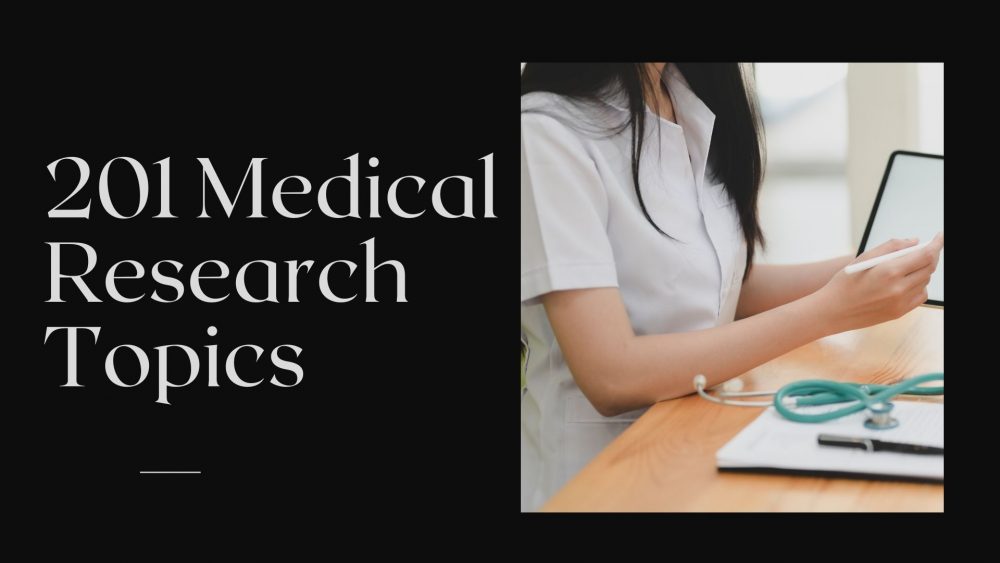
If you are in a medical college, you probably understand the struggle students face in finding medical research topics. On top of having to view corpses during practical sessions, there is another scary part of looking for best-rated medical research topic ideas.
What Is A Medical Research Paper?
It refers to an academic paper designed to test medical students’ understanding of medicine’s various aspects. These include nursing, psychotherapy, surgery, diseases, and many more.
Finding great medical research paper topics is not as hard as most students perceive it to be. It is only the fear that turns down most students, preventing them from unleashing their potential. However, here are some of the readily available sources that will give you medical topics for research papers:
Reputable medicine-related websites such as the WHO’s Known books and scholarly journals in medicine A credible online writing site (such as ours)
Through this paper’s help, you will know how to write top-rated medical research papers topics in an easy-to-understand manner.
Medical Research Topics For College Students
- Discuss why doctors use a snake in their logo
- Why is the field of medicine not preferred by most students?
- Evaluate the effectiveness of using simulations instead of natural bodies in a medical class
- The role of therapy in advancing the economic and political status of a country
- Why schools should incorporate First Aid skills as part of their curriculum
- Are the medical internships too long for students?
- Assess the possibility of paying doctors more than any other workers
- Should all the staff in a medical facility have a background in medicine?
- Discuss the impact of technological advancements on medicine
- Do movies depict the unfair practice of medicine?
- The perception of students towards medicine: A case study of middle school students
- What is the greatest challenge facing doctors and clinicians?
- Does the medical curriculum cover every aspect of medicine
- Discuss the impact of online learning on medical students
- Should doctors down their tools in case of a disagreement with their employers?
- How often should one go for a dental check-up?
- Analyze the number of medical colleges in the US
- Should doctors undergo a psychological check-up after every three months?
- What is the role of the government in ensuring a sustainable healthcare program?
- The impact of long shifts to the mental state of a doctor
Med Research Topics in Nursing
- Analyze the factors affecting elderly nursing care programs
- Discuss why memory loss is associated with advancement in age
- Should first responders to an accident scene dress the wounds of the victims?
- Why is the field of nursing not a favorite for men?
- Compare and contrast the roles of a doctor versus those of a nurse
- Evaluate the effectiveness of nursing shifts in case of a pandemic
- Why is the uniform of most nurses white in color?
- Analyze the different ethical challenges associated with the nursing profession
- What is the motivation story behind most of the nurses in work?
- The impact of domestic violence on the effectiveness of a nurse
- How nurses manage to stay sober despite the horrific scenes they encounter daily
- Are nurses born or made: A case study of nurses at a hospital of your choice
- The role of nurses in caring for those in Acoma
- The impact of the nursing profession on one’s social interactions
- Compare and contrast nursing in developing countries versus developed countries
- Describe the effect of negligence on the part of the nurses to patients
- Are nurses compensated enough for their labor?
- Describe what constitutes a typical day of a nurse
- Is stereotyping a leading cause for the dominance of females in the nursing profession
- Conduct a critical analysis of the role of nurses in a surgery room
Interesting Medical Topics on Health
- The impact of global warming on the behavior of disease-causing micro-organisms
- Dealing with the problem of poor sanitation in developing countries
- Why are the whites primarily susceptible to malaria attacks
- Discuss why vaccines can only be effective if made within one year
- Conduct a comparative analysis of the effectiveness of syringes versus tablets
- What is the impact of taking a dose and not completing it?
- Evaluate why sourcing doctors from outside may not be effective
- Are the research papers on health conclusive enough?
- Why governments need to invest more in the health systems of a nation
- Barriers to affordable medical care among low-income families
- What are the considerations for an effective universal healthcare program?
- Analyze the various factors that impede the productivity of healthcare workers
- The effectiveness of counseling and psychology before a surgery
- Is it possible to achieve a healthy world with the ravaging effects of greenhouse gases?
- The impact of private health firms on the existing public one
- How to regulate the sale of medical products
- Discuss why most people opt for advanced medical procedures overseas
- Analyze the challenges encountered in maternity wards
- The role of religious persons in a medical facility
- Should the government tax medical products?
Medical Research Topics For High School Students
- Discuss why HIV/AIDS has not found a cure to date
- What is the impact of alternative medicine in promoting healthcare services?
- The role of exercises and fitness in leading a healthy lifestyle
- Why is there a need for health care reform measures
- The part of fast-food restaurants in deteriorating the health of a country
- Evaluate the impact of dietary supplements on one’s health
- Reasons why Over-the-Counter prescription drugs are killing many
- Considerations before going for a weight loss surgery
- What are the medical reasons behind vegetarianism?
- The impact of organic foods on the health of a person
- Why depression is the leading cause of health complications among teens
- Discuss drug abuse in the line of health impacts
- Practical ways of helping a smoking addict to reform
- Discuss the relationship between fat diets and obesity
- Why do people who work in offices predominantly suffer from obesity?
- Compare and contrast between cycling and jogging: Which is advisable?
- Why do some people prefer injections while others opt for syrups?
- Should medicine as a course be introduced at the high school level?
- What are the physical traits and qualities of a person aspiring to do the treatment?
- Evaluate the time taken to complete a medical course: is it long or short?
COVID-19 Medical Topics To Write About
- Why is the world experiencing second and third waves of COVID-19?
- Assess the viability and effectiveness of the coronavirus vaccines?
- How does washing hands prevent one from contracting COVID-19?
- Compare and contrast the point of a surgical mask and one made of cloth
- Discuss why there are more COVID-19 related deaths in European countries than African countries
- The impact of quarantines on the mental state of a person
- What is the maximum number of nasal swabs that a person should take?
- Discuss the science behind social distancing in curbing the spread of the virus
- Why coronavirus cases are still on the rise despite the availability of vaccines
- What determines the immunity of a person against coronavirus?
- Evaluate the chances of contracting coronavirus from handling a corpse
- Is it possible to eliminate coronavirus?
- How effective are the COVID-19 certificates for travelers?
- Is it possible to curb the spread of coronavirus in kindergartens?
- Critically evaluate COVID-19 treatment and containment measures in developed and developing countries
- The role of researchers in providing medical information during the COVID-19 pandemic
- What are the differences between coronavirus and the Spanish flu?
- Impact of economic recessions on the containment of the virus
- Analyze the roles of various stakeholders in containing coronavirus
- Discuss the mutation of the coronavirus
Top Topics For Medical Research Paper
- Discuss the differences between epidemic and pandemics
- Analyze the critical considerations for a child health care program
- The role of humanitarian medical missions in reaching the developing nations
- Why are most people suffering from heart diseases of late?
- Discuss the dangers and benefits of vaccination
- Critically analyze the ethical considerations of conducting medical research on animals
- The impact of rare genetic disorders on the stability of families
- What are the effects of surgeries on organs and artificial tissues
- Discuss why brain surgeries are always a matter between life and death
- Evaluate the various causes and treatments of virus infections
- Are antibiotics treatments effective for complex diseases?
- Discuss the ethical considerations in ending the life of a person with a terminal illness
- The causes and remedies of eating disorders
- How age affects mental health and physical development
- Analyze the shortcomings of palliative treatment
- The impact of modern lifestyles on people’s health
- How technology is helping patients battling with Alzheimer’s disease
- Considerations before being part of a blood donation exercise
- How to care for cancer patients in their critical stages
- Are professional conditions only for specific careers?
Controversial Medical Topics For Research Paper
- Do doctors have the right to conduct abortions when it is a matter between life and death?
- The ethical underlining of artificial insemination in man
- Discuss why most surrogate parents are not considered
- Is it right to use birth control pills for school-going children?
- Discuss the impact of stem cell research on a society’s morals
- Is plastic surgery, for whatever case, unethical?
- Should male doctors attend to female patients?
- Is it possible to achieve confidentiality in a hospital set-up?
- Why do most male patients prefer being treated by female nurses?
- Discuss the ethical implications behind sperm and egg donation
- Is donating blood unethical? A case study of selected religious sects
- Should families pay for medical bills after their death of their beloved one?
- Discuss the implication of LGBTQ on medical care
- Is it ethical to sell body organs before or after death?
- Critically discuss the impact of transplanting a sexual organ
- Discuss how to deal with teen pregnancy
- How do religion, culture, and tradition differ from the field of medicine?
- Are health insurance companies to cover all healthcare costs?
- Discuss the impact of taxing on medical supplies
- Who should be paid more between doctors and nurses?
Researchable Medical Research Topics Examples
- Discuss the medical implications of male circumcision
- The impact of political action on the effectiveness of health care systems
- The role of international collaborations in improving medical care
- Evaluate the challenges faced in the regulation of biomedical research
- A survey of the different attitudes towards psychiatry in the United States
- Evaluate the occupational safety concerns of medical laboratories
- Discuss the considerations of a controlled clinical trial
- Challenges during mass medical reparations: A case study of terrorist attacks
- The essence of introducing research training in psychiatry
- Evaluate the effectiveness of the courses offered in the medical colleges
- Discuss the impact of the US-African medical partnerships
- Why scientists need to collaborate in the case of a pandemic
- Are vaccines the best way to prevent one from contracting a disease?
- The impact of community-based participatory approaches in improving hygiene standards
- The vital role of pharmacy workers in a medical profession
- The critical place of knowledge and experience in the field of medicine
- The role of stakeholders in developing better health care policies
- The impact of demoralization of HIV/AIDS
- Discuss the process of production and distribution of medical products
- Analyze the critical aspect of globalization in medical research
Hot Medical Research Paper Topics For College Students
- The role of medicine in setting and implementing food standards
- What are the critical causes of gluten allergy
- Is it ethical to conduct assisted suicide for terminal patients?
- Ethical concerns of charging fees for patients who die in the process of treatment
- The ethical considerations when conducting a postmortem
- How is virtual reality transforming medicine?
- An analysis of the myths and misconceptions surrounding medicine?
- Why many people are against cloning
- Is it legal to use marijuana as a medical product?
- Evaluate the benefits and dangers of immunization at a tender age
- Is increased life expectancy a burden on the healthcare system?
- Analyze the health effects of female genital mutilation
- The impact of the environment on human health
- How to deal with deafness as a communication disorder
- Discuss air pollution in the context of a household
- Alcohol control practices
- The public danger of diabetes
- Urban population and respiratory diseases
- Effectiveness of oral health assessments
- Unhealthy diets
Unbeatable Research Topics in Medical Field
- Factors leading to increased cancer cases
- Resistance to insulin
- Treating autism
- Genetic engineering
- Latest developments in cancer
- Terrorism and mental health
- Dealing with coma
- Treating mental diseases
- Inequalities in healthcare
- Effects of smoking on body organs
- Healthcare considerations for prison inmates
- Economic development and healthcare
- The role of infrastructure in healthcare systems
- Recent developments in coronavirus
- Genetic mutations
- Benefits of banning tobacco ads
- Dealing with anti-vaccine movements
- How to deal with childhood trauma
- Effects of posttraumatic stress disorder
- Importance of the lymphatic system
- How to care for the liver
From the marvelous medical research topics ideas above, we hope you find one that suits your task. If not, you can still opt for our quality research paper writing help.
Let an expert complete your paper quickly and fast at a cheap rate today!

Make PhD experience your own
Leave a Reply Cancel reply
Your email address will not be published. Required fields are marked *
Research Topics & Ideas: Healthcare
100+ Healthcare Research Topic Ideas To Fast-Track Your Project

Finding and choosing a strong research topic is the critical first step when it comes to crafting a high-quality dissertation, thesis or research project. If you’ve landed on this post, chances are you’re looking for a healthcare-related research topic , but aren’t sure where to start. Here, we’ll explore a variety of healthcare-related research ideas and topic thought-starters across a range of healthcare fields, including allopathic and alternative medicine, dentistry, physical therapy, optometry, pharmacology and public health.
NB – This is just the start…
The topic ideation and evaluation process has multiple steps . In this post, we’ll kickstart the process by sharing some research topic ideas within the healthcare domain. This is the starting point, but to develop a well-defined research topic, you’ll need to identify a clear and convincing research gap , along with a well-justified plan of action to fill that gap.
If you’re new to the oftentimes perplexing world of research, or if this is your first time undertaking a formal academic research project, be sure to check out our free dissertation mini-course. In it, we cover the process of writing a dissertation or thesis from start to end. Be sure to also sign up for our free webinar that explores how to find a high-quality research topic.
Overview: Healthcare Research Topics
- Allopathic medicine
- Alternative /complementary medicine
- Veterinary medicine
- Physical therapy/ rehab
- Optometry and ophthalmology
- Pharmacy and pharmacology
- Public health
- Examples of healthcare-related dissertations
Allopathic (Conventional) Medicine
- The effectiveness of telemedicine in remote elderly patient care
- The impact of stress on the immune system of cancer patients
- The effects of a plant-based diet on chronic diseases such as diabetes
- The use of AI in early cancer diagnosis and treatment
- The role of the gut microbiome in mental health conditions such as depression and anxiety
- The efficacy of mindfulness meditation in reducing chronic pain: A systematic review
- The benefits and drawbacks of electronic health records in a developing country
- The effects of environmental pollution on breast milk quality
- The use of personalized medicine in treating genetic disorders
- The impact of social determinants of health on chronic diseases in Asia
- The role of high-intensity interval training in improving cardiovascular health
- The efficacy of using probiotics for gut health in pregnant women
- The impact of poor sleep on the treatment of chronic illnesses
- The role of inflammation in the development of chronic diseases such as lupus
- The effectiveness of physiotherapy in pain control post-surgery

Topics & Ideas: Alternative Medicine
- The benefits of herbal medicine in treating young asthma patients
- The use of acupuncture in treating infertility in women over 40 years of age
- The effectiveness of homoeopathy in treating mental health disorders: A systematic review
- The role of aromatherapy in reducing stress and anxiety post-surgery
- The impact of mindfulness meditation on reducing high blood pressure
- The use of chiropractic therapy in treating back pain of pregnant women
- The efficacy of traditional Chinese medicine such as Shun-Qi-Tong-Xie (SQTX) in treating digestive disorders in China
- The impact of yoga on physical and mental health in adolescents
- The benefits of hydrotherapy in treating musculoskeletal disorders such as tendinitis
- The role of Reiki in promoting healing and relaxation post birth
- The effectiveness of naturopathy in treating skin conditions such as eczema
- The use of deep tissue massage therapy in reducing chronic pain in amputees
- The impact of tai chi on the treatment of anxiety and depression
- The benefits of reflexology in treating stress, anxiety and chronic fatigue
- The role of acupuncture in the prophylactic management of headaches and migraines

Topics & Ideas: Dentistry
- The impact of sugar consumption on the oral health of infants
- The use of digital dentistry in improving patient care: A systematic review
- The efficacy of orthodontic treatments in correcting bite problems in adults
- The role of dental hygiene in preventing gum disease in patients with dental bridges
- The impact of smoking on oral health and tobacco cessation support from UK dentists
- The benefits of dental implants in restoring missing teeth in adolescents
- The use of lasers in dental procedures such as root canals
- The efficacy of root canal treatment using high-frequency electric pulses in saving infected teeth
- The role of fluoride in promoting remineralization and slowing down demineralization
- The impact of stress-induced reflux on oral health
- The benefits of dental crowns in restoring damaged teeth in elderly patients
- The use of sedation dentistry in managing dental anxiety in children
- The efficacy of teeth whitening treatments in improving dental aesthetics in patients with braces
- The role of orthodontic appliances in improving well-being
- The impact of periodontal disease on overall health and chronic illnesses

Tops & Ideas: Veterinary Medicine
- The impact of nutrition on broiler chicken production
- The role of vaccines in disease prevention in horses
- The importance of parasite control in animal health in piggeries
- The impact of animal behaviour on welfare in the dairy industry
- The effects of environmental pollution on the health of cattle
- The role of veterinary technology such as MRI in animal care
- The importance of pain management in post-surgery health outcomes
- The impact of genetics on animal health and disease in layer chickens
- The effectiveness of alternative therapies in veterinary medicine: A systematic review
- The role of veterinary medicine in public health: A case study of the COVID-19 pandemic
- The impact of climate change on animal health and infectious diseases in animals
- The importance of animal welfare in veterinary medicine and sustainable agriculture
- The effects of the human-animal bond on canine health
- The role of veterinary medicine in conservation efforts: A case study of Rhinoceros poaching in Africa
- The impact of veterinary research of new vaccines on animal health
Topics & Ideas: Physical Therapy/Rehab
- The efficacy of aquatic therapy in improving joint mobility and strength in polio patients
- The impact of telerehabilitation on patient outcomes in Germany
- The effect of kinesiotaping on reducing knee pain and improving function in individuals with chronic pain
- A comparison of manual therapy and yoga exercise therapy in the management of low back pain
- The use of wearable technology in physical rehabilitation and the impact on patient adherence to a rehabilitation plan
- The impact of mindfulness-based interventions in physical therapy in adolescents
- The effects of resistance training on individuals with Parkinson’s disease
- The role of hydrotherapy in the management of fibromyalgia
- The impact of cognitive-behavioural therapy in physical rehabilitation for individuals with chronic pain
- The use of virtual reality in physical rehabilitation of sports injuries
- The effects of electrical stimulation on muscle function and strength in athletes
- The role of physical therapy in the management of stroke recovery: A systematic review
- The impact of pilates on mental health in individuals with depression
- The use of thermal modalities in physical therapy and its effectiveness in reducing pain and inflammation
- The effect of strength training on balance and gait in elderly patients
Topics & Ideas: Optometry & Opthalmology
- The impact of screen time on the vision and ocular health of children under the age of 5
- The effects of blue light exposure from digital devices on ocular health
- The role of dietary interventions, such as the intake of whole grains, in the management of age-related macular degeneration
- The use of telemedicine in optometry and ophthalmology in the UK
- The impact of myopia control interventions on African American children’s vision
- The use of contact lenses in the management of dry eye syndrome: different treatment options
- The effects of visual rehabilitation in individuals with traumatic brain injury
- The role of low vision rehabilitation in individuals with age-related vision loss: challenges and solutions
- The impact of environmental air pollution on ocular health
- The effectiveness of orthokeratology in myopia control compared to contact lenses
- The role of dietary supplements, such as omega-3 fatty acids, in ocular health
- The effects of ultraviolet radiation exposure from tanning beds on ocular health
- The impact of computer vision syndrome on long-term visual function
- The use of novel diagnostic tools in optometry and ophthalmology in developing countries
- The effects of virtual reality on visual perception and ocular health: an examination of dry eye syndrome and neurologic symptoms
Topics & Ideas: Pharmacy & Pharmacology
- The impact of medication adherence on patient outcomes in cystic fibrosis
- The use of personalized medicine in the management of chronic diseases such as Alzheimer’s disease
- The effects of pharmacogenomics on drug response and toxicity in cancer patients
- The role of pharmacists in the management of chronic pain in primary care
- The impact of drug-drug interactions on patient mental health outcomes
- The use of telepharmacy in healthcare: Present status and future potential
- The effects of herbal and dietary supplements on drug efficacy and toxicity
- The role of pharmacists in the management of type 1 diabetes
- The impact of medication errors on patient outcomes and satisfaction
- The use of technology in medication management in the USA
- The effects of smoking on drug metabolism and pharmacokinetics: A case study of clozapine
- Leveraging the role of pharmacists in preventing and managing opioid use disorder
- The impact of the opioid epidemic on public health in a developing country
- The use of biosimilars in the management of the skin condition psoriasis
- The effects of the Affordable Care Act on medication utilization and patient outcomes in African Americans
Topics & Ideas: Public Health
- The impact of the built environment and urbanisation on physical activity and obesity
- The effects of food insecurity on health outcomes in Zimbabwe
- The role of community-based participatory research in addressing health disparities
- The impact of social determinants of health, such as racism, on population health
- The effects of heat waves on public health
- The role of telehealth in addressing healthcare access and equity in South America
- The impact of gun violence on public health in South Africa
- The effects of chlorofluorocarbons air pollution on respiratory health
- The role of public health interventions in reducing health disparities in the USA
- The impact of the United States Affordable Care Act on access to healthcare and health outcomes
- The effects of water insecurity on health outcomes in the Middle East
- The role of community health workers in addressing healthcare access and equity in low-income countries
- The impact of mass incarceration on public health and behavioural health of a community
- The effects of floods on public health and healthcare systems
- The role of social media in public health communication and behaviour change in adolescents
Examples: Healthcare Dissertation & Theses
While the ideas we’ve presented above are a decent starting point for finding a healthcare-related research topic, they are fairly generic and non-specific. So, it helps to look at actual dissertations and theses to see how this all comes together.
Below, we’ve included a selection of research projects from various healthcare-related degree programs to help refine your thinking. These are actual dissertations and theses, written as part of Master’s and PhD-level programs, so they can provide some useful insight as to what a research topic looks like in practice.
- Improving Follow-Up Care for Homeless Populations in North County San Diego (Sanchez, 2021)
- On the Incentives of Medicare’s Hospital Reimbursement and an Examination of Exchangeability (Elzinga, 2016)
- Managing the healthcare crisis: the career narratives of nurses (Krueger, 2021)
- Methods for preventing central line-associated bloodstream infection in pediatric haematology-oncology patients: A systematic literature review (Balkan, 2020)
- Farms in Healthcare: Enhancing Knowledge, Sharing, and Collaboration (Garramone, 2019)
- When machine learning meets healthcare: towards knowledge incorporation in multimodal healthcare analytics (Yuan, 2020)
- Integrated behavioural healthcare: The future of rural mental health (Fox, 2019)
- Healthcare service use patterns among autistic adults: A systematic review with narrative synthesis (Gilmore, 2021)
- Mindfulness-Based Interventions: Combatting Burnout and Compassionate Fatigue among Mental Health Caregivers (Lundquist, 2022)
- Transgender and gender-diverse people’s perceptions of gender-inclusive healthcare access and associated hope for the future (Wille, 2021)
- Efficient Neural Network Synthesis and Its Application in Smart Healthcare (Hassantabar, 2022)
- The Experience of Female Veterans and Health-Seeking Behaviors (Switzer, 2022)
- Machine learning applications towards risk prediction and cost forecasting in healthcare (Singh, 2022)
- Does Variation in the Nursing Home Inspection Process Explain Disparity in Regulatory Outcomes? (Fox, 2020)
Looking at these titles, you can probably pick up that the research topics here are quite specific and narrowly-focused , compared to the generic ones presented earlier. This is an important thing to keep in mind as you develop your own research topic. That is to say, to create a top-notch research topic, you must be precise and target a specific context with specific variables of interest . In other words, you need to identify a clear, well-justified research gap.
Need more help?
If you’re still feeling a bit unsure about how to find a research topic for your healthcare dissertation or thesis, check out Topic Kickstarter service below.

You Might Also Like:

15 Comments
I need topics that will match the Msc program am running in healthcare research please
Hello Mabel,
I can help you with a good topic, kindly provide your email let’s have a good discussion on this.
Can you provide some research topics and ideas on Immunology?
Thank you to create new knowledge on research problem verse research topic
Help on problem statement on teen pregnancy
This post might be useful: https://gradcoach.com/research-problem-statement/
can you provide me with a research topic on healthcare related topics to a qqi level 5 student
Please can someone help me with research topics in public health ?
Hello I have requirement of Health related latest research issue/topics for my social media speeches. If possible pls share health issues , diagnosis, treatment.
I would like a topic thought around first-line support for Gender-Based Violence for survivors or one related to prevention of Gender-Based Violence
Please can I be helped with a master’s research topic in either chemical pathology or hematology or immunology? thanks
Can u please provide me with a research topic on occupational health and safety at the health sector
Good day kindly help provide me with Ph.D. Public health topics on Reproductive and Maternal Health, interventional studies on Health Education
may you assist me with a good easy healthcare administration study topic
May you assist me in finding a research topic on nutrition,physical activity and obesity. On the impact on children
Submit a Comment Cancel reply
Your email address will not be published. Required fields are marked *
Save my name, email, and website in this browser for the next time I comment.
- Print Friendly

Choose Your Test
Sat / act prep online guides and tips, 61 great medical programs for high school students + advice.
Extracurriculars

Thinking about a career in medicine? I highly recommend trying out some medical experiences in high school before committing to a pre-med track . Many of my high school friends who hoped to go into medicine ended up changing their major during college when the pre-med courses got too difficult.
Doing a medical internship, summer program, or community service project in high school can help you decide if medicine is the right track for you before you waste time and money going pre-med in college. This guide will explain what experiences are open to you as a high school student, what those experiences involve, and how you will benefit from them.
What Medical Experiences Are Available to High School Students?
There are lots of ways to get a taste of what it's like to work in medicine. In my opinion, the best time to do this is over the summer. You have the most free time during the summer, and there are more experiences available.
There are many summer medical programs and summer medical internships for high school students across the country. These opportunities range from research experiences to in-hospital experiences. Some of these programs and internships charge you a fee to attend, some are paid for, and some even pay you to attend.
I've compiled a list of over 60 summer medical programs for high school students. Several of these programs and internships are limited to students from a specific state or area, so be sure to check specific programs for application requirements and fees. I've provided links to each program below.
If you'd like to get experience during the school year (on weekends and after school), you should consider shadowing a doctor or volunteering at a hospital. I'll discuss the details of volunteering and job shadowing later in the article.

List of Summer Medical Programs for High School Students
I've divided up the summer medical programs into three categories: Medical Programs, Medical Research Programs, and general Science Research Programs.
Medical Programs
In the medical programs category, I list programs that offer high school students the chance to get hands-on experience in medicine (non-research related) such as learning simple medical procedures, watching surgeries, shadowing doctors, working in hospitals, interacting with patients, and more . There are very few programs that offer this type of experience to high school students, and I highly recommend them since they'll give you the most realistic look at what life's like as a pre-med student, medical student, and medical professional.
Medical Research Programs
If you're unable to do one of the above medical programs, the next best thing is a medical research program. In these programs, you'll be working in a lab and helping with medical research that's in progress (i.e. looking at slides under a microscope, recording changes) or assisting with on-going clinical research (i.e. interviewing participants in an on-going trial of new medication, logging participant information in the computer). Many of these programs pair you with a mentor who works at your location. Also, several of these programs require you to give a presentation at the end of the program.
These medical research programs are extremely valuable because, as a pre-med student, you'll likely end up doing lab work either for class or as an extracurricular for your medical school application. If you do one of these programs in high school, you'll be a step ahead of your pre-med classmates.
(One quick note: many of these programs are free or pay stipends, but not every program provides free housing . Make sure you check each program's housing accommodations before you apply!)
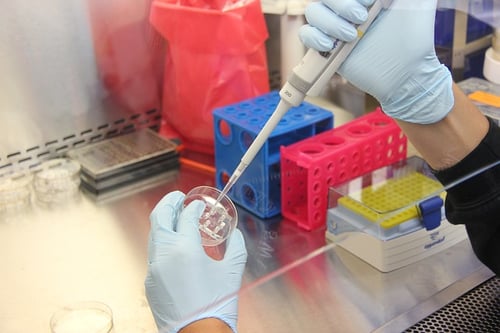
Science Research Programs
If you can't do one of the medical research or medical programs, you should consider trying to do a science summer program/internship . These programs are not medicine-specific and cover a wide range of science topics (from plant life to space). However, these programs are still very valuable because as a pre-med student, you'll be learning a ton of science. As a part of your pre-med track, you'll be required to take Biology, Chemistry, Biochemistry, Organic Chemistry, and more. Doing one of these science programs will give you a preview of the coursework ahead of you.
Also, many of these programs are lab work, and, although they're not focused on medical research, they will still give you good general insights into how to do lab work . As I said before, as a pre-med student, you'll likely end up doing lab work either for class or as an extracurricular for your medical school application. If you do one of these programs, you'll be well-prepared to do that research.

What Are the Pros and Cons of These Programs?
These medical programs can be a great experience for many high school students, but they can have some drawbacks. In this section we'll look at the pros and cons of medical programs for high school students.
- These programs and internships provide a real look at what life's like as a researcher, scientist, or medical student. You'll have a great sense of whether or not you'd like to pursue a career in the medical field after you finish your program.
- If you do a college campus program, you'll get a preview of college life . You can experience living away from home, and you can decide if you like the college. I did a summer program at UCLA during high school, and it made me realize that UCLA was not the school for me.
- As I said before, these opportunities give you the chance to evaluate if pre-med is the track you want to go down before you waste time and money in college. If you love your program, you'll be even more motivated to work hard to become a medical professional .
- You'll meet like-minded students who're interested in medicine/science.
- You'll have a great program or internship on your college application . By actually participating in a medical/science program, you'll show colleges that you're committed to pursuing a career in the medical field.
- If you attend a college campus program, and you're interested in going to college at the school that hosted the program, you'll have shown real interest in that college (which admissions officers always like to see).
- These programs can be expensive . However, some programs pay you to attend! Make sure you check out the individual program websites to find out the cost. And like we mentioned before, pay careful attention to housing! Some programs might offer stipends, but they may not cover housing or transportation costs.
- Also, these summer medical programs for high school students can be highly competitive (some admit very few students or have special qualifications such as having a 3.5 GPA or higher).
- Some programs may not provide you with the best insight into medicine , especially those that are less hands-on or only offer research exposure (which is not what you'll necessarily be interested in).
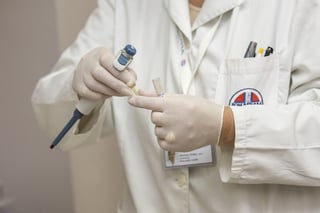
Other Options: Hospital Volunteer or Shadowing a Doctor
Volunteering and job shadowing are both great ways to participate in medical experiences at your local hospital. You can do them during the school year or the summer. Also, both opportunities are free!
What's the difference between volunteering & job shadowing a doctor? As a hospital volunteer, you'll have to apply (and likely interview) to be a volunteer (along with getting a TB test and filling out paperwork). You'll attend a hospital volunteer orientation and be assigned a specific "job" at the hospital, such as assisting the nurses or assisting hospital visitors in navigating the hospital. As a volunteer, you'll be required to commit to volunteering for a certain number of shifts per week. You also may have to commit to volunteering for six months or more.
Job shadowing is a shorter experience and much less formal. You can shadow a doctor for as little time as a few hours or a day or two. While shadowing, you follow a doctor around while they go about their normal activities. They may ask you to help them with basic tasks (grabbing a chart or taking notes), but probably not. You'll be there to see what a doctor does in their daily routine to determine if it interests you.
To sign up to be a hospital volunteer, apply through the hospital's website. If you're having trouble locating the hospital's website or contact information, check with your school academic advisor. They may have a connection to the local hospital or might know another student who has volunteered or job shadowed there and who could help you get involved.
To find a job shadowing opportunity, reach out to any friends or family who work in the medical field. See if they know any doctors whom you could shadow. Also, ask your school's academic advisor if they know other students who shadowed a doctor and could give you more information. If your school can't help you, get in touch with the hospital directly to see if they can help you set up a job shadowing opportunity. If you need more advice on job shadowing, read our other guide.
What Are the Pros and Cons of Shadowing a Doctor or Being a Hospital Volunteer?
Shadowing a doctor or being a hospital volunteer is a significantly different experience than participating in a summer medical program, and they have their own set of pros and cons.
- As opposed to summer programs, these experiences are always free. As I said above, some medical programs and internships can cost a lot of money. Job shadowing and being a hospital volunteer are free experiences that will only cost you your time. These are great options if you can't afford the cost of a summer program.
- Job shadowing and being a hospital volunteer can provide a real look into life as a doctor or nurse. By following them around or working in a hospital, you'll get a sense of the work environment and what life is like on a day-to-day basis for a medical professional.
- As I said before, these opportunities give you the chance to evaluate if pre-med is the track you want to go down before you spend time and money in college. If you don't like your experience job shadowing or as a volunteer, you might realize pre-med isn't the right path for you. However, if you love your experience, you'll feel more motivated to work towards your goal of becoming a medical professional.
- Job shadowing is a great experience if you don't have a lot of time to commit. You can choose to job shadow for a few hours, a full day, or for several days. It's very flexible.
- If you want to be pre-med, volunteering at a hospital is a great extracurricular activity for your college application. While volunteering elsewhere (at a homeless shelter, animal shelter, etc.) can be great for a college application, it's good to keep your extracurriculars focused on your future goals. Volunteering at a hospital will show colleges that you're serious about a career in medicine.
- Volunteer experience may not provide you with quite the medical experience you're looking for. Volunteering may not be very hands-on, and your duties may be repetitive and not directly related to medicine, such as answering phones, filing papers, and helping visitors find where they're going.
- If you only job shadow for a day, it's not a great experience for your college application. It's not an extracurricular activity if you only do it once because that doesn't show enough commitment. However, I recommend doing job shadowing just to get insight into the medical field.
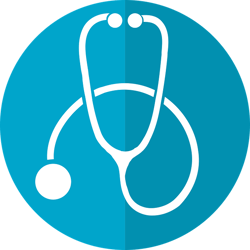
How to Choose the Right Medical Experience for You
Each of the medical experiences listed in this article has value, but to decide which is right for you, you should ask yourself three questions:
#1: What Is Your Main Medical Interest?
Are you more interested in research or patient care? If research, look into one of the summer research programs. If patient care, look into one of the hospital-based programs, job shadowing or being a hospital volunteer.
#2: How Much Money Are You Willing to Spend?
Do you have money to spend, do you have no money to spend, or do you need to have a job that pays? If you have money to spend, you can consider all of the options. If you have no money to spend, look into an all-expenses paid program (or one with financial aid). Also, consider volunteering or job shadowing since both are free experiences. If you need a job that pays, look into the programs with stipends for participants.
#3: How Much Time Do You Want to Invest in Your Experience?
Do you want to spend a day, a few hours per week, or a few weeks full-time on this experience? If you want a quick experience, consider job shadowing a doctor for a day or two. If you'd like an on-going experience to use as an extracurricular, consider volunteering since you could do that a few hours per week throughout the school year. If you'd like an intensive experience, consider doing one of the summer programs or internships.
Also, always make sure to research a program or experience before you commit to it. Doing so will help avoid a bad experience (such as a program that's not very hands-on or volunteer work that's mostly grunt work). Whatever you're interested in doing, try to find another student who did it previously and ask them about their experience. For the programs, get in touch with the program coordinator to see if they can put you in contact with a program alum you can speak with.

College take a close look at your extracurriculars. Like, a really close look.
How Will Colleges View These Experiences?
Colleges mainly look for extracurriculars that show your commitment, passion, and ability to handle responsibility and leadership. Job shadowing isn't a great experience for your college application because it's not enough of a commitment if you only do it for a few days. On the other hand, volunteering at a hospital is a great extracurricular activity for your college application because it shows a commitment to medicine.
The summer programs and internships are also great experiences for your college application because they show that same interest in and commitment to medicine. Also, many of these programs and internships are competitive, and colleges know that. If you're accepted into one of those programs or internships, colleges will view it like you won a prestigious award.
What's Next?
Doing a medical program is a great step, but what else do you need to do to prepare for med school? Check out our step-by-step guide to preparing for med school as a high school student and our list of the best books for pre-med students .
Also, you should learn about how to write about extracurriculars on college applications . Check out four amazing examples of extracurriculars for college applications.
Interested in a BS/MD program? They can be a great way to save some time and get your medical degree sooner. Read our guide on getting into BS/MD programs to learn more.

As an SAT/ACT tutor, Dora has guided many students to test prep success. She loves watching students succeed and is committed to helping you get there. Dora received a full-tuition merit based scholarship to University of Southern California. She graduated magna cum laude and scored in the 99th percentile on the ACT. She is also passionate about acting, writing, and photography.
Ask a Question Below
Have any questions about this article or other topics? Ask below and we'll reply!
Improve With Our Famous Guides
- For All Students
The 5 Strategies You Must Be Using to Improve 160+ SAT Points
How to Get a Perfect 1600, by a Perfect Scorer
Series: How to Get 800 on Each SAT Section:
Score 800 on SAT Math
Score 800 on SAT Reading
Score 800 on SAT Writing
Series: How to Get to 600 on Each SAT Section:
Score 600 on SAT Math
Score 600 on SAT Reading
Score 600 on SAT Writing
Free Complete Official SAT Practice Tests
What SAT Target Score Should You Be Aiming For?
15 Strategies to Improve Your SAT Essay
The 5 Strategies You Must Be Using to Improve 4+ ACT Points
How to Get a Perfect 36 ACT, by a Perfect Scorer
Series: How to Get 36 on Each ACT Section:
36 on ACT English
36 on ACT Math
36 on ACT Reading
36 on ACT Science
Series: How to Get to 24 on Each ACT Section:
24 on ACT English
24 on ACT Math
24 on ACT Reading
24 on ACT Science
What ACT target score should you be aiming for?
ACT Vocabulary You Must Know
ACT Writing: 15 Tips to Raise Your Essay Score
How to Get Into Harvard and the Ivy League
How to Get a Perfect 4.0 GPA
How to Write an Amazing College Essay
What Exactly Are Colleges Looking For?
Is the ACT easier than the SAT? A Comprehensive Guide
Should you retake your SAT or ACT?
When should you take the SAT or ACT?
Stay Informed
Get the latest articles and test prep tips!
Looking for Graduate School Test Prep?
Check out our top-rated graduate blogs here:
GRE Online Prep Blog
GMAT Online Prep Blog
TOEFL Online Prep Blog
Holly R. "I am absolutely overjoyed and cannot thank you enough for helping me!”
Credible Health and Medical Research Tools for High School Students
- September 11, 2017
We all know that starting a new project and searching on Google can be overwhelming. Google gives us access to a tremendous amount of information but it can be hard to comb through the search results and know whether a website is reputable and the information is accurate. I often experience this when I help my kids find information for their school assignments.
If your child is doing a research project, writing a paper, or is curious about health or medical topics, the National Library of Medicine (NLM) is a good place to start. The NLM, the largest biomedical library in the world, is part of the National Institutes of Health (NIH), the largest biomedical research agency in the world. NLM’s mission is to make health and medical resources available to everyone, thereby improving public health. The NLM offers credible, up-to-date, peer-reviewed publications written by experts.
I was very happy to learn about the National Library of Medicine’s online resources from Susan Halpin, Education and Outreach Coordinator for NNLM. These educational resources are free and accessible to everyone– students, teachers, and parents– and help foster learning of all kinds, for all ages.

Susan Halpin regularly works with students and teachers in K-12 schools and understands the challenges each group faces in finding reputable, useful, and age-appropriate information. Following is my Q&A with Susan where she discusses why students should use NLM websites for their health and medicine-related projects. Included is a list of top websites and links Susan recommends.
Q: What kind of work do you do in K-12 schools?

A: I am an Education and Outreach Coordinator for the New England Region of the National Network of Libraries of Medicine. I promote and provide education for the free, digital resources provided by the NLM. NLM’s outreach and education are coordinated through partnerships with 8 regional medical libraries located throughout the United States. For example, the University of Massachusetts Medical School Library in Worcester, MA is the regional medical library partner for New England.
The cooperative agreement between the University of Massachusetts and the NLM enables me to provide outreach not only to educators and students, but we also have resources for healthcare providers, public health personnel, researchers, scientists and many others working in the health and medical professions. NLM’s outreach program also includes grant funding for projects and programs that use NLM resources to further its mission.
I am a former public high school health and wellness teacher. Most recently, I worked with a local high school to apply for and implement a NLM grant for their after school HOSA – Future Health Professionals Club . HOSA is a nationwide organization that promotes education about health-oriented careers to high school students. The NLM grant enabled HOSA to purchase tablets that the students used to access NLMs educational resources for their research projects and their annual competition. The grant also paid for other educational materials that the club used to educate their school community about making healthy lifestyle choices during a Healthy Living fair at their school. I provided several training sessions to the club about how to use PubMed and MedlinePlus so they could create research projects and educational materials for their peers.
Here is a quote from the thank you note I received from their club advisor after the last training session.
“Can’t thank you enough for speaking with my HOSA/AP Bio kids last week. They thought it was FABULOUS and super helpful. They wished I had told them about it at the beginning of the year – for AP Biology. I plan on having HOSA make a tutorial video on the resources or have the three students come and teach my AP Biology students about the resources at the beginning of the year.”
Q: Why should students use NLM websites first before Google?
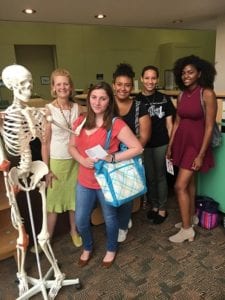
A: The current topics of “Fake News” and “Alternative Facts” have become part of our present-day vocabulary and provide an opportunity to explain why using NLM resources is a productive way to begin learning about a new topic, as well as a smart way start a research project. NLM resources are trusted resources for these reasons: (1) they are written by experts, (2) the information presented is peer-reviewed, (3) NLM sites are updated on a regular basis, and (4) advertising is not allowed on any NLM product. While Google is a wonderful source of information, you might not always get the best quality results based on the information you need.
NLM’s many websites and databases are designed to help you find appropriate, authoritative health information. To do this, NLM provides access to information produced by the National Institutes of Health. Not only does NLM have their own sites and databases, but NLM links to other web sites, produced by the NIH Institutes and other Federal Government organizations. Each of the NLM resources usually provides information about where their information comes from and how often it is updated. For example, the information provided to the user about the MedlinePlus website can be found here: https://medlineplus.gov/criteria.html .
Q: What NLM websites and resources should high school students use for research projects?
A: Susan recommends these 4 websites:
1. MedlinePlus- The MedlinePlus website , a collaborative effort from the U.S. National Library of Medicine and the National Institutes of Health, offers information about 750 health topics, a dictionary, medical encyclopedia, news, and directories to find physicians. MedlinePlus is written in simple language, for a consumer audience. Each page of the website is translated into Spanish and depending on the page, there are an additional 40 languages that the information is translated into.
2. MedlinePlus’ Tutorial for Evaluating Health Information- MedlinePlus offers a helpful tutorial about how to evaluate health information you come across online. Many high school and post-secondary classes that use internet resources may find a MedlinePlus tutorial a valuable first step in the process of learning about a specific health or medical topic. The information provided in the tutorial is presented in video and written formats.
3. Trust It or Trash It- MedlinePlus also offers a link to a useful tool called “ Trust It or Trash It ” that can be used to learn how to evaluate websites and judge the quality of the health information. There is an abbreviated version of the tutorial with much of the same information that could be used as a review tool on MedlinePlus’ site .
4. PubMed- The PubMed website , NLM’s most well-known product, is a database of indexed citations and abstracts to medical, nursing, dental, veterinary, health care and preclinical sciences journal articles. PubMed is an excellent resource for high school students to locate articles for research about medical topics, especially if they are taking AP classes or planning to pursue post-secondary education in any of the health sciences.
Here are specific links to PubMed students will find helpful:
- Through its tutorials, PubMed can teach students how to start a health-related research project at https://learn.nlm.nih.gov/rest/training-packets/T0042010P.html and https://www.ncbi.nlm.nih.gov/pmc/articles/PMC3178846/.
- Students can access free full-text biomedical and life sciences journal articles through PubMed Central (PMC) .
- If students are interested in health news and how to interpret it, PubMed Health is a great place to locate information about “hot topics” of interest to teens, such as obesity and mental health. When PubMed Health highlights a news article, it also provides the source of the news story, what type of research was conducted, whether the research involved animals or humans, and a summary of the research results.
- PubMed Health also offers another useful resource, Behind the Headlines , a service from the National Health Service , that contains a section about how to read health news critically.
Q: Which high school classes should students should use NLM websites for?
A: I would use the information for Biology, Environmental Science, Chemistry, Health, Anatomy and Physiology, Genetics, and Forensics.
Q: What websites can you recommend for younger children?
A: MedlinePlus has a Children’s page and a Teens’ page . These pages are helpful for students to begin a search on a health and medical topic or begin research for a project.
Part of NLM’s outreach program involves training. If you think the resources of the NLM would be of interest to your school or organization, contact Susan Halpin at [email protected] and she can talk about some possibilities.
If you are part of an organization and would like to stay up-to-date with NLM’s most current resources, opportunities for grant funding and training opportunities, join the New England network, it’s free.
Thank you to Susan for sharing these important educational resources. The websites are not only valuable sources of information for research projects but they can also be great tools to help children explore their personal interests and get them thinking about what they might want to study in college and pursue career-wise. I would encourage you to share these tools with your children, teachers, and other parents.
- Posted in Tech News

Comments on “Credible Health and Medical Research Tools for High School Students”
I spent all my Sun day morning trying to find reputable sites for Mt Health Science classes and had forgotten about these fantastic sites!
Glad you found the resources helpful!
thank you for such great detail guidance
So glad you found the information helpful!
Leave a Comment Cancel Reply
Your email address will not be published. Required fields are marked *
Yes, add me to your mailing list
About BostonTechMom

Cyndi Reitmeyer is BostonTechMom’s founder and the person behind the articles and program listings. Her blog explores topics related to raising children who are comfortable, competent, capable, and confident around science, technology, engineering, and math—whether they’re headed for a STEM career or not.
Don't miss a post!
Popular posts.

An official website of the United States government
The .gov means it’s official. Federal government websites often end in .gov or .mil. Before sharing sensitive information, make sure you’re on a federal government site.
The site is secure. The https:// ensures that you are connecting to the official website and that any information you provide is encrypted and transmitted securely.
- Publications
- Account settings
Preview improvements coming to the PMC website in October 2024. Learn More or Try it out now .
- Advanced Search
- Journal List
- Med Sci Educ
- v.31(2); 2021 Apr

Teaching Medical Research to Medical Students: a Systematic Review
Gabriel sheng jie lee.
1 Yong Loo Lin School of Medicine, National University of Singapore, Singapore, Singapore
Yip Han Chin
Aimei amy jiang, cheng han mg, kameswara rishi yeshayahu nistala, shridhar ganpathi iyer.
2 Division of Hepatobiliary & Pancreatic Surgery, Department of Surgery, National University Hospital, Singapore, Singapore
3 Liver Transplantation, National University Centre for Organ Transplantation, National University Hospital, Singapore, Singapore
Shuh Shing Lee
4 Centre for Medical Education, Yong Loo Lin School of Medicine, National University of Singapore, Singapore, Singapore

Choon Seng Chong
5 Division of Colorectal Surgery, Department of Surgery, National University Hospital, 1E Kent Ridge Road, Singapore, 119228 Singapore
Dujeepa D. Samarasekera
Associated data.
Research literacy remains important for equipping clinicians with the analytical skills to tackle an ever-evolving medical landscape and maintain an evidence-based approach when treating patients. While the role of research in medical education has been justified and established, the nuances involving modes of instruction and relevant outcomes for students have yet to be analyzed. Institutions acknowledge an increasing need to dedicate time and resources towards educating medical undergraduates on research but have individually implemented different pedagogies over differing lengths of time.
While individual studies have evaluated the efficacy of these curricula, the evaluations of educational methods and curriculum design have not been reviewed systematically. This study thereby aims to perform a systematic review of studies incorporating research into the undergraduate medical curriculum, to provide insights on various pedagogies utilized to educate medical students on research.
Studies predominantly described two major components of research curricula—(1) imparting basic research skills and the (2) longitudinal application of research skills. Studies were assessed according to the 4-level Kirkpatrick model for evaluation. Programs that spanned minimally an academic year had the greatest proportion of level 3 outcomes (50%). One study observed a level 4 outcome by assessing the post-intervention effects on participants. Studies primarily highlighted a shortage of time (53%), resulting in inadequate coverage of content.
This study highlighted the value in long-term programs that support students in acquiring research skills, by providing appropriate mentors, resources, and guidance to facilitate their learning. The Dreyfus model of skill acquisition underscored the importance of tailoring educational interventions to allow students with varying experience to develop their skills. There is still room for further investigation of multiple factors such as duration of intervention, student voluntariness, and participants’ prior research experience. Nevertheless, it stands that mentoring is a crucial aspect of curricula that has allowed studies to achieve level 3 Kirkpatrick outcomes and engender enduring changes in students.
Supplementary Information
The online version contains supplementary material available at 10.1007/s40670-020-01183-w.
Introduction
Medical research is of high value to clinicians and society. In modern-day practice, the continued growth of knowledge has added richness to the medical world and challenges medical professionals to stay afloat. As such, to navigate the ever-evolving advances in medical practice and technology, literacy in research remains crucial for the effective application of evidence-based medicine. In particular, medical research equips clinicians with skills to critically analyze the clinical relevance of papers to provide invaluable insights into novel treatments.
The integration of research into medical education has been documented to have translated into skills valuable to future clinical practice. Exposure to research experiences may improve analytical reasoning, communication skills, and application of emerging knowledge to patient care [ 1 ]. This may serve to benefit students as future medical practitioners. Early exposure to research experience as medical students may also enhance the relevance of research in routine practice as doctors and has shown to be associated with future postgraduate research involvement [ 2 ]. Lastly, integration of research into medical curricula may provide students with a suitable foundation on which they can further develop their skills as required in their careers [ 3 ].
Yet, despite the growing appreciation of research, the participation of medical students in research remains limited. Most students entering medical school are neither aware of how scientific research functions nor cognizant of its importance [ 4 ]. Research by Stone et al. showed that the motivations fueling students’ research interests include competing for residency and enhancing resumes, amongst others related to career advancement [ 5 ]. With the goal of research being the improvement of evidence-based practice and bench to bedside translational research, such motivations may seem almost perverse [ 5 ]. Furthermore, there are barriers within medical education systems that further hinder students’ exposure and participation in research. Medical students are deterred by the practical difficulties such as the lack of learning opportunities [ 6 ], and challenges in securing research-associated opportunities, particularly if they lack relevant skills [ 1 ]. Burgoyne et al. also found that over half of all medical students are interested in a career incorporating medical research [ 3 ]. Nevertheless, they remain largely unaware of such activities in their host institution due to gaps in the curricula [ 3 ], with even residents finding difficulties in completing research projects [ 7 ]. With the myriad of benefits that medical research can bring, it is therefore important to embrace research as an integral part of the undergraduate medical curriculum, and effectively integrate it into the curriculum.
Currently, studies discussing the effectiveness of imparting research skills to medical students in professional degree programs are available. However, a synthesis of these results has yet to be undertaken. The role of human medical research in medical education has been justified and established, but the nuances involving modes of instruction and relevant outcomes for undergraduate medical students have yet to be analyzed. This study thereby aims to perform a systematic review of studies incorporating research into the undergraduate medical curriculum, to provide insights on various pedagogies utilized to educate medical students on research.
Materials and Methods
Database sources.
In consultation with a medical librarian, three major electronic databases, MEDLINE, CINAHL, and Web of Science, were searched for articles related to educating students about research from inception until January 2020. With advice from a medical librarian, key search terms such as “medical students” and “research methodology” were applied in the search. The search strategy used can be found in the supplementary materials.
Article Selection and Eligibility Criteria
English articles that evaluated an intervention or existing programs educating medical students about research were included in this review. Medical students were defined in this study as students in a professional medical degree program (postgraduate or undergraduate studies), limited to the human medical field (veterinary field, dentistry, or nursing were excluded). Only primary research articles with the above criteria were considered—all opinions, reviews, commentary, or editorial papers were excluded. A two-stage process of selection was employed, where two authors independently screened through titles and abstracts to select articles according to the eligibility criteria. Thereafter, a full-text sieve was conducted, and articles were excluded based on the eligibility criteria.
Data Extraction and Synthesis
Two independent authors extracted the following data from the included articles: publication details, study sample demographics (year of study, sample size, research experience), and intervention details (curriculum design, frequency of sessions, mode of teaching). The data coded was then grouped into subcategories described by the included studies and captured the unique observations and perspectives of the pooled data.
While several methods are available for the synthesis of such knowledge [ 8 ], this study focused on emphasizing the relationship between time and resources invested in holistically increasing medical students’ research capabilities, and thus used directed content analysis and deductive theming [ 9 , 10 ]. For outcome measures, the Kirkpatrick model was used [ 11 ]. The Kirkpatrick model consists of four levels: reactions, learning, behaviors, and results of training participants. Specific to research education, level 1 measures participants’ self-reported changes in attitude and interest in research, while level 2 measures objective knowledge retention. Level 3 records changes in participant’s behaviors through increased research productivity and level 4 observes quantifiable outcomes and results beyond the education program such as an enduring active engagement in research [ 11 ]. Thereafter, the data was synthesized and grouped into major categories, according to pedagogy, assessment methods, and outcomes achieved. Any discrepancies were discussed and resolved in consensus or in consultation with a third author.
Quality Appraisal of Included Studies
Quality appraisal was conducted with the Medical Education Research Study Quality Instrument (MERSQI) designed to evaluate systematic reviews of education research. MERSQI is a 10-item instrument that grades studies on 6 domains: study design, sampling, type of data, validity of evidence, data analysis, and type of outcomes [ 12 ]. Two authors independently appraised the articles and resolved discrepancies via consensus or in consultation with a third author.
Through database searches, 3573 articles were identified. Thereafter, 157 full-text articles were assessed, and a total 35 articles were included in this paper (Fig. 1 ). Sample size ranged from 11 to 916 (mean = 148) and a total of 5182 students participated in the included studies. Twenty-one studies (60%) were conducted in North America while the remaining studies were conducted in Africa, Asia, Australia, and Europe. One study recruited participants from multiple European countries [ 13 ]. Participants were most often students in their pre-clinical years ( n = 16, 46%), with six studies reporting prior research experience, and three studies reporting no prior research experience [ 14 – 16 ]. The remaining 26 studies did not report students’ prior research experience. Additionally, 19 studies involved voluntary elective educational interventions, while the other 16 studies observed enforced curricular interventions. Twenty-two articles were quantitative studies, 2 were qualitative, and 11 were mixed method studies. Table Table1 1 summarizes the data of the included articles. Quality assessment was done, and most articles scored 10 and above according to MERSQI, details of the scoring can be seen in Table Table1 1 .

PRISMA flowchart
Summary of included articles
The studies predominantly described two major components of research curricula—(1) imparting basic research skills to students and (2) longitudinal application of research skills. These components were used exclusively by 17 studies and combined into a multimodal approach by 18 studies. Most curricula incorporated a mentorship program ( n = 28, 80%) to expose students to medical research. Didactic teachings were the next most common method ( n = 22, 62%). Other methods include small group discussions, e-learning methods, and seminars. Interventions generally occurred over the academic year ( n = 12, 34%), over the summer break ( n = 12, 34%), over multiple years ( n = 6, 17%), or as workshops lasting one to seven days ( n = 5, 14%). A detailed breakdown of the education curriculum is provided in Table Table2 2 .
Important characteristics of articles evaluating research education to medical students
a Individual studies employed multiple modalities of interventions, leading to percentages adding to greater than 100
b Study employed a mentored research program but did not specify occupation of mentor (peer, faculty member, or otherwise)
c Symposium style
d Self-conducted research
e The extent to which students reacted positively to the curricula, such as enjoyable content, comfortable learning experience, and effective teaching style
f The extent to which students have developed the expertise, knowledge, and skills needed to conduct research. These skills and knowledge were evaluated through increased tests used to measure the students content knowledge
g The extent to which students behavior has changed after completing the education curricula provided by the various schools/organizations. This is evaluated through increased research output through the curricula program
h The extent of success of the curricula in quantifiable factors such as increased rate of research articles published by the school due to students own initiative and not during the term of the curricula
Educational modalities were focused on two main goals. Firstly, studies described curricula designed to teach basic research skills such as formulating research questions and developing study designs [ 17 – 19 ]. The duration of curricula was generally one to seven days [ 20 ], after which participants could also express their interest in research projects [ 15 ]. Secondly, studies aimed to provide students an opportunity to apply their acquired research skills through the completion of a research project, primarily under the supervision of a mentor [ 13 , 15 , 17 – 19 , 21 – 42 ]. Broadly, studies utilized both methods in tandem, while some studies exclusively employed either method.
Basic Research Skills Curricula
Curricula utilized didactic teaching strategies to impart basic skills to students as an introductory course to research. These courses encompassed topics such as experimental design, research methodology, interpretation of experimental data [ 43 ], and statistical analysis [ 16 , 18 , 19 , 25 , 35 ]. Apart from formal didactic sessions, studies also included seminars ( n = 4, 11%) [ 25 , 30 , 32 , 40 ], e-learning modules ( n = 4, 11%) [ 37 , 40 , 44 , 45 ], and small group discussion sessions ( n = 3, 9%) to equip students with research skills [ 23 , 32 , 36 ].
Longitudinal Application of Research Skills
Curricula also incorporated longitudinal mentored research experiences to expose students to research (Table (Table2). 2 ). Students were assigned to mentors from a range of faculties and clinical settings, and were guided through basic biomedical, epidemiological, and community-health-related research projects [ 13 , 19 , 22 , 23 , 33 , 34 , 38 , 41 , 42 , 46 ]. These studies recruited faculty or community research mentors [ 13 , 19 , 22 , 23 , 30 , 31 , 33 , 34 , 38 , 39 , 42 ], with one study recruiting additional peer mentors ( n = 1, 10%) with prior research experience to guide students [ 22 ].
A Multimodal Approach
Studies in this review predominantly adopted a multimodal approach ( n = 18, 51.4%), involving both elements of didactic teaching as well as mentorship. Studies included initial classroom instruction on the theoretical aspects of research, followed by a period of practical application under the guidance of mentors [ 13 , 15 , 17 , 18 , 21 , 24 – 29 , 32 , 35 – 37 ]. Apart from incorporating the components mentioned above, such programs conventionally lasted the duration of a summer break [ 17 – 19 , 22 , 23 , 25 , 26 , 29 , 34 , 41 – 43 ], an academic year [ 14 , 21 , 24 , 27 , 28 , 31 , 32 , 36 – 38 , 40 , 45 ], or extended to multiple academic years [ 13 , 16 , 21 , 30 , 33 , 39 ].
Assessment Methods
To analyze the impact of didactic curricula and longitudinal research experiences on participants, a majority of the studies utilized pre- and post-surveys ( n = 27, 77%) to gather both qualitative and quantitative participant feedback [ 14 – 18 , 20 , 22 – 24 , 26 – 32 , 35 – 37 , 39 – 41 , 43 – 45 , 47 , 48 ]. Students’ feedback was collated via qualitative questionnaires [ 39 ], feedback sessions [ 30 ], and Likert scale-type questions to measure their satisfaction with the curricula and interest levels in research [ 47 ].
Studies primarily used knowledge tests to determine the benefits of didactic curricula of students. Evaluation conducted by studies included pre- and post-quizzes (Table (Table2), 2 ), in the form of multiple-choice questions to measure students’ retention of knowledge [ 28 , 47 ]. Quizzes comprised internally developed components and externally sourced questions adapted for institutions’ local contexts [ 44 ]. Studies also established student’s understanding of learning objectives through self-reported scores on closed-ended questionnaires [ 20 ].
Studies also evaluated the research output of students who undertook mentored research projects to assess the effectiveness of the curricula. The number of publications ( n = 4, 40%) was used as a quantitative marker for effectiveness (Table (Table2). 2 ). Additionally, studies also noted the number of student submissions for conference presentations. Participants were also assessed on their application of research skills via written and oral presentations of their research proposals to the faculty [ 24 ].
Studies that delivered research education through both modalities attempted to evaluate students on both theoretical and practical fronts. Studies developed questionnaires on research methodology and other practices surrounding information literacy to quantitatively assess students’ gain in knowledge [ 28 ]. Studies also monitored the number of students engaged in research beyond the program as well as the frequency of successful presentations and publications [ 25 ].
Level 1 outcomes centered around participants’ self-reported changes in behavior, knowledge, interest in research, and feedback towards the course. Students’ responses to the curricula were overwhelmingly positive [ 36 ]. Students found that research curricula were relevant, interesting, and improved their knowledge and research skills [ 48 ]. Next, studies evaluated level 2 outcomes by assessing the degree to which participants have gained knowledge and skills from curricula [ 16 , 28 , 37 , 44 , 47 , 48 ]. Studies reported significant increases in pre- and post-test results which encompassed both research skills and medical knowledge [ 16 , 42 ].
Curricula exclusively comprised of didactic teaching methods were often not able to produce level 3 outcomes. Two studies were able to observe completed research projects [ 48 ], out of which only one study gave rise to a 0.47% rate of publications produced per student [ 16 ].
Studies describing longitudinal research curricula also recorded level 1 outcomes, primarily in the form of students’ feedback. Participant feedback was uniformly enthusiastic [ 18 ], and participants reported significant increases in knowledge from their baseline to post-intervention [ 29 ]. Studies observed that students better understood the integral place of research in a physician’s role and were more motivated towards careers in specialties they were exposed to [ 13 , 23 ]. In terms of level 2 outcomes, studies revealed that the research curriculum facilitated the acquisition of research-related knowledge amongst students [ 28 , 48 ]. Students showed significant improvements between pre- and post-intervention knowledge quizzes and also reported significantly higher median scores for research items on tests [ 37 ].
Students were able to achieve level 3 outcomes when curricula required students to undertake a research project. Both interventions employing peer mentors ( n = 2/2, 100%) and researcher mentors ( n = 16//26, 62%) were shown to produce level 3 outcomes [ 15 , 17 , 21 , 22 , 25 , 27 – 29 , 32 – 37 , 40 , 42 ]. The duration of the educational interventions also had a substantial effect on the ability to achieve level 3 outcomes. Programs that spanned at least a single academic year had the greatest proportion of level 3 outcomes ( n = 9, 50%) [ 16 , 21 , 27 , 28 , 32 , 33 , 36 , 37 , 40 ], where students reported research skill development and motivation to conduct research in the future [ 38 ]. They were also more likely to publish their completed research papers or present their abstracts at conferences ( n = 7/12, 58%) [ 21 , 27 , 28 , 32 , 36 , 37 , 40 ].
Multimodal Approach
Studies undertaking a multimodal approach observed outcomes relevant to both didactic teaching and research mentorship. Integrating supervised research projects into curriculum significantly improved medical students’ self-perceived research experiences (level 1) [ 37 , 39 ], and was similarly associated with a large proportion of research publications and presentations ( n = 12/18, 66%) (level 3). Four studies that incorporated both didactic teaching and a mentored research experience resulted in publication rates of over 50% [ 13 , 32 , 34 , 35 ]. In addition, one study highlighted a level 4 outcome by assessing the post-intervention effects on participants. The study revealed that the longitudinal application of research skills paved the way for future participation in research and attainment of research accolades [ 25 ].
Curricular Incorporation
Nineteen studies (54.3%) offered research programs to students on an elective basis, of which 10 produced level 3 outcomes, where students were successful in presenting their research and listed as co-authors [ 15 , 17 , 22 , 25 , 26 , 29 , 33 , 34 , 40 , 42 ]. Such elective programs were provided on a sign-up basis and took the form of summer programs or additional courses conducted outside of curriculum time. Notably, students have been noted to be engaged in research even after the course of the program [ 25 ].
Sixteen studies (45.7%) conducted research education as a compulsory portion of the medical undergraduate program. Studies devote a portion of the undergraduate curriculum to research education in the form of longitudinal or short-term modules. Similarly, more than half of these studies showcased students publishing articles during medical school. Unique to this group of studies was the reporting of level 2 outcomes, where students exhibited a gain in research knowledge [ 16 , 21 , 28 , 47 , 48 ]. Studies conducting mandatory courses have also been observed to offer research electives to students involving topics of interest. These students likewise proceeded to publish papers under international peer review [ 36 ].
Only 43% ( n = 15) of all the studies discussed challenges in implementing their respective interventions [ 14 , 16 , 19 , 20 , 26 – 30 , 32 – 34 , 42 , 45 , 48 ]. The most frequently highlighted challenge amongst studies providing basic research theory was a shortage of time ( n = 2/7, 29%) [ 20 , 48 ], which resulted in insufficient coverage of content.
Participant feedback highlighted a lack of time to complete research projects [ 48 ]. One study noted that multi-year curricula achieved learning objectives by providing sufficient time to facilitate participants’ longitudinal coverage of the community-oriented primary care cycle [ 16 ]. Other challenges surfaced include maintaining the commitment of mentors and finding an appropriate timeslot for the education program to avoid conflicts with other modules of the undergraduate medical program [ 16 , 19 , 20 , 34 ].
Naturally, the multimodal approach shares similar challenges to both pedagogies above. Studies noted a shortage of time to fulfil classroom learning outcomes, as well as to provide a significant window of time for students to undertake research projects under the wing of a mentor [ 26 – 28 , 30 ]. This was exhibited by student requests for more preparation in using statistical analysis software [ 26 ], and community partners’ low ranking of the program timeframe [ 27 ].
This systematic review summarizes the variety of methods that the institutions have utilized to impart research skills to medical students. The analysis highlights two main approaches of teaching these skills: through classroom-based teaching of basic theoretical research skills, and providing students a mentored research experience. Students first developed these skills through didactic teaching methods such as through workshops or seminars, which were then reinforced through the application of these skills under the supervision of a mentor. Our review found that curricula, which utilized both didactic and mentored research components, reliably achieved level 3 outcomes. Programs giving priority to mentoring students in the research process greatly reaped the benefits of mentors. The literature shows that such mentoring resulted in a greater proportion of published papers, compared to exclusively didactic teaching methods. Beyond supervising students, mentors also played an essential role in career counselling and motivating students, and prove to be of significant value in an academic setting [ 2 , 39 , 49 ].
Students’ levels of motivation to learn also bear weight on the outcomes of educational interventions and is of great interest to most educators [ 50 ]. This review found that there were no major differences in the research output of either elective or mandatory research programs. Mandatory research programs were often accompanied by standardized assessments, possibly arising from the institutions’ desires to evaluate the quality of their research education and students’ gain in knowledge [ 28 , 48 ]. It is thus unwise to attribute a recorded gain in knowledge solely to the motivation of students. However, it remains that motivation has a positive impact on the learning of students. Notably, Cluver et al. recorded a continued engagement in research following a research elective program, thereby underscoring the importance of an individual’s interest and motivation towards research [ 25 ].
This study also identified challenges to effectively develop and implement such curricula. Firstly, meaningfully incorporating a comprehensive and systematic research component into the content-heavy medical curricula, especially during the clinical phase of student learning, was difficult. This led institutions to limit the student exposure in research as well as the scope of content covered. Some institutions were able to circumvent this challenge by either integrating research as a longitudinal component of the undergraduate curriculum or dedicating time for students to work on research [ 16 , 21 ]. Studies that spanned at least one academic year achieved a higher number of students with level 3 outcomes. Secondly, mentored programs faced the additional challenge of sourcing for mentors, maintaining their commitment, and equipping them with sufficient knowledge and skills to both educate and provide a holistic learning experience in research. This second challenge was overcome with the inclusion of peer teaching, which eased the need to contend for trained medical professionals [ 22 , 40 ]. It is essential that institutions recognize and strive to overcome these challenges in designing an effective curriculum to equip medical students with research skills.
As part of continuous quality improvement and program reforms, most institutions have developed program evaluation processes. However, these processes heavily relied on participants’ self-reporting Kirkpatrick level 1 outcomes. Few studies focused on higher levels which required independent evaluators or standardized tests to obtain quantitative data. The focus was primarily on capturing short-term outcomes, which failed to highlight the long-term behavioral changes and did not necessarily equate to future application of learnt skills by students [ 11 ]. Program evaluations should strive towards attaining the fourth and final level of the Kirkpatrick model, where students are able to replicate, impart, and apply these competencies in future settings [ 11 ]. Endeavoring to achieve level 4 outcomes would push educational institutions to implement curricula that have an enduring impact on students beyond medical school, allowing them to develop both a capacity and an interest to continue research activities. However, studies face difficulty evaluating such outcomes because it necessitates tedious tracking of graduates’ research performance in their future careers.
An interesting observation was that most studies did not achieve level 2 outcomes as compared to levels 1 and 3. This can be attributed to two possible causes. Firstly, the model does not strictly limit a linear progression from levels 1 to 4. In the case of undergraduate medical research education, there is a prevalent usage of self-assessment tools which resulted in larger proportion of level 1 outcomes. Furthermore, undergoing a mentored research experience often results in a tangible, independently reviewed research product, which qualifies as a level 3 outcome. The second possible reason could be due to the additional required effort of preparing a quiz and conducting a pre- and post-tests, resulting in a lower number of published literatures on level 2 outcomes. This is as opposed to level 3 outcomes which are easily objectively measured by the number of journal publications or conference presentations, and level 1 outcomes through feedback surveys. Nevertheless, there are increasing doubts regarding the individual’s capacity to conduct self-assessments, which gives rise to self-inflated scores and inadequate learning of non-motivated students [ 51 ]. This calls for designing evaluations with more objective data points and long-term structured mentoring, which could bridge these gaps.
In order to achieve long-term and higher levels of outcomes, institutions need to design and cater curricula to students at different stages of research skill acquisition as they face different issues and disparate educational experiences depending on the level of competency they possess [ 52 ]. The Dreyfus model of skill acquisition presents five developmental stages— novice , advanced beginner , competent , proficient , and expert —that describes a shift from tedious analysis in line with abstract and rigid principles to a concrete foundation of experience that enables expeditious intuitive decision-making [ 53 ]. Adopting this model for research education introduces the need to teach these skills in a systematic and longitudinal fashion that is meaningfully integrated to the core medical curriculum. The curriculum can be structured in a way to teach the basic fundamentals of research to newer participants ( novices and advanced beginners ) and then move on to practical skills and real-life practice of paper-writing and statistical analysis for experienced students ( advanced beginners , competent , and proficient students) in later years of learning as well as to inculcate values and behaviors in students who have attained more proficient research abilities ( proficient and expert students) (Fig. (Fig.2 2 ).

Dreyfus model of skill acquisition
The allocation of curriculum time to developing the research skills of students hinges upon the focus and goals of the individual institution. The formation of an intercalated program to nurture clinician-scientists will therefore preferentially expose students to a wide range of research opportunities and research seminars [ 54 ]. However, medical research is but one of the components of the undergraduate medical curriculum. The limitations and challenges discussed earlier hinder undergraduate medical students from potentially advancing to the higher tiers of the Dreyfus model [ 16 , 28 , 30 , 40 ]. It is thus impractical to expect institutions and students to achieve competency within the span of the course. Instead, institutions should opt to develop a curriculum streamlined according to students’ skill levels that will maximize the limited time students have under the institution’s care and jurisdiction and facilitate a more appropriate assignment of students to mentors who possess different resources and research projects at hand.
Most students enter the research fraternity with no prior research experience and start as novices, unfamiliar with research protocol and relevant analytical tools [ 55 ]. Such students require straightforward, rigid rules and guidelines to familiarize themselves with the various steps in conducting research. Offering novice students an opportunity to learn research in a safe environment is essential in lowering the barriers to entry and to demystify the processes for acquiring research skills and critical analytical skills [ 56 , 57 ]. As such, novices benefit greatly from didactic teaching modalities that elucidate theories and methodologies underlying research, focusing on the foundation knowledge needed for research [ 58 ]. After attaining a theoretical understanding of research, novices can progress to an advanced beginner through continuous testing of concepts and developing some functional skills. Advanced beginners better appreciate each step of the research process but require active recollection and effort to complete each task, and face difficulty with practical applications. For these students, curricula should provide students opportunities to join simple research projects under mentors, to allow them to accumulate experience, develop practical skills, and allow them to consolidate their knowledge to progress to the next stage, competency [ 59 ]. Institutions should expose students at this stage to a broader range of research projects in different fields, allowing them to accumulate experience from various medical fields. Competent individuals are able to complete most tasks involved in writing a paper but remain reliant on guidelines, especially in unfamiliar contexts, and thus require the scrutiny and supervision of mentors [ 60 ]. The accumulation of experience from various fields will allow them to develop pattern-recognition, thereby reducing their dependence on rigid rules, augmenting their quality of research. Most undergraduate medical students fall in the above categories, with the achieving of higher tiers of expertise restricted to an exceptional few, or to the domain of postgraduate courses and professional researchers.
The proficient individual undertakes sustained active participation in research to accumulate experience. Students proficient in research have sharpened research skills, a significant understanding of the relevant analytical methods and resources in place. Moreover, they have an awareness of their interests, strengths, and weaknesses—critical for self-regulation—and are thereby able to consistently produce better quality research compared to their peers [ 59 ]. Institutions best serve by connecting students to organizations or experts with additional resources and research opportunities, which students may not be able to procure as individuals. It is also at this stage where students are sufficiently skilled to become peer mentors themselves. This process of peer mentoring further polishes research skills and makes individuals cognizant of knowledge gaps. In addition, students undergoing mentorship programs were more likely to take responsibility of both their own and their peers’ learning, ultimately facilitating tangible results [ 61 , 62 ]. Without mentoring, students in included studies often hit a glass ceiling at level 1 outcomes. This suggests that neither interest nor knowledge alone can propel a student towards desired behavioral changes. Rather, mentoring is the key to inducing a greater form of change amongst research students by allowing to them be engaged and inspire confidence in them [ 13 ]. This will also overcome the challenge highlighted earlier of recruiting faculty mentors and maintaining their commitment. Peer mentors have the relevant advantages of a lower cost, add to a larger pool of potential mentors, lend credibility and effectiveness in role modelling, and help develop a common perspective [ 63 ]. It is therefore of great value to institutions to involve proficient students as peer mentors in longitudinal mentorship programs, with additional guidance from faculty mentors or supervisors to develop intuitive research practices [ 60 ].
With cumulative experience as both mentee and mentor, proficient individuals eventually progress to become experts . Experts are distinguished by behavioral and attitude changes. This is key in a student’s journey towards becoming a clinician-scientist as this is marked by an endeavor to conduct research and contribute to existing literature. Experts possess experience in conducting research and writing research papers and are able to function more intuitively when tackling challenges and solving problems compared to their peers [ 58 ]. Curricula should focus on involving such students as mentors which will facilitate their own continuous education and prevent regression of skills [ 60 ]. This course of ramping up curricula in alignment with the Dreyfus model has been detailed in other studies and similarly underscore the progression from basic knowledge to functional skills and personal growth [ 60 , 64 ]. This ultimately equips students of different stages to meet challenges along their research journey in the limited time undergraduates have under an institution [ 58 ].
Theoretically, the Dreyfus model describes a progressive acquisition of research skills for a novice to become an expert. A student who achieves the level of an expert would undoubtedly possess a remarkable level of intuition and refined skillsets. However, most curricula from the included studies only facilitated students’ growth up to a certain point along the Dreyfus model. While the Dreyfus model serves as a guide to suggest how institutions may best nurture students from a broad spectrum of abilities, the role of undergraduate medical research education is not to simply achieve mastery. Rather, it is to develop the abilities of individuals. Presented with the challenges and limitations discussed earlier, institutions should endeavor to serve as a stepping stone in a student’s journey as a medical practitioner or researcher and to develop an enduring interest and improved capacity for research.
Recommendations
We present the following recommendations for consideration for institutions aiming to design curricula including research exposure.
- Adopt a longitudinal approach—Research modules spanning a longer period allow sufficient time to build a strong research foundation, multiple research opportunities, and greater rates of completion
- Mandate and incorporate research education into the core curriculum—Recognizing research as a core component of education and dedicating time minimizes future scheduling and resource conflicts with other modules of the program.
- Engage and consider student mentors—Mentors are indispensable in research training and should be engaged to ensure sustained, long-term commitment. Utilizing student mentors would further increase both the mentors’ and mentees’ commitment to learn, improve, and polish their acquired skills.
Limitations
This systematic review acknowledges a few limitations. Firstly, our review only considered studies observing undergraduate medical education incorporating research skills and did not consider postgraduate research degree studies such as Masters, MD, or PhD programs, which has greater rigor and a higher level of understanding for research. Next, we were also limited by the inherent quality and scope of the included studies, which lacked data on evaluative models. Currently, the available studies assess effectiveness of medical research educational programs using a myriad of internally designed questionnaires and tests and lack a consistent objective framework to evaluate the effectiveness of their intervention. Furthermore, many studies failed to determine the extent of participants’ prior experience in research and made minimal adjustments to curricula accordingly. As such, it was challenging to observe any enduring impact of the curricula on students.
Research literacy remains important for equipping clinicians with the analytical skills to tackle an ever-evolving medical landscape and maintain an evidence-based approach when treating patients. This systematic review has reiterated the value of incorporating a longitudinal mentorship program in the medical undergraduate curricula and has highlighted the importance of tailoring educational interventions, to allow students with varying experience to develop their skills and initiate the learning process for students without prior experience. There is still room for further investigation of multiple factors such as duration of intervention, student voluntariness, and participants’ prior research experience. Nevertheless, it stands that mentoring is a crucial aspect of curricula that has allowed studies to achieve level 3 Kirkpatrick outcomes and engender enduring changes in students.
(PDF 9 kb)
Acknowledgments
The authors would like to thank Ms. Annelissa Chin from Yong Loo Lin School of Medicine, medical library for assisting us with the search strategy.
Compliance with Ethical Standards
The authors declare that they have no competing interests.
Publisher’s Note
Springer Nature remains neutral with regard to jurisdictional claims in published maps and institutional affiliations.
What are your chances of acceptance?
Calculate for all schools, your chance of acceptance.
Your chancing factors
Extracurriculars.
24 Medical Internships + Programs for High Schoolers in 2024
What’s covered:.
- 14 Medical Programs for High School Students
10 Medical Internships for High School Students
How do internships impact your college chances.
Considering a career in medicine? Internships and pre-college medical programs in healthcare can give you a head start on your career and help you get into college. These opportunities can provide you with experiences such as working in a lab and conducting trials, all while providing first-hand experience working in settings like universities, hospitals, clinics, and research facilities.
13 Medical Programs for High School Students
1. stanford medical youth science program (smysp).
Application Deadline: March 15
Duration: Five weeks (June 24-July 26)
In this five-week, tuition-free online program, low-income, first-generation high school juniors who live in Northern California complete intensive coursework in medicine and health science, take part in professional development workshops, network with health professionals, and receive college admissions guidance and mentoring. Students will also complete a college-level research project on public health disparities and gain insight into navigating a career in medicine.
The 24 participants in this program will each receive a $1,250 clinical research stipend.
2. Rady Children’s Hospital-San Diego: Summer Medical Academy
Application Deadline : February 23
Duration: Two weeks (June 17-28 or July 8-19)
Offered through Rady’s Children Hospital San Diego, the Summer Medical Academy gives high school students interested in pursuing healthcare careers the opportunity to explore medical training and practice. High school students who have both completed 9th grade and are between 15-19 years old can gain hands-on experience, learn about key topics in medicine from experts, and network with future potential colleagues.
Prospective participants are admitted based on their interest in a health career, participation in extracurricular activities, and scholastic achievement. Special consideration will be given to students who reside near San Diego, seniors in high school or recent graduates, and those who have an affiliation with Rady Children’s Hospital-San Diego. The cost of this program is $3,000. Scholarships are available, but on a limited basis.
3. Lumiere Research Scholar Program
Application Deadline : Varies by cohort. Main summer deadlines are March 15, April 15, and May 15
Duration: Options range from 12 weeks to 1 year
Founded by Harvard & Oxford researchers, the Lumiere Research Scholar Program is a rigorous research program tailored for high school students. The program pairs high-school students with PhD mentors to work 1-on-1 on an independent research project . At the end of the 12-week program, you’ll have written an independent research paper! You can choose research topics from subjects such as medicine, computer science, psychology, physics, economics, data science, business, engineering, biology, and international relations.
This program is designed to accommodate your schedule—you can participate in the summer, fall, winter, or spring, and the program is also conducted fully remotely. While you must be currently enrolled in high school and demonstrate high academic achievement (most students have an unweighted GPA of 3.3), no previous knowledge of your field of interest is required. The cost of the program ranges from $2,800 to $8,900, but financial aid is available.
Note that this is a selective program. Last year, over 4000 students applied for 500 spots in the program. You can find more details about the application here .
4. UCSF Summer Student Research Program
Application Deadline: February 16
Duration: Nine weeks (June 3rd until early August)
Students in this program are placed in local clinics and science labs to participate in biomedical research projects. Through the program, participants receive one-on-one mentorship from healthcare providers and researchers. Participants also gain access to unique workshops, seminars, trainings, simulations, and networking events. The program is open to high school juniors and seniors, as well as current college undergraduates, from backgrounds underrepresented in the sciences, such as minority racial/ethnic groups, those with disabilities, and first-generation college students.
Program participants are eligible for a stipend ranging from $3,000 to $4,300.
5. Center for Disease Control (CDC) Museum Disease Detective Camp
Application Deadline: March 22
Duration: Five days (June 24-28 or July 22-26)
At CDC headquarters in Atlanta, Georgia, rising high school juniors and seniors (who must also be 16 years old) have the opportunity to spend five days learning about public health. The fields covered vary and may include research, data collection, data analysis, and health education. Although the camp doesn’t focus on medical treatment, it’s a good opportunity for students interested in medicine to get a more comprehensive understanding of career paths in the field.
Activities are also diverse and include recreated outbreaks, mock press conferences, environmental and global health activities, a laboratory session, an introduction to chronic disease surveillance, and short lectures from world-renowned CDC scientists.
The program is free to attend. However, participants must provide their own housing and transportation to and from the CDC’s campus in Atlanta, Georgia.
6. Indiana University Simon Cancer Center Summer Research Program
Application Deadline: N/A
Duration: Eight weeks (typically from early June to late July)
Participants in this eight-week program are paired with research mentors and work 40 hours per week on projects that may involve work in labs, computer databases, or clinics. They also participate in weekly workshops on topics concerning gaining admission to graduate and professional programs of study, along with professional development sessions.
This program caters to students whose identities are traditionally underrepresented in research fields. All participants must have completed their senior year of high school or be current undergraduate students with a 3.2 cumulative GPA or higher. Participants receive a stipend, although housing and transportation must be taken care of by the student.
7. Penn Summer Academies
Duration: Three weeks (July 6-27)
The University of Pennsylvania’s Summer Academies offer high school students the opportunity to engage in three-week subject-intensive programs that combine advanced scientific or social theory with relevant applications. Each of Penn Summer Academies is focused on a particular subject: you’ll choose between biomedical research, chemistry research, experimental physics, and neuroscience. There are also programs in coding and math that are more tangentially related to medicine, but could still be beneficial depending on your personal goals.
The program is open to high school students currently in 9th through 11th grade and residential and online opportunities are available. The program costs $9,700, although financial assistance is available for select Philadelphia students.
8. Health Care Career Exploration Camp
Duration: Usually t wo days in early to mid June
This free program for Nebraska students in grades 10 through 12 allows participants to learn about a variety of healthcare careers, not just clinical positions. The program is offered at two CHI Health locations in Nebraska. Note that space is limited by location, and past participants are waitlisted to allow new students to attend.
9. Medical Immersion Summer Academy (MISA)
Application Deadline: March 8
Duration: Five days in July or August
During MISA, you’ll learn about healthcare through hands-on clinical training in crucial skills (like suturing, providing CPR, splinting, and taking vitals) and mentorship opportunities. The purpose of the program, which was started in 2012 and takes place in Oakland, CA, is to give students interested in healthcare careers a strong knowledge foundation early on.
The program is open to all high school students in grades 9 through 12, so long as you are 15 by the start of the program, and costs $1,400, plus a $50 non-refundable application fee.
10. Nova Southeastern University’s College of Osteopathic Medicine: Achieve in Medicine (AIM–High)
Application Deadline: May 1
Duration: Five days (June 24-28, July 8-12, or July 15-19)
This program offers high school students the unique opportunity to fully immerse themselves in the field of medicine. Through AIM-High, students will gain hands-on medical experiences, such as using technology in the diagnosis and treatment of medical conditions, alongside NSU medical students and staff. Activities include both educational interactive sessions and social events.
The program offers three sessions—two sessions at NSU’s main campus in Fort Lauderdale and one session at its Clearwater campus—and is available to high school students of all ages, so long as they have a GPA of at least 3.2. Tuition for AIM-High is $1,600, plus a $40 non-refundable application fee, and students will leave the program certified in first aid and CPR.
11. National Student Leadership Conference on Medicine & Healthcare
Application Deadline: Rolling
Duration: Nine days
This summer program gives high schoolers a chance to learn about controversial medical issues, today’s healthcare challenges, and advanced scientific research in areas such as cancer and HIV/AIDS. The program is offered at:
- American University
- Duke University
- Northwestern University
- UC Berkeley
- University of Miami
- Yale University
Students will perform clinical rounds, learn medical examination and surgical techniques, and contribute to a public health project focused on developing a media campaign to spread information on illness and disease prevention. Participants will also be able to take an online college credit course taught by American University faculty after completing the program.
Each campus offers between two and four nine-day summer sessions with costs ranging from $3,895 to $4,095 depending on location. Scholarships are available, however. While admission is rolling, note that slots fill up quickly.
12. Eve and Gene Black Summer Medical Career Program
Duration: Varies by facility
For more than 50 years, this free medical mentorship program has encouraged students to follow career paths all across medicine. Participants attend daily interactive sessions presented by a range of medical professionals, including surgeons, nurses, pharmacists, dieticians, ophthalmologists, radiologists, and therapists. There are also two online sessions offered in July.
The program is open to high school juniors and seniors (at the time of application) living in Los Angeles and its adjacent counties. Some facilities may have additional age requirements. Note that if you have participated before, you cannot reapply.
13. Georgetown Medical Academy
Application Deadline: May 15 (note there is an application fee if you apply after January 31)
Duration: One week (June 9-15, June 23-29, or July 7-13)
Students in this residential program will learn about medicine and get an up-close-and-personal look at the Georgetown University Medical Center, including its world-renowned Lombardi Cancer Center. Participants explore a variety of topics, including human anatomy, physiology, radiology, surgery, cancer, and biomedical ethics. They’ll also gain hands-on experience in suturing, casting, and dissection. The program costs $3,549, or $2,750 if you are commuting, and provides a good glimpse into the path to becoming a physician.
14. Health Care Careers Exploration Program
Application Deadline: April 30
Duration: One week (July 20-25)
This week-long summer program at Rochester Institute of Technology provides deaf and hard-of-hearing students in grades 10 through 12 the opportunity to deepen their knowledge of important issues in healthcare and prepare for a potential career in the field. Students will attend medical demonstrations, participate in hands-on activities and demonstrations, and become CPR and first aid certified. Students will also engage in a variety of social activities, such as swimming, bowling, going to the movies, and visiting local places of interest. The cost of the program is $700.
15. High School Senior Summer Internship Program at Cincinnati Children’s Hospital
Application Deadline: February 1
Duration: Eight weeks
Work with a mentor in one of the various pediatric clinical specialties in this eight-week program for Cincinnati-area graduating seniors. Participants also engage in group activities, including an afternoon hands-on training session with computerized simulated pediatric patients in the SIM Center, lunch seminars, networking sessions, and community service opportunities. Your internship will culminate in a graduation party featuring student presentations on their experiences.
Interns work 20 hours a week and are paid $13 an hour.
16. NIH High School Summer Internship Program
Application Deadline: February 16 (February 23 for reference letters)
Duration: Generally eight weeks
This internship offers students the opportunity to work with some of the world’s leading scientists in the field of biomedical research, at one of the most renowned research institutions in the world. Students participate in a range of activities including lectures from NIH investigators, career and professional development workshops, and activities focused on college readiness.
The internship is open to students who are juniors or seniors when they apply and who are age 17 or older. All participants are given a stipend, although the amount varies from year to year and depends on the level of education you have completed before beginning your internship.
17. Magee-Womens Research Institute High School Summer Internship Program
Application Deadline: January 31
Duration: Six weeks (beginning June 17)
This is a six-week, 240-hour internship for rising high school juniors and seniors (who will be over 16 when the internship starts) where participants conduct scientific research under the supervision of an investigator and their staff at MWRI and Magee-Womens Hospital. Interns also participate in sessions where investigators discuss careers in biomedical science and their journeys and perspectives. At the program’s conclusion, interns will present their findings to other participants as well as to the MWRI faculty and staff.
This is a free and extremely competitive program, which has been around since 1995—less than 8% of the students who apply are chosen. Note that to apply, you must permanently reside in southwest Pennsylvania. Students from families that qualify for the National School Breakfast and Lunch Program for Pennsylvania are eligible to receive a $1,800 stipend for their participation in the program.
18. Max Planck Florida Institute for Neuroscience High School Internship
Application Deadline: March 4
Duration: Six weeks (June 17 to July 26)
This six-week internship is for rising juniors and seniors (who will be at least 16 when the internship starts) in a Palm Beach or Martin County high school who are interested in brain structure, function, and development, and the advanced imaging techniques and technologies used in neuroscience. Neuroscience interns participate in one of three tracks: neuroscience, scientific programming, or mechanical engineering. At the end of the internship, students will write a scientific abstract and deliver a short presentation.
Interns are compensated at a rate of $12.50 per hour for their work, and can expect to work 40 hours per week for the duration of the internship.
19. KP Launch
Application Deadline: January 2
Duration: Seven weeks (June 17 to August 2)
The KP Launch program is offered by Kaiser Permanente, and provides students who are between ages 16-19 by June 1 with a variety of internships at its Oakland headquarters and medical offices across Northern California. The program is aimed at students who are low-income or from backgrounds underrepresented in healthcare, and serves to introduce them to careers in the field by building practical job skills and gaining real-world work experience.
Priority is given to high school seniors and juniors, and participants earn the hourly minimum wage for the area, which varies between $15.50 and $18 per hour.
20. Summer Child Health Research Internship
Application Deadline: February 1
Duration: Nine weeks (June 3 to August 2)
This medical internship is open to rising high school seniors, as long as they will be over 18 when the internship starts, who will complete their work alongside undergraduates and first-year medical students. Through the internship, students will explore research opportunities related to child healthcare, while working in a lab with faculty members of the Department of Pediatrics at Children’s Hospital Colorado and the University of Colorado on the Anschutz Medical Campus. At the conclusion of the program, students are required to submit a written summary of their research and deliver a presentation of it.
High school participants must be Colorado residents and are provided with a $3,500 stipend.
21. Fred Hutch Summer High School Internship Program
Application Deadline: March 31
Duration: Eight weeks (June 24 to August 16)
This eight-week, full-time, paid internship is for rising seniors, specifically those from backgrounds underrepresented in biomedical science. The first two weeks of the program are focused on training participants in laboratory safety skills and techniques, then for the following six weeks participants are immersed in mentoring activities. Interns will also take part in research seminars, professional development workshops, and social activities, and give a presentation to the Fred Hutch community at the end of their internship.
Interns are provided a stipend, and those commuting from the greater Seattle area are also given a free ORCA card for the local buses.
22. Harvard Medical School Project Success for High School Students
Application Deadline: February 2
Duration: Six weeks (July 8 to August 16)
Project Success is aimed at students from disadvantaged backgrounds and groups underrepresented in medicine. The program provides paid summer research positions at Harvard Medical School and its affiliated institutions to rising juniors and seniors from Boston and Cambridge (do note there are GPA and coursework prerequisites, and you must be 16 by the start of the program). In addition to performing mentored research, students will also participate in seminars, workshops, site visits, and career counseling.
23. Medical College of Wisconsin Apprenticeship in Medicine (AIM)
Application Deadline: March 1
Duration: Six weeks (June 24 to August 2)
AIM is a highly competitive program that provides internship opportunities to Milwaukee-area students from backgrounds that are historically underrepresented in medicine and health careers, in order to stimulate their interest in careers in the field. Interns will receive mentoring from current medical students and participate in clinical shadowing and simulations. They will also explore career paths and take part in social activities.
Participants can anticipate working 40 hours per week during the program, which is free and awards a stipend to all students at the program’s conclusion.
24. Pediatrics Internship Program at Stanford (PIPS)
Application Deadline: February 26
Rising high school juniors and seniors living in Northern California can learn about science, medicine, and research during this six-week internship. Participants will learn how research is performed and conduct their own research projects while working with Stanford faculty, postdoctoral fellows, researchers, and students. Anticipate working 30 hours per week during this program.
This is a free program, and students with financial need can receive a $3,000 stipend for participating. There is a $50 non-refundable application fee, but applicants with total family income under $90,000 can apply for a fee waiver.
Extracurriculars are extremely important in the admissions process, especially at selective schools. These schools get more academically-qualified applicants than they can admit, so your extracurriculars (and essays) will help you stand out.
Extracurricular activities are divided into four tiers , with tier 1 representing the most exceptional and rare extracurriculars and tier 4 representing the most common activities admissions committees see. The higher the tier an extracurricular activity is, the more impactful it is on admissions odds.
If you’re applying to highly-selective schools, we recommend having at least a few tier 1 and 2 activities to set yourself apart from other applicants. Internships vary in terms of rigor and selectivity, but prestigious, national programs in particular can certainly fall into tiers 1 or 2.
Wondering how your internship impacts your chances? CollegeVine’s free admissions calculator can let you know! This tool uses factors like grades and test scores—along with other variables, like internships—to calculate your odds at hundreds of colleges. It can also provide valuable insight into areas where you can improve your profile.
Disclaimer: This post includes content sponsored by Lumiere Education.
Related CollegeVine Blog Posts

What Premed Students Should Know About Emerging Fields of Medical Research
Aspiring physician-scientists should bone up on areas such as gene editing, nanotechnology and regenerative medicine.
Premeds and Emerging Medical Research

Getty Images | Image Source
If you find a field that interests you, don't hesitate to join a like-minded laboratory while training.
Premedical students aspiring to become physician-scientists will be tasked with navigating emerging fields in research and translating exciting discoveries into the clinical realm. Understanding the latest trends and breakthroughs in biomedical science is paramount for those hoping to bridge the gap between such cutting-edge research and clinical practice – a career goal for many aspiring physician-scientists.
What are these emerging fields, what should aspiring physician-scientists – including those applying to combined M.D.-Ph.D. programs – know about getting involved in these fields, and are there any pitfalls?
This is an extraordinarily exciting time in scientific research, with recent breakthroughs in diverse fields such as gene editing, immunotherapies, nanotechnology, precision medicine, machine learning and regenerative medicine. Highlights run the gamut of the biomedical spectrum, including evolutionary genomics, novel neurotechnology, advances in cardiovascular imaging, cell-based therapies and therapeutic manipulation of the microbiome, to name a few.
Aspiring physician-scientists will undoubtedly be tempted to ride this wave of exciting discoveries and join laboratories moving the needle in these fields, many of which are still in their infancy.
Premed students should be aware of these emerging fields, as these advances are expected to contribute increasingly to health care throughout the coming decades and will undoubtedly remain important for the duration of a lengthy career in medicine .
These fields are likely to hold long-term career opportunities for students interested in biomedical research. They also represent opportunities to contribute to innovation, be involved in groundbreaking discoveries and help shape the future of science and medicine.
Many emerging fields are exciting in part due to new or newly appreciated applications to clinical practice, with direct implications for patient care . By understanding these emerging fields, premed students will remain informed and up to date regarding novel treatment paradigms, new diagnostic tools and different preventive strategies that could benefit their future patients.
Students’ research interests often evolve during undergraduate, graduate and postgraduate education. Many fascinating fields of biomedical science are neither new nor well known, and they deserve serious consideration. You will have multiple opportunities to change fields should your interests diverge at any point, so you should not feel locked in to the discipline of your first research experience.
However, if you do have a genuine intellectual interest in a popular scientific field at an early phase of training, don’t hesitate to join such a like-minded laboratory.
Finding a Laboratory in Emerging Research Fields
If you are a premed student interested in an exciting field like cancer immunotherapy, genomics, AI-enabled precision medicine , etc., you may struggle to understand which laboratories would be appropriate and rewarding to join and a good fit for your career goals.
To start, assess the research landscape at your home institution through departmental web pages and note which faculty in your field of interest are involved in active research projects. Get in touch with a few faculty members and discuss the possibility of joining their laboratory.
As you learn about their research projects, you can also ask if they know of other labs in the same field that may also be of interest. Often, research faculty themselves are the best resource for understanding the current research landscape of the university, as departmental web pages and related resources can be out of date.
Departmental administrators or undergraduate research coordinators may also be quite helpful in finding a lab in a specific area that would be a good fit for an undergraduate student. If you read a lay press article – especially from a local publication – about an area of exciting, “hot” science, pay attention to which studies and researchers they reference or quote. These investigators are often leading voices in the field.
Use PubMed to find the latest work in a field or by a specific investigator. Explore the "trending articles" section to see which articles have had recent activity – a sign of a field gaining broad interest. If you find investigators doing work that is particularly interesting to you, use the "saved searches" function to get updates about their work directly in your email inbox.
Appreciate that emerging fields are often a result of novel collaboration across disparate disciplines such as distinct subfields in biology and medicine, biomedical engineering or computer science .
Application of a known technology to a new field can also yield exciting advancements. A recent example is cryo-EM-mediated determination of complex structures, such as ligand-bound receptors, which could not previously be accurately determined.
Look for labs that are working in an interdisciplinary manner to tackle an important question in medicine or biology, and you are likely to find stimulating research in an important emerging field.
Pitfalls to Avoid
Avoid presuming that only well-known fields with significant popularity and press attention are the only interesting domains of scientific research. The biggest discoveries often come from unpredictable places, and their genesis can be traced to less well-known fields.
Recent high-profile examples include prokaryotic genomics that spawned CRISPR/Cas9-based gene editing, and nucleoside modifications that advanced mRNA vaccines. This is characteristic of biomedical research and should lead you to explore various fields and meet with a variety of investigators to find the field, research and lab that most interest you.
A few exceedingly popular fields – such as microbiome research, cancer immunotherapy , etc. – run the risk of becoming oversaturated, with many excellent investigators trying to solve similar problems. These fields can thus become quite competitive, with several associated challenges.
If you do join a competitive field, look for opportunities to do novel work that can separate your project from the rest of the crowd. A good strategy when selecting a laboratory is to assess which researchers are pushing the boundaries in these fields and are looking to incorporate interdisciplinary approaches, as they are more likely to be working in their own lane, away from other investigators. Use the same approach when selecting a project within your lab.
Medical School Application Mistakes

Tags: medical school , research , graduate schools , education , students
About Medical School Admissions Doctor
Need a guide through the murky medical school admissions process? Medical School Admissions Doctor offers a roundup of expert and student voices in the field to guide prospective students in their pursuit of a medical education. The blog is currently authored by Dr. Ali Loftizadeh, Dr. Azadeh Salek and Zach Grimmett at Admissions Helpers , a provider of medical school application services; Dr. Renee Marinelli at MedSchoolCoach , a premed and med school admissions consultancy; Dr. Rachel Rizal, co-founder and CEO of the Cracking Med School Admissions consultancy; Dr. Cassie Kosarec at Varsity Tutors , an advertiser with U.S. News & World Report; Dr. Kathleen Franco, a med school emeritus professor and psychiatrist; and Liana Meffert, a fourth-year medical student at the University of Iowa's Carver College of Medicine and a writer for Admissions Helpers. Got a question? Email [email protected] .
Popular Stories
Top Business Schools

Student Loans

Morse Code: Inside the College Rankings

Paying for College

You May Also Like
A guide to executive mba degrees.
Ilana Kowarski and Cole Claybourn May 24, 2024
How to Choose a Civil Rights Law School
Anayat Durrani May 22, 2024
Avoid Procrastinating in Medical School
Kathleen Franco, M.D., M.S. May 21, 2024

Good Law School Recommendation Letters
Gabriel Kuris May 20, 2024

Get Accepted to Multiple Top B-schools
Anayat Durrani May 16, 2024

How to Get a Perfect Score on the LSAT
Gabriel Kuris May 13, 2024

Premeds Take 5 Public Health Courses
Rachel Rizal May 7, 2024

Fortune 500 CEOs With a Law Degree
Cole Claybourn May 7, 2024

Why It's Hard to Get Into Med School
A.R. Cabral May 6, 2024

Pros, Cons of Unaccredited Law Schools
Gabriel Kuris May 6, 2024

Final Summer I 2024 Application Deadline is June 2, 2024.
Click here to apply.

Featured Posts

10 AI Project Ideas for High School Students

The Warner Bros. Reach Honorship Program — Should You Apply?

10 Free Summer Programs for High School Students in NYC (New York City)

Is Applying to Tech Flex Leaders Worth It?

8 Awesome Biology Articles for High School Students

8 Medical Camps for Middle School Students

10 Graphic Design Internships for High School Students

10 Art History Summer Programs for High School Students

Everything You Need To Know About College Tours as a High School Student

MITE at UT Austin- Is it Worth it?
Staying current with scientific articles enriches your knowledge and gives you a competitive edge in various academic endeavors. For high school students involved in research projects, keeping up with the latest findings in biology can provide new insights and enhance the quality of their work.
Additionally, discussing recent scientific developments during college interviews or incorporating them into your Statement of Purpose can demonstrate your passion and commitment to the field.
This article explores 8 awesome biology articles tailored for high school students!
1. Science Daily
Cost : Free
ScienceDaily offers biology news that explores the latest discoveries across the various subfields of biology. This resource provides updates on groundbreaking research, such as the use of RNA editing technologies for potentially lifesaving treatments for genetic diseases and insights into the complex interactions between hornets and plants, which challenge previous assumptions about pollination processes. Each article is supported by rigorous research and presented in a way that is accessible to readers with different levels of knowledge, making complex scientific information understandable and engaging.
For those particularly interested in marine biology, ScienceDaily also covers how climate change affects marine life, offering insights from recent studies about the resilience of marine species in increasingly acidic and warmer seawaters. It discusses innovative research methods like eDNA to monitor coral reef health and the roles of different fish behaviors in marine ecosystems.
These articles provide updates on current research and include expert commentary and context, helping bridge the gap between scientific discoveries and public knowledge. As a high school student, this resource is perfect for staying informed about the latest developments in the world of biology.
2. The National High School Journal of Science
The National High School Journal of Science (NHSJS) provides a wealth of articles that delve into cutting-edge biological research topics. Their coverage spans a wide range of subjects, from genome editing's implications in agriculture to the cognitive effects of nutrition, making it an excellent resource for students interested in the latest scientific developments. The NHSJS stands out not only for its focus on high-level scientific issues but also for its accessibility to high school students, encouraging them to engage with complex topics through peer-reviewed articles that are both informative and educational.
You can explore a variety of biological topics on NHSJS, such as the role of biophysical mechanisms in apoptosis and cancer pathogenesis or the connections between the amygdala and autism. Each article provides insights into current research and discussions, often linking to broader biological themes and current events in science, making it a great resource for students looking to deepen their understanding of biology and its real-world applications.
3. New Scientist
New Scientist's biology section offers a rich and diverse array of articles that cater to both enthusiasts and professionals in the field. With its focus on recent discoveries and research in cell biology, the publication sheds light on complex biological mechanisms and their implications in health, technology, and nature. For example, articles may cover innovative studies on how cellular processes are influenced by external factors like diet or explore the role of newly discovered cellular structures and their functions.
By presenting these complex topics in an accessible manner, New Scientist informs and engages its readers, making the intricate world of biology relatable and understandable.
4. Science Journal for Kids and Teens
Science Journal for Kids and Teens offers a treasure trove of resources that align perfectly with familiar educational standards such as NGSS, AP Environmental Science, and IB Biology, ensuring the material is engaging and academically relevant. This platform allows you to dive deep into a variety of scientific and social science topics that resonate with your studies and interests.
For those interested in biology, you can explore complex topics such as the impact of parenting on brain size, with materials tailored to different reading levels and available in audio format, complemented by lessons on birds and their brain structures. Within health and medicine, discover how cognitive biases affect vaccine choices through articles enhanced with audio and comprehensive lessons on vaccines. This resource helps you explore and understand complex topics through a multidimensional learning approach.
5. Scholastic Science World
Cost : $9 per student
Scholastic Science World immerses you in the dynamic world of science, delivering engaging news and hands-on activities across various scientific fields like biology, physics, chemistry, earth science, and engineering.
Beyond traditional reading, Science World enriches understanding through videos, interactive content, and a suite of digital teaching tools designed to bring complex scientific concepts to life.
With resources like the Digital Resource Guide, which includes lesson plans, skills sheets, and interactive Google Quizzes, learning becomes more engaging and interactive. Additionally, the platform is aligned with Common Core Reading and Writing Standards and the Next Generation Science Standards (NGSS), ensuring that the content is educationally robust.
Nature's Biological Sciences section is a premier source for groundbreaking research across all areas of biology. It offers detailed reports and research articles on the latest advancements in fields such as genetics, botany, and ecology . The publication is renowned for its rigorous peer-review process, ensuring that each piece of research is both credible and scientifically significant.
The articles typically explore a wide range of topics, from fundamental biological processes to innovative biotechnological applications. Whether you're interested in the latest developments in neurobiology or the evolutionary implications of newly discovered species, Nature provides comprehensive insights and in-depth analysis. For high school students keen on staying at the forefront of biological research and trends, Nature’s Biological Sciences section can be incredibly enlightening.
7. Scientific American
Digital: $39 per year
Print & Digital: $79 per year
Scientific American's Biology section provides a wide-ranging exploration of the latest trends and discoveries in the field of biology. This esteemed publication features accessible yet in-depth articles that cover a spectrum of biological topics, from evolutionary biology and genetics to biotechnology and environmental science . Each piece combines rigorous scientific analysis with engaging storytelling to bring complex concepts to a broad audience.
Whether you're a student, educator, or just curious, S cientific American makes cutting-edge research understandable and relevant, highlighting how biological findings impact our lives and the world around us. Regular updates ensure readers are always informed about the newest research and debates in the scientific community.
8. The Royal Society’s Biology Letters
Biology Letters, published by the Royal Society, delivers cutting-edge research across all branches of biology through a concise format. The journal emphasizes rapid publication of brief, innovative research papers and reviews that introduce new theoretical concepts, report groundbreaking findings, and discuss novel research methodologies.
Focusing on evolutionary biology, ecology, and environmental science, it caters to a wide scientific audience by offering quick dissemination of significant research findings. Ideal for keeping abreast of the latest developments, Biology Letters encourages interdisciplinary dialogue and is accessible to a broad range of biologists.
In addition to the research that is published, Biology Letters also publishes acclaimed review articles that are free to access for all!
One other option - Lumiere Research Scholar Program!
If you’re interested in pursuing research in biology, you could also consider applying to one of the Lumiere Research Scholar Programs , selective online high school programs for students founded with researchers at Harvard and Oxford. Last year, we had over 4000 students apply for 500 spots in the program! You can find the application form here .
Also check out the Lumiere Research Inclusion Foundation , a non-profit research program for talented, low-income students. Last year, we had 150 students on full need-based financial aid!
Stephen is one of the founders of Lumiere and a Harvard College graduate. He founded Lumiere as a Ph.D. student at Harvard Business School. Lumiere is a selective research program where students work 1-1 with a research mentor to develop an independent research paper.
Image Source: ScienceDaily logo
Internet Explorer Alert
It appears you are using Internet Explorer as your web browser. Please note, Internet Explorer is no longer up-to-date and can cause problems in how this website functions This site functions best using the latest versions of any of the following browsers: Edge, Firefox, Chrome, Opera, or Safari . You can find the latest versions of these browsers at https://browsehappy.com
- Publications
- HealthyChildren.org
Shopping cart
Order Subtotal
Your cart is empty.
Looks like you haven't added anything to your cart.
Career Resources
- Philanthropy
- About the AAP
- Infant Feeding for Persons Living With and at Risk for HIV in the United States: Clinical Report
- Research on HIV transmission through breastfeeding spurs update to AAP guidance
- Breastfeeding for People with HIV: AAP Policy Explained
- American Academy of Pediatrics Shifts Position on Breastfeeding for People with Human Immunodeficiency Virus
- News Releases
- Policy Collections
- The State of Children in 2020
- Healthy Children
- Secure Families
- Strong Communities
- A Leading Nation for Youth
- Transition Plan: Advancing Child Health in the Biden-Harris Administration
- Health Care Access & Coverage
- Immigrant Child Health
- Gun Violence Prevention
- Tobacco & E-Cigarettes
- Child Nutrition
- Assault Weapons Bans
- Childhood Immunizations
- E-Cigarette and Tobacco Products
- Children’s Health Care Coverage Fact Sheets
- Opioid Fact Sheets
- Advocacy Training Modules
- Subspecialty Advocacy Report
- AAP Washington Office Internship
Online Courses
- Live and Virtual Activities
- National Conference and Exhibition
- Prep®- Pediatric Review and Education Programs
- Journals and Publications
- NRP LMS Login
- Patient Care
- Practice Management
- AAP Committees
- AAP Councils
- AAP Sections
- Volunteer Network
- Join a Chapter
- Chapter Websites
- Chapter Executive Directors
- District Map
- Create Account
- News from the AAP
- Latest Studies in Pediatrics
- Pediatrics OnCall Podcast
- AAP Voices Blog
- Campaigns and Toolkits
- Spokesperson Resources
- Join the AAP
- Exclusive for Members
- Membership FAQs
- AAP Membership Directory
- Member Advantage Programs
- Red Book Member Benefit
- My Membership
- Join a Council
- Join a Section
- National Election Center
- Medical Students
- Pediatric Residents
- Fellowship Trainees
- Planning Your Career
- Conducting Your Job Search
Making Career Transitions
- COVID-19 State-Level Data Reports
- Children and COVID-19 Vaccination Trends
- Practice Research in the Office Setting (PROS)
- Pediatrician Life and Career Experience Study (PLACES)
- Periodic Survey
- Annual Survey of Graduating Residents
- Child Population Characteristics Trends
- Child Health Trends
- Child Health Care Trends
- Friends of Children Fund
- Tomorrow’s Children Endowment
- Disaster Recovery Fund
- Monthly Giving Plans
- Honor a Person You Care About
- Donor-Advised Funds
- AAP in Your Will
- Become a Corporate Partner
- Employment Opportunities
- Equity and Inclusion Efforts
- RFP Opportunities
- Board of Directors
- Senior Leadership Team
- Constitution & By-Laws
- Strategic Plan

Log In to Your Account
Access your account, the AAP Member Directory, transcripts and more. Already logged in? Find your Account here.

Collaborate
Connect with other AAP members and explore the AAP communities you belong to.

Become a Member
Not a member yet? Learn more about the benefits of AAP membership.
What's New at the AAP
Research on hiv transmission through breastfeeding spurs update to aap guidance, 33rd edition of the red book is now available. order today, register for the 2024 national conference and exhibition, aap announces candidates for president-elect, learning opportunities.
Continuing Medical Education from AAP helps you stay current in practice and provides tools and resources for every stage of your career.
Live & Virtual Events
Neonatal resuscitation program®.
From your time as a medical student to becoming a pediatric resident and beyond, there are resources and opportunities only available through AAP.
Physician Health & Wellness

Equity, Diversity, and Inclusion
From the beginning, the American Academy of Pediatrics has been guided by its mission to ensure the health and well-being of all children. This includes promoting nurturing, inclusive environments and actively opposing intolerance, bigotry, bias, and discrimination.
Our Equity Agenda
Global Health
We work for every child's future. The AAP's global mission is to attain optimal physical, mental, and social health and well-being for all children around the world.
Our Global Initiatives

You have the power to change a life. The AAP is dedicated to the health of all children and the pediatric professionals who care for them. Your gift today makes that possible.
More AAP Resources
Journals & publications.
The American Academy of Pediatrics is the leading publisher, globally, in the field and practice of Pediatrics.
shopAAP is the official store of the American Academy of Pediatrics. All purchases directly benefit and support the health and well-being of all infants, children, adolescents, and young adults. Find a new look and feel now on shopAAP!
Featured Topics
Featured series.
A series of random questions answered by Harvard experts.
Explore the Gazette
Read the latest.

Had a bad experience meditating? You’re not alone.

Better to be talented or lucky?

Families may remove brain-injured patients from life support too soon
Science & tech.

‘The scientist is not in the business of following instructions.’
George Whitesides became a giant of chemistry by keeping it simple

Glimpse of next-generation internet
Physicists demo first metro-area quantum computer network in Boston

Science is making anti-aging progress. But do we want to live forever?
Nobel laureate details new book, which surveys research, touches on larger philosophical questions

Epic science inside a cubic millimeter of brain
Researchers publish largest-ever dataset of neural connections
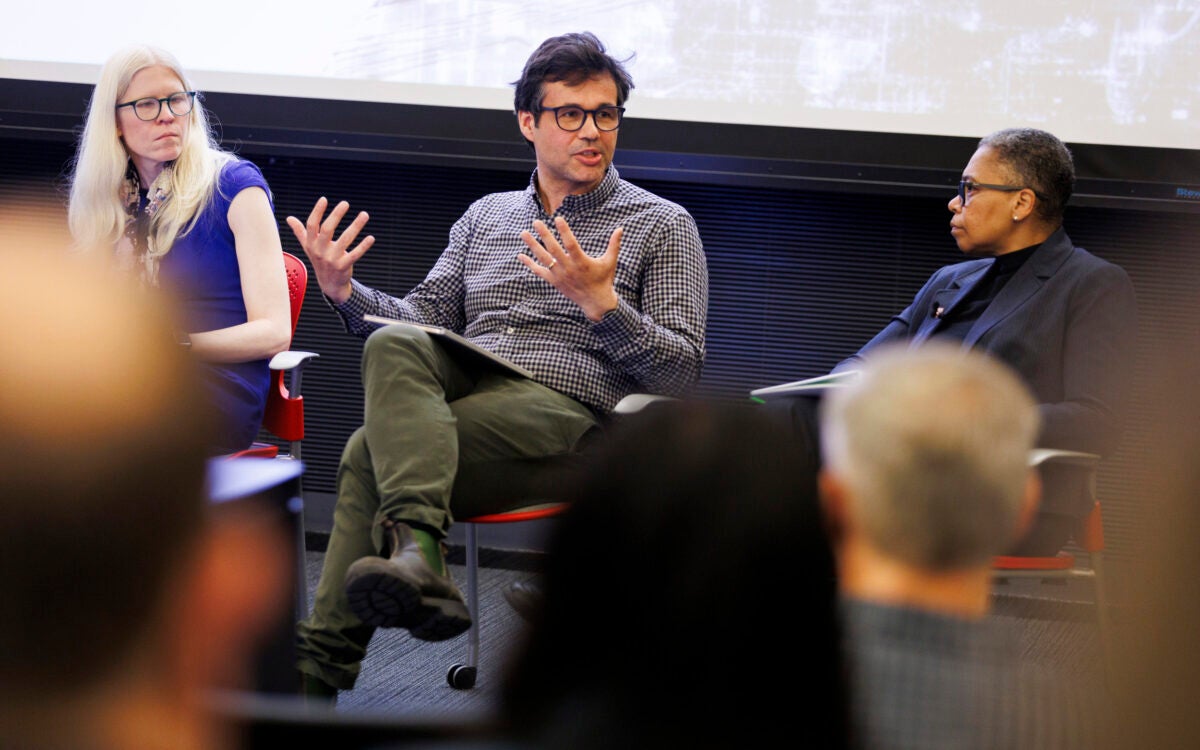
What is ‘original scholarship’ in the age of AI?
Symposium considers how technology is changing academia

Complex questions, innovative approaches
Seven projects awarded Star-Friedman Challenge grants
All Science & Tech
Early warning sign of extinction.
Fossil record stretching millions of years shows tiny ocean creatures on the move before Earth heats up
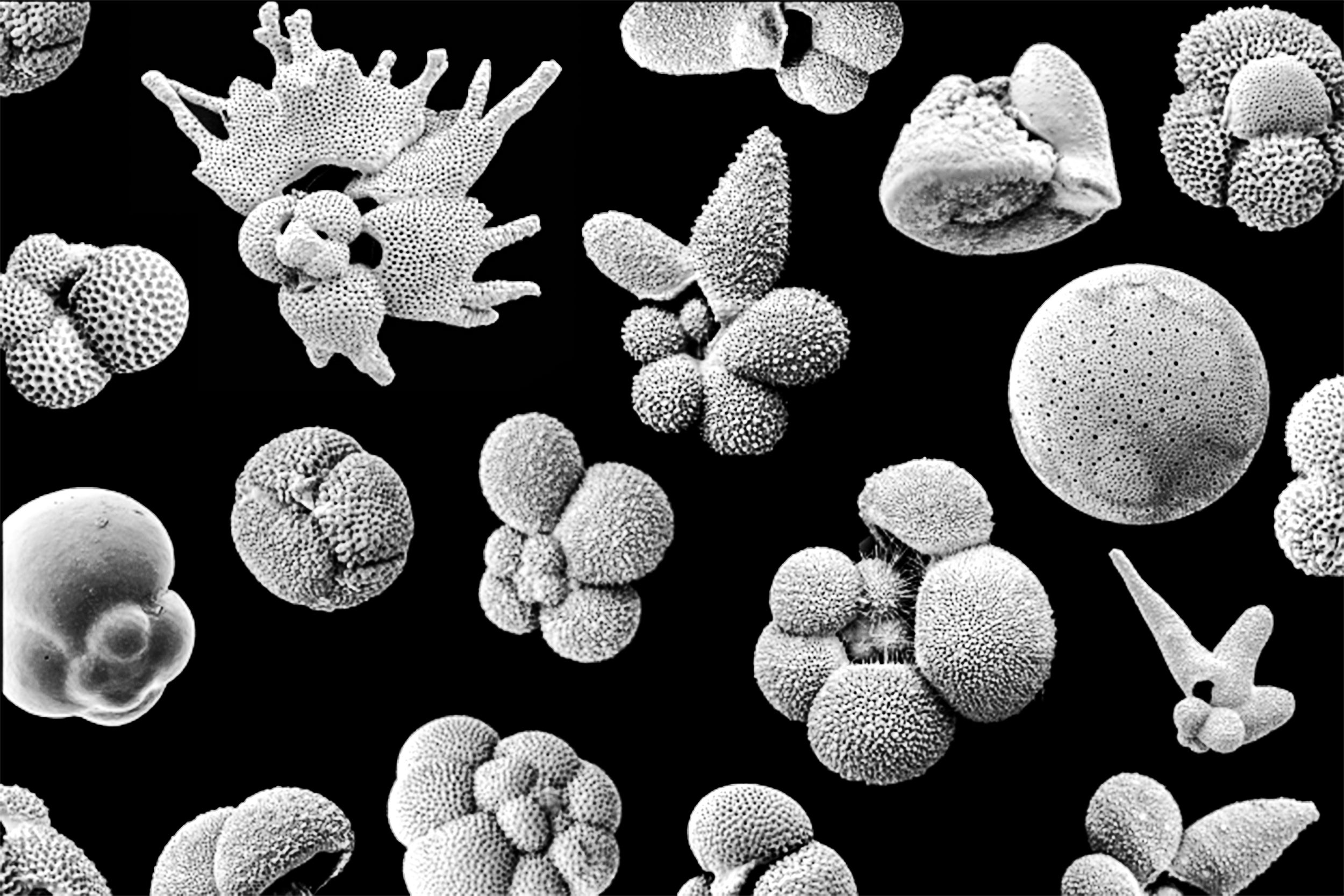
So much for summers of love
Despite ‘hippie’ reputation, male bonobos fight three times as often as chimps, study finds

Are you a human? Select all that apply.
Philosopher Barba-Kay on CAPTCHA dilemma, Aristotle’s good life, and how the internet is changing us — not for the better
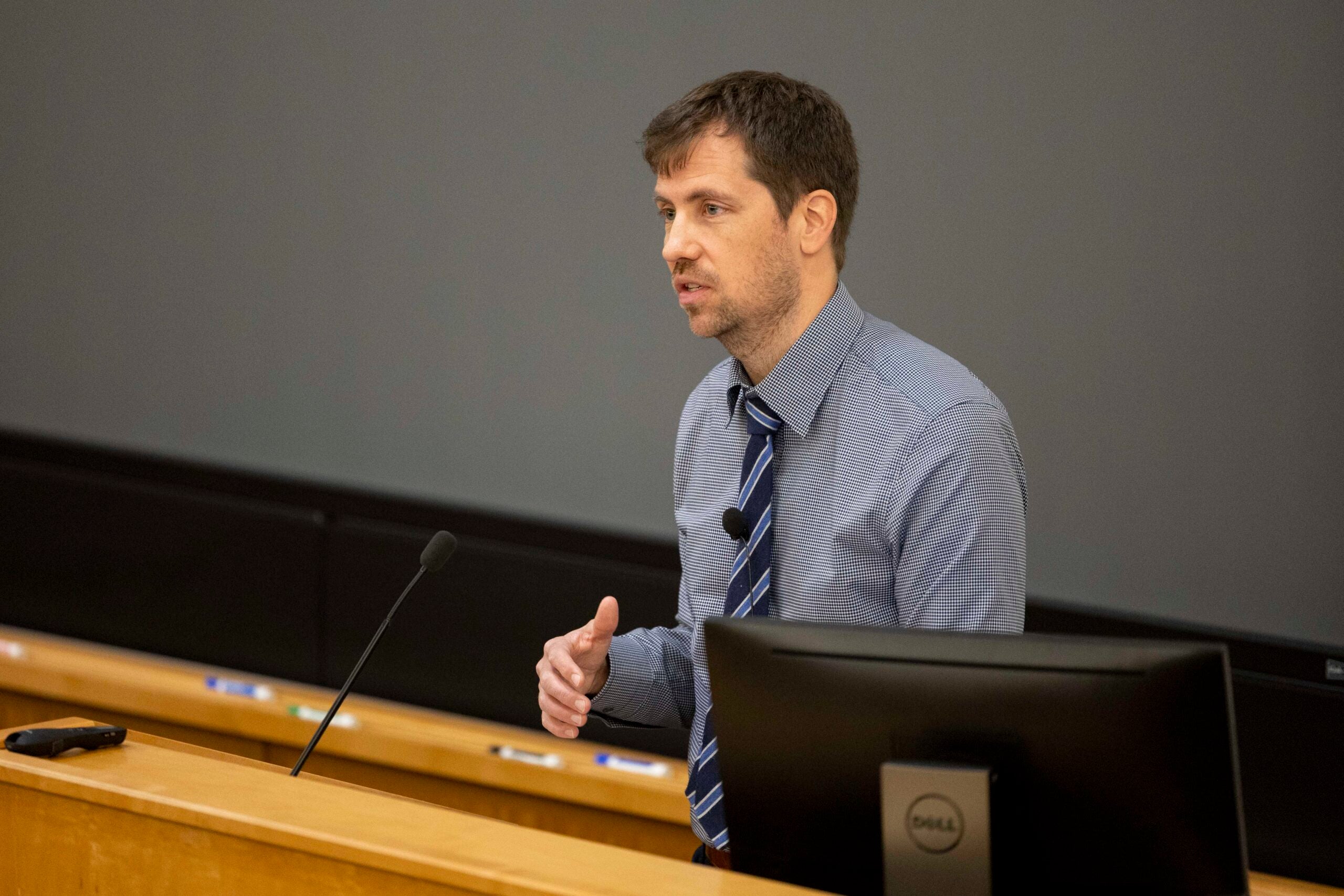
Amazon butterfly evolved from hybrids
Genomic findings challenge thinking on what makes a species

Is AI friend or foe? Wrong question.
A lawyer, a computer scientist, and a statistician debate ethics of artificial intelligence

Getting ahead of dyslexia
Harvard lab’s research suggests at-risk kids can be identified before they ever struggle in school
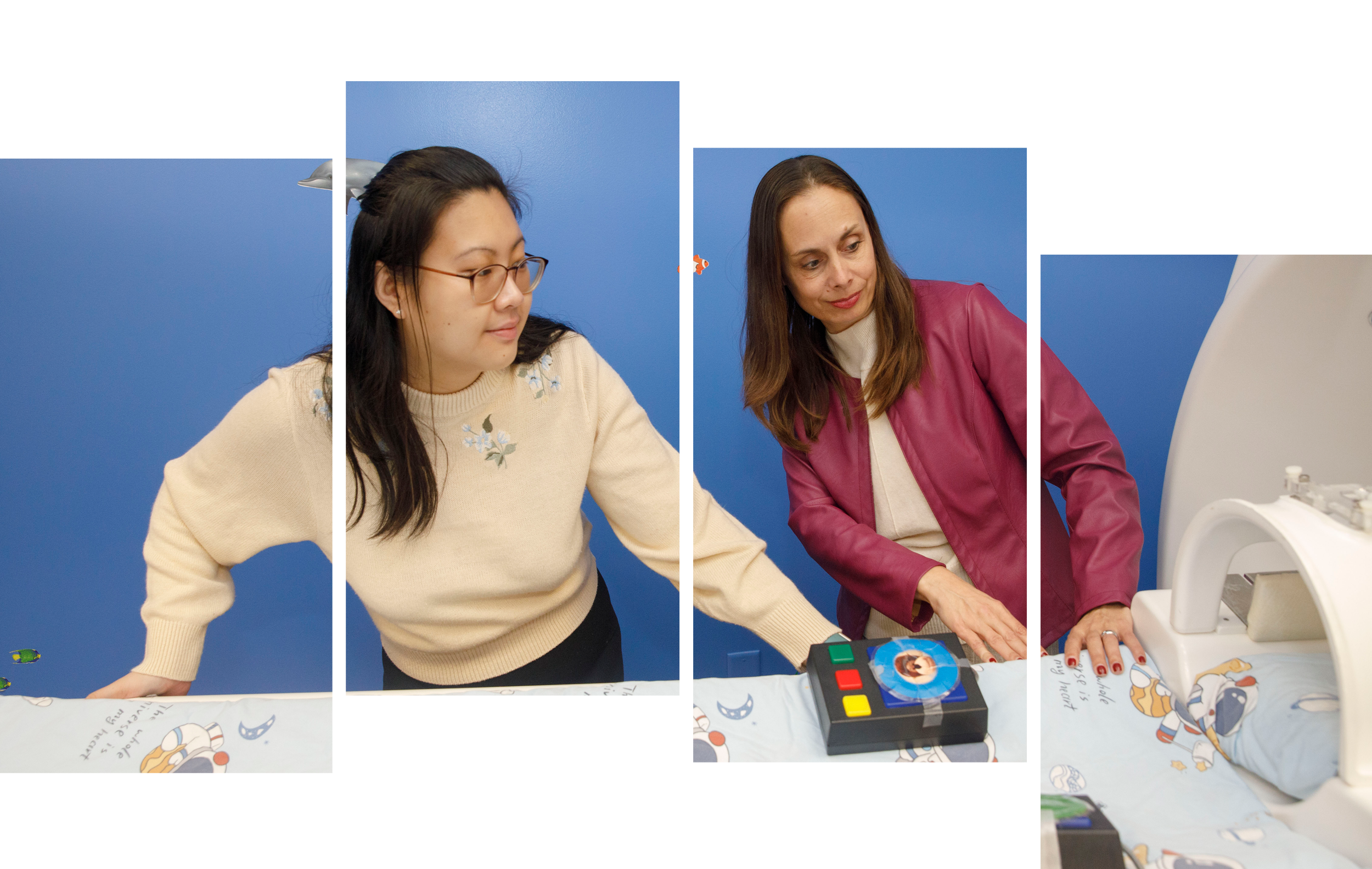
Why AI fairness conversations must include disabled people
Tech offers promise to help yet too often perpetuates ableism, say researchers. It doesn’t have to be this way.

How did you get that frog to float?
Ever-creative, Nobel laureate in physics Andre Geim extols fun, fanciful side of very serious science

Lifting a few with my chatbot
Sociologist Sherry Turkle warns against growing trend of turning to AI for companionship, counsel

Hate mosquitoes? Who doesn’t? But maybe we shouldn’t.
Entomologist says there is much scientists don’t know about habitats, habits, impacts on their environments

Climate alignment is no easy task
Experts at the Salata Institute outline tensions between global and local priorities

A playbook for policy change
Leah Stokes turns a love for the wilderness into a commitment to help mitigate climate change

Under pressure
New tool for precise measurement of superconductors

Glimpse into how mind may affect healing
Study finds bruising fades faster in patients who are led to believe more time has passed than actually has

Herbaria’s use and importance grows with climate change
In race against extinction, new agreement supports Harvard’s work to analyze and digitize its medicinal plant collections

Harvard physicists create a new phase of matter
First demonstration of non-Abelian anyons in a quantum processor

Did fermented foods fuel brain growth?
Study puts fermentation, not fire, as pivot point behind our ancestors’ increasing cranial capacity

‘Radcliffe Wave’ is waving
Astronomers detail oscillation of our giant neighbor

Aramont Fellows bring cutting-edge scientific innovation to the forefront
Four groundbreaking projects investigate brain development, capture raw data with AI, innovate quantum computers, and develop new models to map supernovas

Deep in the Amazon, SEAS team tracks a mobile element
Field work on the Rio Negro could help communities exposed to methylmercury protect their food web

The miracle of ‘dog’
New findings illuminate complex neuroscience behind even the simplest words, with implications for treatment of speech, language disorders

A fast pivot into the unknown
AI’s rapid rise prompts Harvard/MIT Symposium exploring excitement, potential challenges to STEM education, research

An evolutionary clue, curled up and long unstudied, in a Harvard museum
Trilobites’ soft undersides show mechanics of early ‘enrollment’ defense
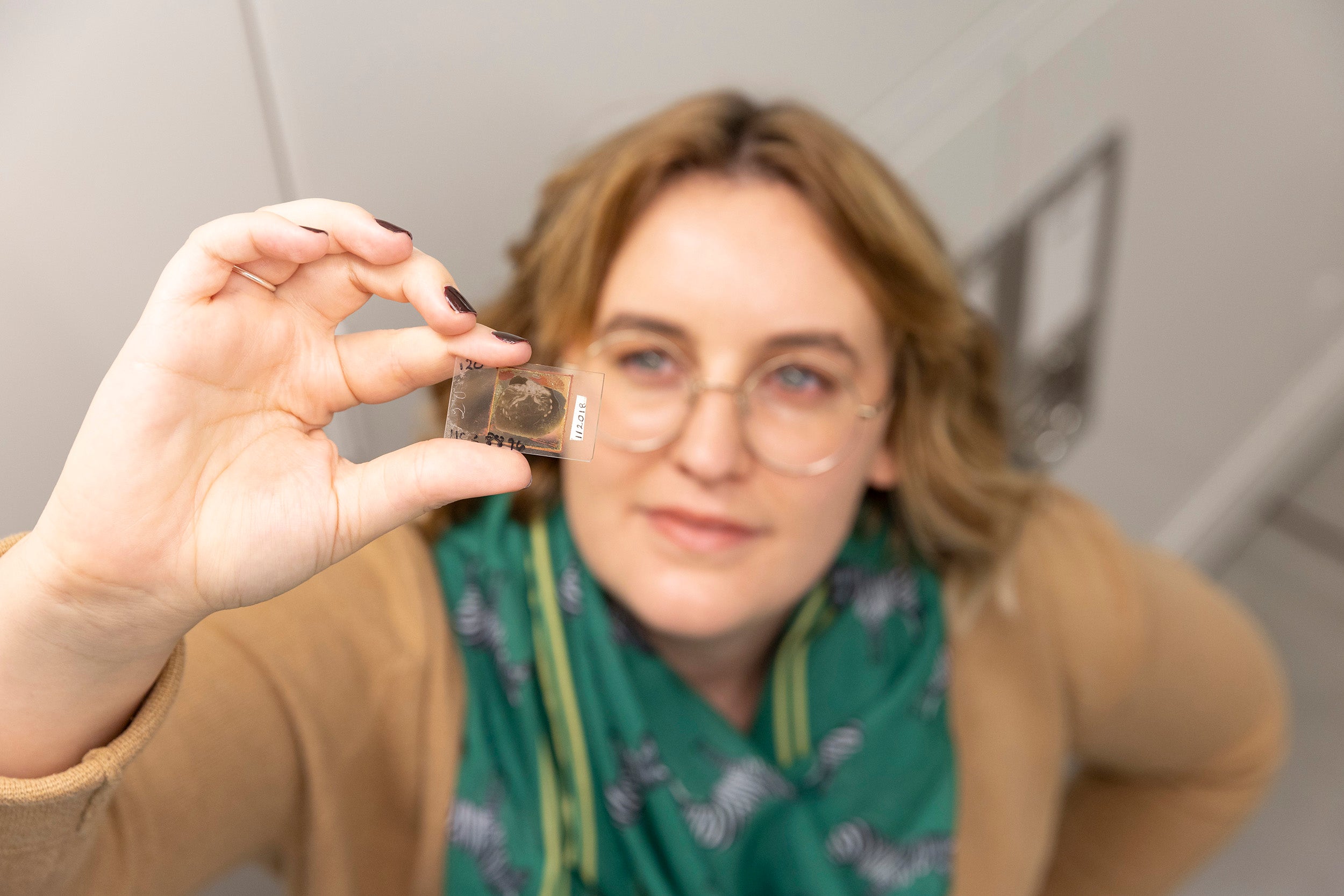
Bird’s-eye view of energy conservation
Physics of V-shaped flight formations offer insights into how to improve efficiency of groups of drones, underwater vehicles
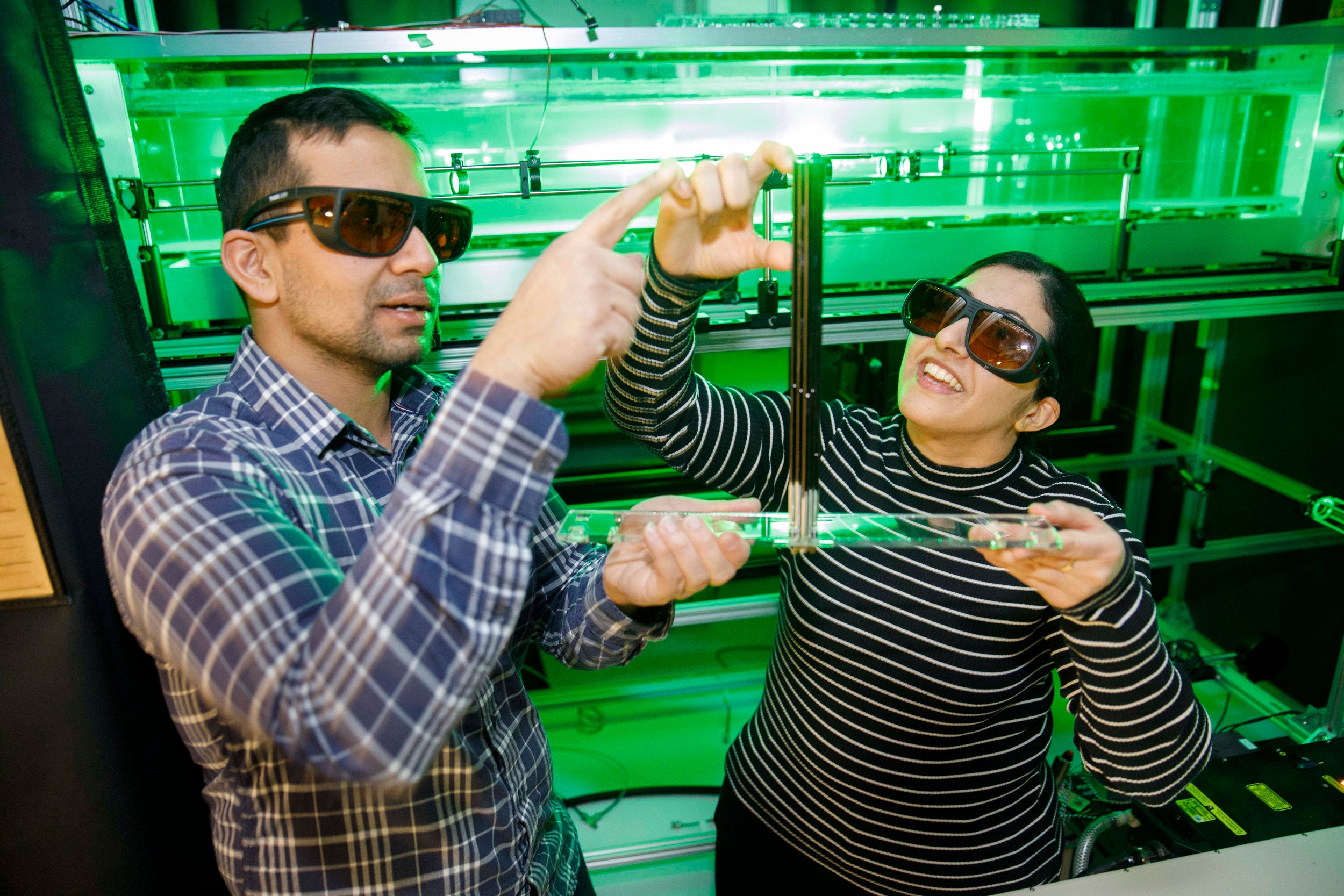
Why do some kids learn to talk earlier than others?
Global study by new faculty Elika Bergelson finds three key predictors of language development. They may surprise you.

You did it of your own free will? No such thing.
Neuroscientist Robert Sapolsky says every decision, action you make is result of chain of genes, biology, experience that preceded it

High-temperature superconductors with a twist
Fabrication method could facilitate materials discovery

Robotic exosuit gives Parkinson’s patient smoother stride
Eliminates gait freezing, a common and highly debilitating symptom
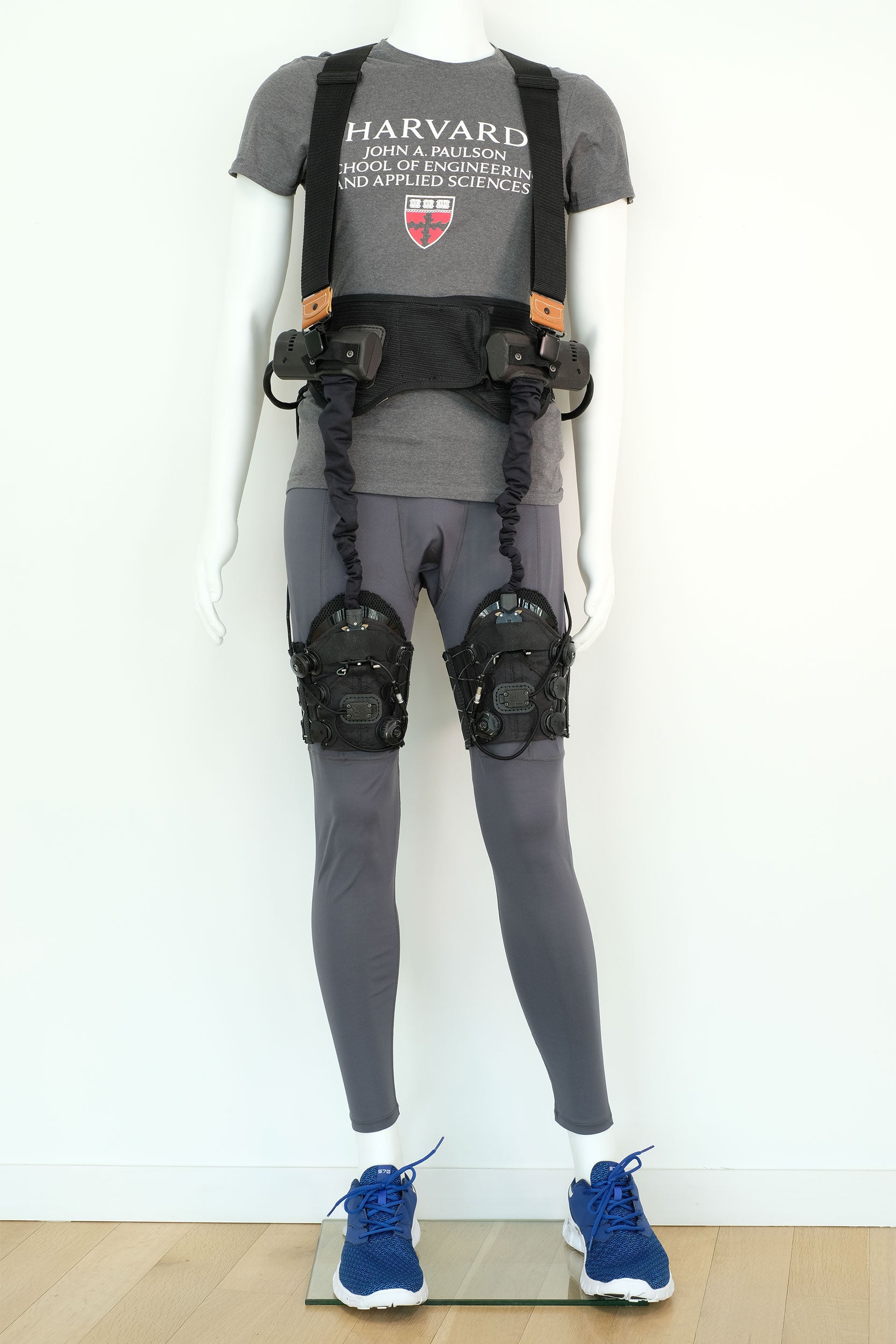
Demystifying a mammal’s brain, cell by cell
Harvard-led team helps create first molecular map for national neuroscience study
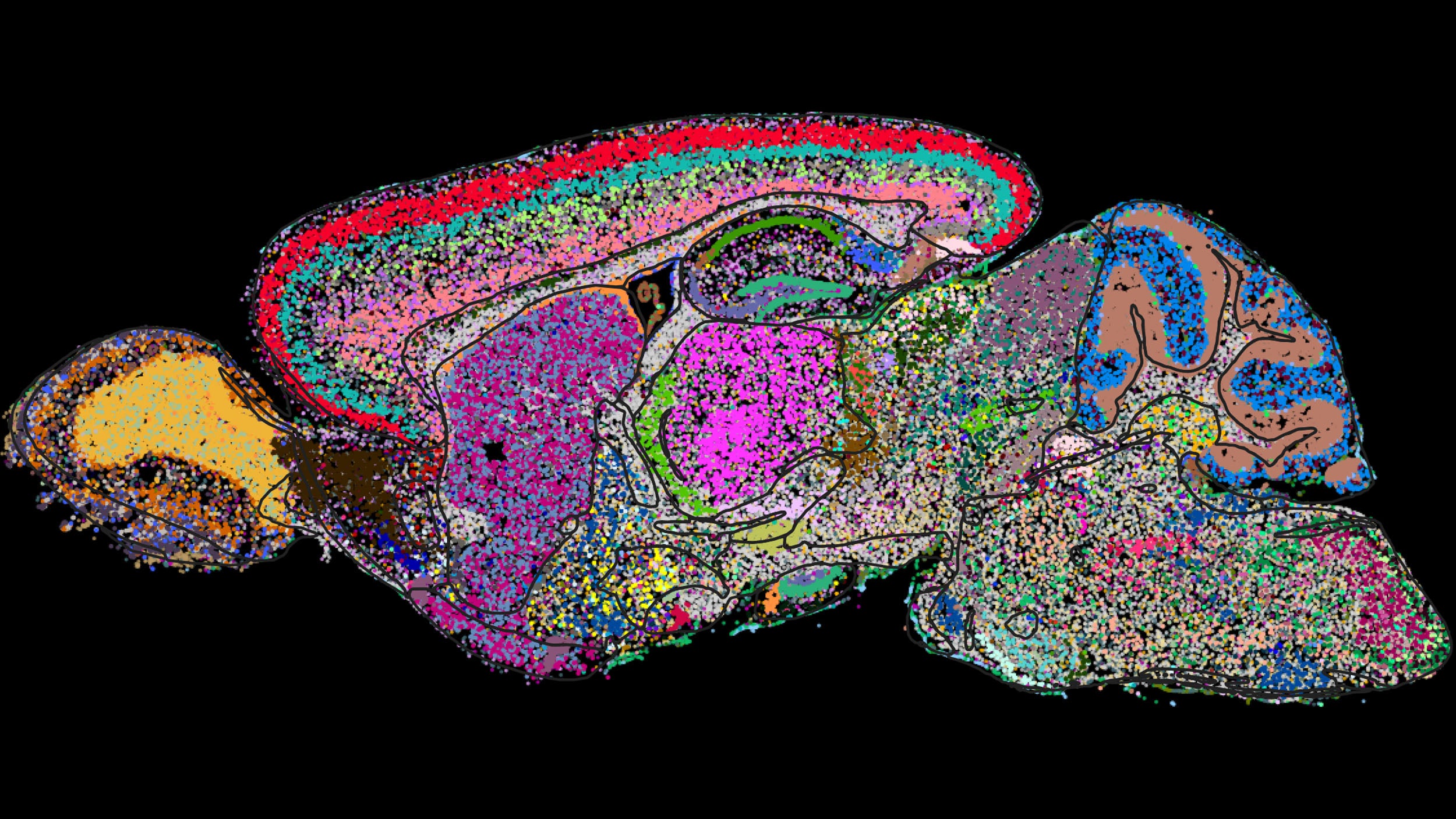
Researchers create first logical quantum processor
Key step toward reliable, game-changing quantum computing

How to Publish a Research Paper In High School: 18 Journals and Conferences to Consider

By Alex Yang
Graduate student at Southern Methodist University
9 minute read
So you've been working super hard writing a research paper , and you’ve finally finished. Congrats! It’s a very impressive accolade already, but there’s a way to take it a level further. As we’ve talked about before in our Polygence blog, “ Showcasing your work and sharing it with the world is the intellectual version of ‘pics or it didn’t happen.’ ” Of course, there are lot of different ways to showcase your work , from creating a Youtube video to making a podcast. But one of the most popular ways to showcase your research is to publish your research. Publishing your research can take the great work you’ve already done and add credibility to it, and will make a stronger impression than unpublished research. Further, the process of having your work reviewed by advanced degree researchers can be a valuable experience in itself. You can receive feedback from experts and learn how to improve upon the work you’ve already done.
Before we dive into the various journals and conferences to publish your work, let’s distinguish between the various publishing options that you have as a high schooler, as there are some nuances. Quick disclaimer: this article focuses on journals and conferences as ways to showcase your work. There are also competitions where you can submit your work, and we have written guides on competing in premier competitions like Regeneron STS and competing in Regeneron ISEF .
Publishing Options for High School Students
Peer-reviewed journals.
This is rather self-explanatory, but these journals go through the peer review process, where author(s) submit their work to the journal, and the journal's editors send the work to a group of independent experts (typically grad students or other scientists with advanced degrees) in the same field or discipline. These experts are peer reviewers, who evaluate the work based on a set of predetermined criteria, including the quality of the research, the validity of the methodology, the accuracy of the data, and the originality of the findings. The peer reviewers may suggest revisions or leave comments, but ultimately the editors will decide which suggestions to give to the student.
Once you’ve received suggestions, you have the opportunity to make revisions before submitting your final product back to the journal. The editor then decides whether or not your work is published.
Non-Peer-Reviewed Journals
These are just journals that do not undergo a review process. In general, peer-reviewed journals may be seen as more credible and prestigious. However, non-peer-reviewed journals may make it easier and faster to publish your work, which can be helpful if you are pressed for time and applying to colleges soon .
Pre Print Archives
Preprint archives or servers are online repositories where student researchers can upload and share their research papers without undergoing any review process. Preprints allow students to share their findings quickly and get feedback from the scientific community, which can help improve the research while you’re waiting to hear back from journals, which typically have longer timelines and can take up to several months to publish research. Sharing your work in a preprint archive does not prohibit you from, or interfere with submitting the same work to a journal afterwards.
Research Conferences
Prefer to present your research in a presentation or verbal format? Conferences can be a great way to “publish” your research, showcase your public speaking skills, speak directly to your audience, and network with other researchers in your field.
Student-led Journals vs Graduate Student / Professor-led Journals
Some student-led journals may have peer-review, but the actual people peer-reviewing your work may be high school students. Other journals will have graduate students, PhD students, or even faculty reviewing your work. As you can imagine, there are tradeoffs to either option. With an advanced degree student reviewing your work, you can likely expect better and more accurate feedback. Plus, it’s cool to have an expert look over your work! However, this may also mean that the journal is more selective, whereas student-led journals may be easier to publish in. Nonetheless, getting feedback from anyone who’s knowledgeable can be a great way to polish your research and writing.
Strategy for Submitting to Multiple Journals
Ultimately, your paper can only be published in one peer-reviewed journal. Submitting the same paper to multiple peer-reviewed journals at the same time is not allowed, and doing so may impact its publication at any peer-reviewed journal. If your work is not accepted at one journal, however, then you are free to submit that work to your next choice and so on. Therefore, it is best to submit to journals with a strategy in mind. Consider: what journal do I ideally want to be published in? What are some back-ups if I don’t get published in my ideal journal? Preprints, like arXiv and the Research Archive of Rising Scholars, are possible places to submit your work in advance of seeking peer-reviewed publication. These are places to “stake your claim” in a research area and get feedback from the community prior to submitting your paper to its final home in a peer-reviewed journal. You can submit your work to a preprint prior to submitting at a peer-reviewed journal. However, bioRxiv, a reputable preprint server, recommends on their website that a preprint only be posted on one server, so that’s something to keep in mind as well.
Citation and Paper Formats
All of the journals listed below have specific ways that they’d like you to cite your sources, varying from styles like MLA to APA, and it’s important that you double-check the journal’s requirements for citations, titling your paper, writing your abstract, etc. Most journal websites have very detailed guides for how they want you to format your paper, so follow those closely to avoid having to wait to hear back and then resubmit your paper. If you’re looking for more guidance on citations and bibliographies check out our blog post!
18 Journals and Conferences to Publish Your Research as a High Schooler
Now that we’ve distinguished the differences between certain journals and conferences, let’s jump into some of our favorite ones. We’ve divided up our selections based on prestige and reliability, and we’ve made these selections using our experience with helping Polygence students showcase their research .
Most Prestigious Journals
Concord review.
Cost: $70 to Submit and $200 Publication Cost (if accepted)
Deadline: Fixed Deadlines in Feb 1 (Summer Issue), May 1 (Fall), August 1 (Winter), and November 1 (Spring)
Subject area: History / Social Sciences
Type of research: All types of academic articles
The Concord Review is a quarterly journal that publishes exceptional essays written by high school students on historical topics. The journal has been around since 1987 and has a great reputation, with many student winners going to great universities. Further, if your paper is published, your essays will be sent to subscribers and teachers all around the world, which is an incredible achievement.
Papers submitted tend to be around 8,000 words, so there is definitely a lot of writing involved, and the Concord Review themselves say that they are very selective, publishing only about 5% of the essays they receive.
We’ve posted our complete guide on publishing in the Concord Review here.
Journal of Emerging Investigators (JEI)
Deadline: Rolling
Subject area: STEM
Type of research: Original hypothesis-driven scientific research
JEI is an open-access publication that features scientific research papers written by middle and high school students in the fields of biological and physical sciences. The journal includes a comprehensive peer-review process, where graduate students and other professional scientists with advanced degrees will review the manuscripts and provide suggestions to improve both the project and manuscript itself. You can expect to receive feedback in 6-8 weeks.
This should be the go-to option for students that are doing hypothesis-driven, original research or research that involves original analyses of existing data (meta-analysis, analyzing publicly available datasets, etc.). This is not an appropriate fit for students writing literature reviews. Finally, a mentor or parent must submit on behalf of the student.
We’ve had many Polygence students successfully submit to JEI. Check out Hana’s research on invasive species and their effects in drought times.
STEM Fellowship Journal (SFJ)
Cost: $400 publication fee
Subject area: All Scientific Disciplines
Type of research: Conference Proceedings, Review Articles, Viewpoint Articles, Original Research
SFJ is a peer-reviewed journal published by Canadian Science Publishing that serves as a platform for scholarly research conducted by high school and university students in the STEM fields. Peer review is conducted by undergraduate, graduate student, and professional reviewers.
Depending on the kind of research article you choose to submit, SFJ provides very specific guidelines on what to include and word limits.
Other Great Journal Options
National high school journal of science (nhsjs).
Cost: $250 for publication
Deadline: Rolling
Subject area: All science disciplines
Type of research: Original research, literature review
NHSJS is a journal peer reviewed by high schoolers from around the world, with an advisory board of adult academics. Topics are STEM related, and submission types can vary from original research papers to shorter articles.
Curieux Academic Journal
Cost: $185-215
Subject area: Engineering, Humanities, and Natural Science, Mathematics, and Social Science
Type of research: Including but not limited to research papers, review articles, and humanity/social science pieces.
Curieux Academic Journal is a non-profit run by students and was founded in 2017 to publish outstanding research by high school and middle school students. Curieux publishes one issue per month (twelve per year), so there are many opportunities to get your research published.
The Young Scientists Journal
Deadline: December
Subject area: Sciences
Type of research: Original research, literature review, blog post
The Young Scientists Journal , while a popular option for students previously, has paused submissions to process a backlog. The journal is an international peer-reviewed journal run by students, and creates print issues twice a year.
The journal has also been around for a decade and has a clear track record of producing alumni who go on to work in STEM.
Here’s an example of research submitted by Polygence student Ryan to the journal.
Journal of Research High School (JRHS)
Subject area: Any academic subject including the sciences and humanities
Type of research: Original research and significant literature reviews.
JRHS is an online research journal edited by volunteer professional scientists, researchers, teachers, and professors. JRHS accepts original research and significant literature reviews in Engineering, Humanities, Natural Science, Math, and Social Sciences.
From our experience working with our students to help publish their research, this journal is currently operating with a 15-20 week turnaround time for review. This is a bit on the longer side, so be mindful of this turnaround time if you’re looking to get your work published soon.
Youth Medical Journal
Deadline: March (currently closed)
Subject area: Medical or scientific topics
Type of research: Original research, review article, blog post, magazine article
The Youth Medical Journal is an international, student-run team of 40 students looking to share medical research.
We’ve found that this journal is a good entry point for students new to research papers, but when submissions are busy, in the past they have paused submissions.
Journal of High School Science (JHSS)
Subject area: All topics
Type of research: Original research, literature review, technical notes, opinion pieces
This peer-reviewed STEAM journal publishes quarterly, with advanced degree doctors who sit on the journal’s editorial board. In addition to typical STEM subjects, the journal also accepts manuscripts related to music and theater, which is explicitly stated on their website.
Due to the current large volume of submissions, the review process takes a minimum of 4 weeks from the time of submission.
Whitman Journal of Psychology
Subject area: Psychology
Type of research: Original research, podcasts
The WWJOP is a publication run entirely by students, where research and literature reviews in the field of psychology are recognized. The journal is run out of a high school with a teacher supervisor and student staff.
The WWJOP uniquely also accepts podcast submissions, so if that’s your preferred format for showcasing your work, then this could be the journal for you!
Cost: $180 submission fee
Subject area: Humanities
Type of research: Essay submission
The Schola is a peer-reviewed quarterly journal that showcases essays on various humanities and social sciences topics authored by high school students worldwide. They feature a diverse range of subjects such as philosophy, history, art history, English, economics, public policy, and sociology.
Editors at Schola are academics who teach and do research in the humanities and social sciences
Critical Debates in Humanities, Science and Global Justice
Cost: $10 author fee
Subject area: Ethics and frontiers of science, Biology and ecosystems, Technology and Innovation, Medical research and disease, Peace and civil society, Global citizenship, identity and democracy, Structural violence and society, Psychology, Education, AI, Sociology, Computer Science, Neuroscience, Cultural politics, Politics and Justice, Computer science and math as related to policy, Public policy, Human rights, Language, Identity and Culture, Art and activism
Critical Debates is an international academic journal for critical discourse in humanities, science and contemporary global issues for emerging young scholars
International Youth Neuroscience Association Journal
Subject area: Neuroscience
Type of research: Research papers
Although this student peer-reviewed journal is not currently accepting submissions, we’ve had students recently publish here.
Here’s an example of Nevenka’s research that was published in the November 2022 issue of the journal.
Preprint Archives to Share Your Work In
Subject area: STEM, Quantitative Finance, Economics
arXiv is an open access archive supported by Cornell University, where more than 2 million scholarly articles in a wide variety of topics have been compiled. arXiv articles are not peer-reviewed, so you will not receive any feedback on your work from experts. However, your article does go through a moderation process where your work is classified into a topic area and checked for scholarly value. This process is rather quick however and according to arXiv you can expect your article to be available on the website in about 6 hours.
Although there’s no peer review process, that means the submission standards are not as rigorous and you can get your article posted very quickly, so submitting to arXiv or other preprint archives can be something you do before trying to get published in a journal.
One slight inconvenience of submitting to arXiv is that you must be endorsed by a current arXiv author, which can typically be a mentor or teacher or professor that you have. Here’s an example of a Polygence student submitting their work to arXiv, with Albert’s research on Hamiltonian Cycles.
Subject area: Biology
Type of research: Original research
bioRxiv is a preprint server for biology research, where again the research is not peer-reviewed but undergoes a check to make sure that the material is relevant and appropriate.
bioRxiv has a bit of a longer posting time, taking around 48 hours, but that’s still very quick. bioRxiv also allows for you to submit revised versions of your research if you decide to make changes.
Research Archive of Rising Scholars (RARS)
Subject area: STEM and Humanities
Type of research: Original research, review articles, poems, short stories, scripts
Research Archive of Rising Scholars is Polygence’s own preprint server! We were inspired by arXiv so we created a repository for articles and other creative submissions in STEM and the Humanities.
We launched RARS in 2022 and we’re excited to offer a space for budding scholars as they look to publish their work in journals. Compared to other preprint archives, RARS also accepts a wider range of submission types, including poems, short stories, and scripts.
Conferences to Participate In
Symposium of rising scholars.
Deadline: Twice a year - February and July
Polygence’s very own Symposium of Rising Scholars is a bi-annual academic conference where students present and share their research with their peers and experts. The Symposium also includes a College Admissions Panel and Keynote Speech. In our 8th edition of the Symposium this past March, we had 60 students presenting live, approximately 70 students presenting asynchronously, and over 100 audience members. The keynote speaker was Chang-rae Lee, award-winning novelist and professor at Stanford University.
We’re looking to have our 9th Symposium in Fall of 2023, and you can express your interest now. If you’re interested to see what our Polygence scholars have presented in the past for the Symposium, you can check out their scholar pages here.
Junior Science and Humanities Symposium (JSHS)
Deadline: Typically in November, so for 2024’s competition look to submit in Fall 2023
Subject area: STEM topics
JSHS is a Department of Defense sponsored program and competition that consists of first submitting a written report of your research. If your submission is selected, you’ll be able to participate in the regional symposium, where you can present in oral format or poster format. A select group from the regional symposium will then qualify for the national symposium.
One of the great things about JSHS compared to the journals mentioned above is that you’re allowed to work in teams and you don’t have to be a solo author. This can make the experience more fun for you and your teammates, and allow you to combine your strengths for your submission.
Related Content:
Top 8 Business Journals to Publish Your Research
Why Teens Should Attend the National Student Leadership Conference (NSLC)
How to Brainstorm Your Way to Perfect Research Topic Ideas
Top 20 Most Competitive Summer Programs for High School Students
Research Opportunities for High School Students
Want to start a project of your own?
Click below to get matched with one of our expert mentors who can help take your project off the ground!

IMAGES
VIDEO
COMMENTS
Read the benefits of medical research topics for high school students. 1. Develops Critical Thinking Skills. As we all know, doing medical research helps improve students' critical thinking. They learn to make ideas, design experiments, survey data, think logically, solve problems, and draw conclusions from evidence.
Since 2020, COVID-19 has been a hot-button topic in medicine, along with the long-term symptoms in those with a history of COVID-19. Examples of COVID-19-related research topics worth exploring include: The long-term impact of COVID-19 on cardiac and respiratory health. COVID-19 vaccination rates.
Medical Research Topics for High School. For students who want to investigate different aspect of healthcare, we provided these examples of ideas. Browse through these medical research topics for high school students to spot the most relevant theme: How does the human immune system work? Vaccinations as an essential tool in preventing diseases.
Top 10 Medical Summer Research Opportunities for High School Students. Passion Project Ideas for High School Students in 2024. Publishing Your Research as a High Schooler: 20 Journals and Conferences to Consider. Research Opportunities for High School Students in 2024: More Than 50 Options Across Multiple Academic Disciplines and Interests
22 Paramedic Research Paper Topics. 23 Surgery Research Topics. 24 Radiology Research Paper Topics. 25 Anatomy and Physiology Research Paper Topics. 26 Healthcare Management Research Paper Topics. 27 Medical Ethics Research Paper Topics. 28 Conclusion. In such a complex and broad field as medicine, writing an original and compelling research ...
Researchable Medical Research Topics Examples. Discuss the medical implications of male circumcision. The impact of political action on the effectiveness of health care systems. The role of international collaborations in improving medical care. Evaluate the challenges faced in the regulation of biomedical research.
Finding and choosing a strong research topic is the critical first step when it comes to crafting a high-quality dissertation, thesis or research project. If you've landed on this post, chances are you're looking for a healthcare-related research topic, but aren't sure where to start. Here, we'll explore a variety of healthcare-related research ideas and topic thought-starters across a ...
These 15 medical research opportunities for high school students provide a wide range of experiences, from summer internships to year-long programs, and cover a variety of areas within the medical field, such as cancer research, public health, and biotechnology. By participating in these programs, high school students can gain hands-on research ...
The American Medical Association offers a wide range of resources and programs to get you started and thriving in research, gaining valuable hands-on experience you can build on throughout your career. With an AMA membership, medical students can take advantage of these opportunities: Research Challenge. Participate in the largest national ...
Below are some excellent publications that accept medical and science research submissions from high school students. 1. Youth Medical Journal. The Youth Medical Journal is an international, student-run team of 40 students looking to share medical research. We've found that this journal is a good entry point for students new to research papers.
Cost: Free. Program Date: June 10 - August 1, 2024. Application Deadline: February 24, 2024. Eligibility: High school juniors and seniors. The Stanford Institutes of Medicine Summer Research Program (SIMR) is an eight-week summer internship designed for high school juniors and seniors interested in biomedical research.
Explore Our Science Videos. Explore the cutting-edge field of medical biotechnology with one of these science experiments. Investigate medicines, diagnostics, and genetic engineering. Explore classic and cutting-edge high school science experiments in this collection of top-quality science investigations.
Students receive a stipend of $1,500 with preference given to students from Nebraska and surrounding areas. up to 10 weeks. Medical Laboratory Sciences Summer Immersion Program. University of Texas Medical Branch. Galveston, TX. No cost. 1 week. Summer Fellowship Program in Biomedical Research. Wistar Institute.
Here are 10 Medical Research Opportunities for High School Students: 1. Stanford Institutes of Medicine Summer Research Program. Students at SIMR collaborate with Stanford faculty and researchers to conduct medical research. Students select one of eight study fields and are then allocated to a lab where they will be mentored one-on-one.
4. PubMed- The PubMed website, NLM's most well-known product, is a database of indexed citations and abstracts to medical, nursing, dental, veterinary, health care and preclinical sciences journal articles. PubMed is an excellent resource for high school students to locate articles for research about medical topics, especially if they are ...
3. Cambridge Medicine Journal. This student-run, peer-reviewed, open-access journal welcomes all submissions from a research project by a graduate student to a pre-college program paper by a high school junior. Based in the UK, it has an editorial board composed of college students from around the world.
For example, last year over 4000 students applied for 500 spots in the Lumiere Research Scholar Program, a rigorous research program founded by Harvard researchers. The program pairs high-school students with Ph.D. mentors to work 1-on-1 on an independent research project .
Medical research is of high value to clinicians and society. In modern-day practice, the continued growth of knowledge has added richness to the medical world and challenges medical professionals to stay afloat. ... Most students entering medical school are neither aware of how scientific research functions nor cognizant of its importance ...
The 24 participants in this program will each receive a $1,250 clinical research stipend. 2. Rady Children's Hospital-San Diego: Summer Medical Academy. Application Deadline: February 23. Duration: Two weeks (June 17-28 or July 8-19) Offered through Rady's Children Hospital San Diego, the Summer Medical Academy gives high school students ...
Here are five specific high school sociology research topics and how you can approach them: 61. Investigate the impact of social media algorithms on echo chambers and polarization in online communities. Social media shapes public discourse.
Students' research interests often evolve during undergraduate, graduate and postgraduate education. ... Recent high-profile examples include prokaryotic genomics that spawned CRISPR/Cas9-based ...
The American Medical Association offers a wide range of resources and programs to get you started and thriving in research, gaining valuable experience you can build on throughout your career. With an AMA membership, medical students can take advantage of these opportunities: Participate in the largest national, multi-specialty conference for ...
That creates a time-management challenge that isn't typical during medical school where students are often adhering to an external schedule. "In a research year, your time is pretty much yours, and you divvy it up however you see fit," she said. "So it's very easy to get off the schedule because you have to make it by yourself.".
Many BS/MD hopefuls pursue research as a way to build their resume. Numerous BS/MD programs like Rensselaer Polytechnic University, like to see students with extensive research experience. Its ...
As a high school student, this resource is perfect for staying informed about the latest developments in the world of biology. 2. The National High School Journal of Science. The National High School Journal of Science (NHSJS) provides a wealth of articles that delve into cutting-edge biological research topics.
The American Academy of Pediatrics (AAP) is dedicated to improving the health and well-being of children. Explore our comprehensive resources, evidence-based guidelines, and expert insights on pediatric care. Discover the latest research, educational materials, and advocacy initiatives aimed at promoting child health. Join the AAP community and access valuable tools, training, and networking ...
Aramont Fellows bring cutting-edge scientific innovation to the forefront. Four groundbreaking projects investigate brain development, capture raw data with AI, innovate quantum computers, and develop new models to map supernovas. February 6, 2024.
The Youth Medical Journal is an international, student-run team of 40 students looking to share medical research. We've found that this journal is a good entry point for students new to research papers, but when submissions are busy, in the past they have paused submissions. Journal of High School Science (JHSS) Cost: Free. Deadline: Rolling
The University of California, Los Angeles (UCLA) is a public land-grant research university in Los Angeles, California, United States.Its academic roots were established in 1881 as a normal school then known as the southern branch of the California State Normal School which later evolved into San José State University.The branch was transferred to the University of California to become the ...
View the latest news and breaking news today for U.S., world, weather, entertainment, politics and health at CNN.com.